
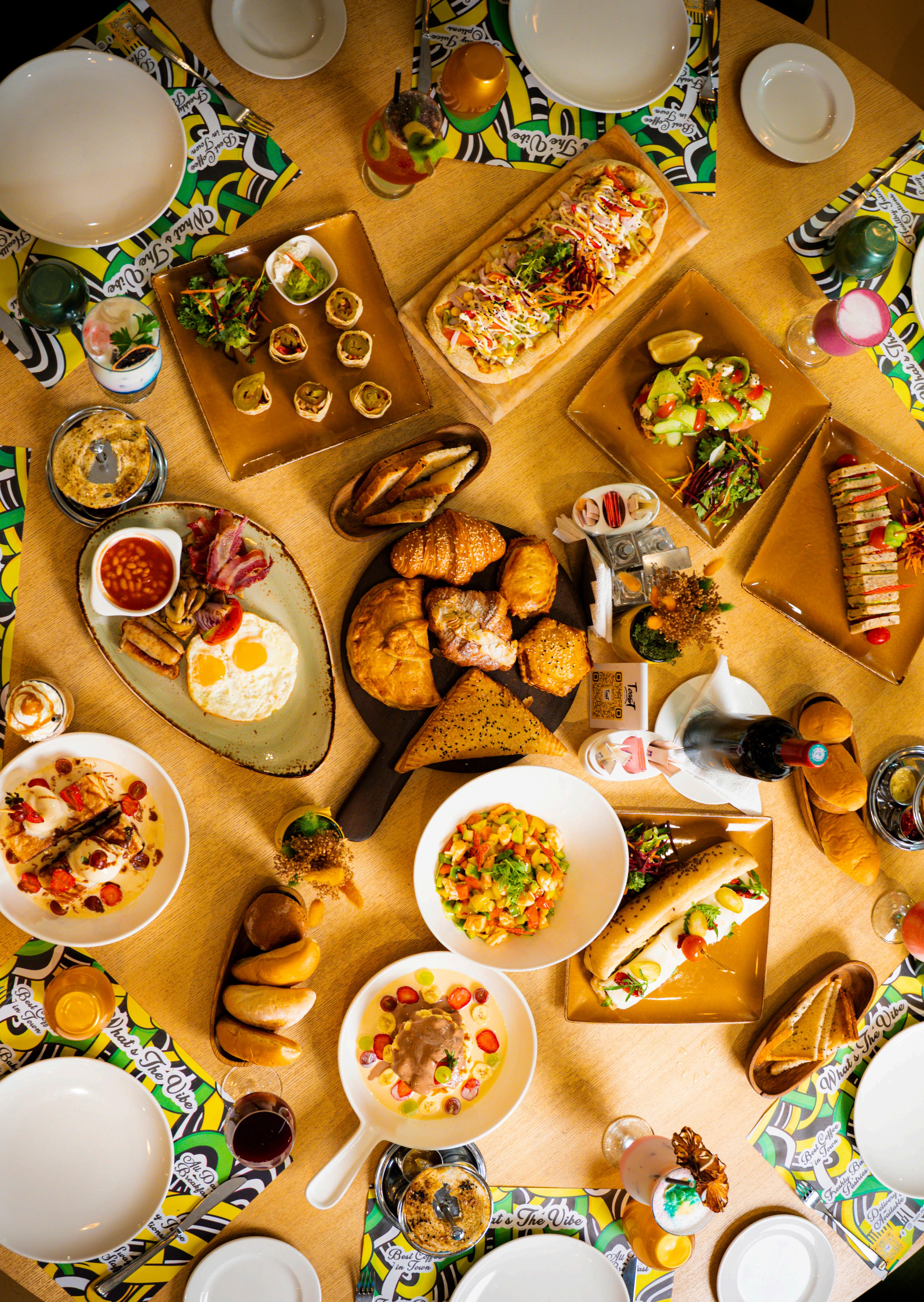



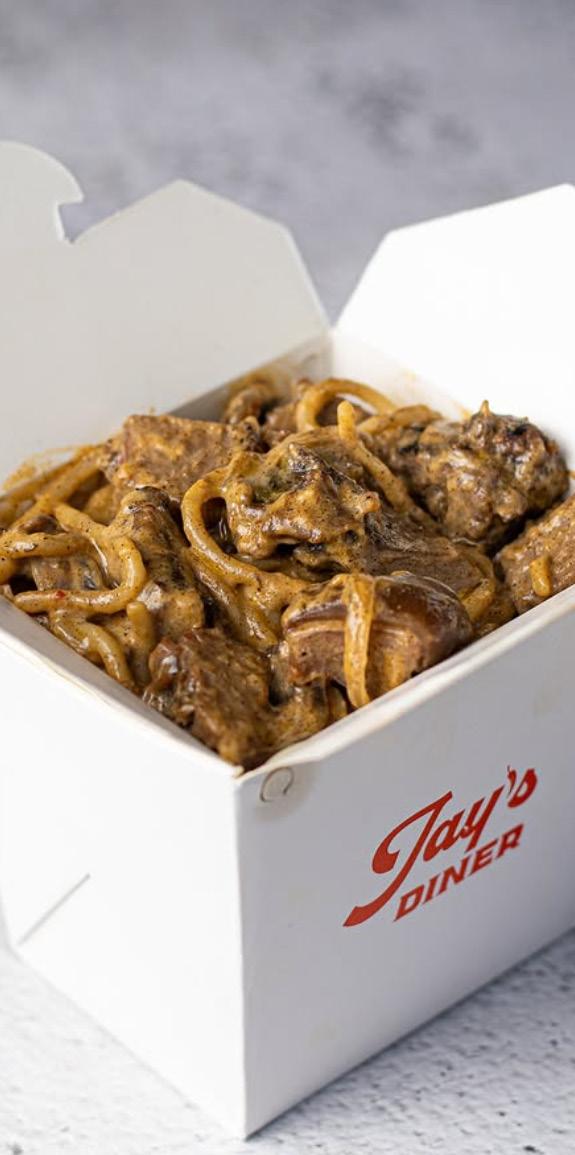
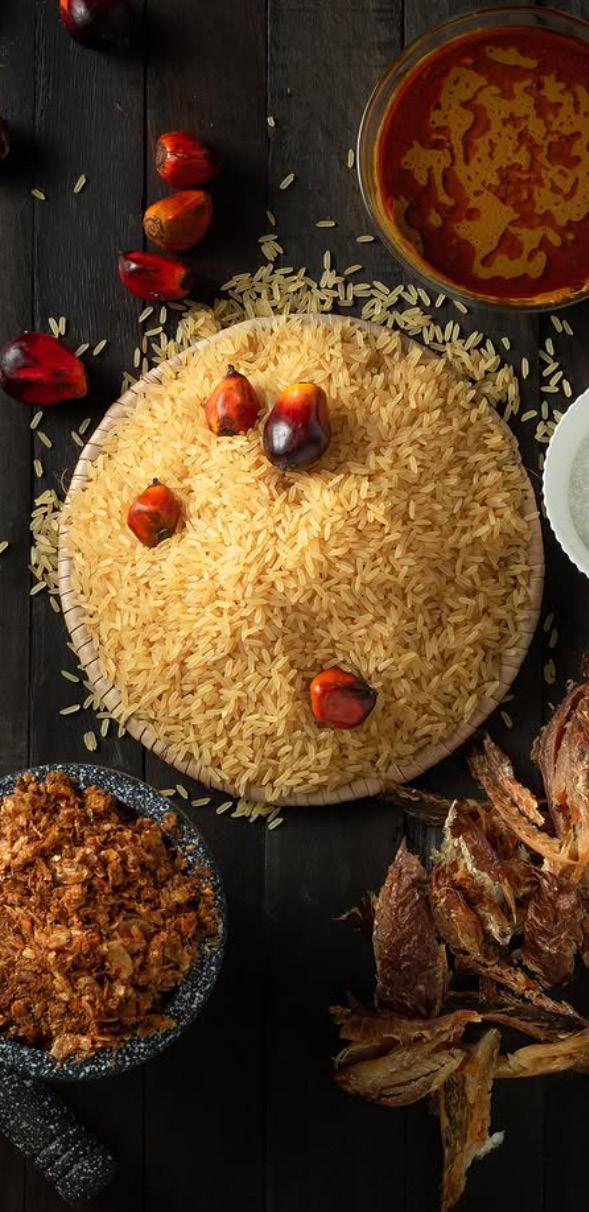
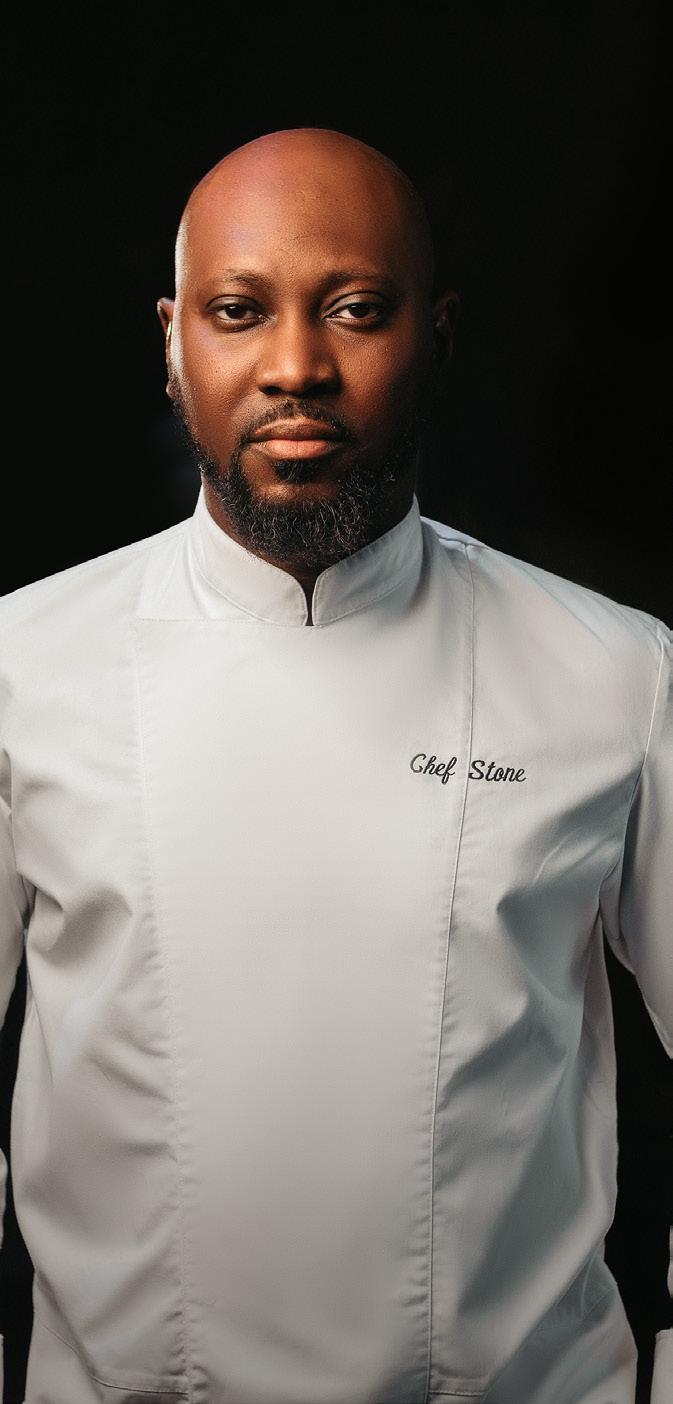
Editor’s Note
Featured Column: Secret Food List
LIL+ x Atarodo Mag
Interview Chef Britty
of the
Toast Restaurant
Interview Chef Gibbs
Relax!


Elvis Osifo Editor-in-Chief, Lost in Lagos Plus Magazine IG: @edo.wtf










Editor’s Note
Featured Column: Secret Food List
LIL+ x Atarodo Mag
Interview Chef Britty
of the
Toast Restaurant
Interview Chef Gibbs
Relax!


Elvis Osifo Editor-in-Chief, Lost in Lagos Plus Magazine IG: @edo.wtf

But yes, we are dedicating this issue to them.
Those who appreciate food and drinks as something more than mere sustenance. The ones who don’t just scroll past a recipe. The ones who bookmark, shop, and try. You’re the ones we had in mind while making this issue. But as we feast, let’s also get ready to feed the world. “Ounje Agbaye,” translating to “Global Food,” lets us know Nigerian and African cuisine is ready for the global stage.
Inside these pages, you’ll find a generous spread of recipes, drink pairings, guides, and culinary storytelling from chefs, mixologists, sommeliers, bartenders, and creators from our communities. Though ripe with flavour, our food and drinks scene is hungry for structure, standardisation, training, systems that last. We need to organise what we’ve already perfected, and build what doesn’t yet exist. We need pathways, not just platforms. We need policies, not just passion.
In this issue, we celebrate the real-time excellence happening across Nigeria’s food and drink industry, but also stir a deeper conversation: What would it take to become a major, deliberate, world-class contributor to global cuisine and drinks culture?
Chef Gibbs wants to see Nigerian cuisine on the global stage, pushing for standardization and recognition of its culinary practices, and Chef Stone envisions expanding culinary education globally. Chef Britty encourages future pastry chefs to be curious, challenge norms, and create with cultural grounding, while Chef Ridon, the youngest chef in the industry, wants his patisserie journey to be “Unforgettable.” Chef Feyikewa emphasizes the importance of connection and meaningful experiences through food, and Michael Williams believes Nigerian cuisine should be valued more. Judah Habila aims to build an honest, inclusive, and Nigerian-focused wine culture, and Chef Wu highlights underappreciated Nigerian ingredients like iru, egusi, and hibiscus. Check out our list of top Top 10 restaurants owned by Nigerian chefs globally, and our list of top 5 events in Nigeria.
We’re not far. But we need to get serious.
Dive in, jẹ ká jẹun
#DiscoverNigeria
#ExperienceNigeria
#LostinLagosPlus #LostinLagosPlusMagazine
LOST IN LAGOS 9.7 June 2025 Title: Ounje Agbaye (Global Food) FOUNDER Tannaz Bahnam PUBLISHED BY Knock Knock Lifestyle Solutions Ltd PRINTER Tee Digital Press EDITOR-IN-CHIEF Elvis Osifo EDITOR Pelumi Oyesanya DESIGN Ernest Igbes CONTRIBUTORS Elvis Osifo, Pelumi Oyesanya, Ernest Igbes, Matildah, Mona Zutshi Opubor, Joseph Mona, Abayomi Ige, Chef Stone, Chef Gibbs, Michael Williams, Chef Wu, Chef Feyikewa Animashaun, Chef Ridon, Chef Taylor Tamod, Sirfi Mix, Kehinde Omosowoeni, Victor Chinedu Obanya, Chef Matthew Okwor, Anjola Awosika, Judah Habila, Chef Britty, Chef Fas The Travel Chef, Enemona Udile, Ata Rodo Media, Demilade Akingbe, Chef Maryam Ahmed, Cover Credits Toast Restaurant

A bit about the Products of the Month
Every month, three products are selected from businesses in Nigeria and shared with you to appeal to your senses. They range from cool, functional items that become indispensable to intimate items that make thoughtful gifts to artefacts you can splurge on and everything in between. This month, I made three picks that will satisfy your tastebuds.
Creamy Asun Pasta by Jay’s Diner The Actual Goat!
When those late-night cravings hit, nothing satisfies quite like Jay’s Diner’s Creamy Asun Pasta. Rich, flavorful sauce meets perfectly spiced, tender Asun beef in a fusion that’s equal parts comforting and unforgettable. If you’re a baby boy or baddie living in Lagos, you already know, this one’s a certified favorite.
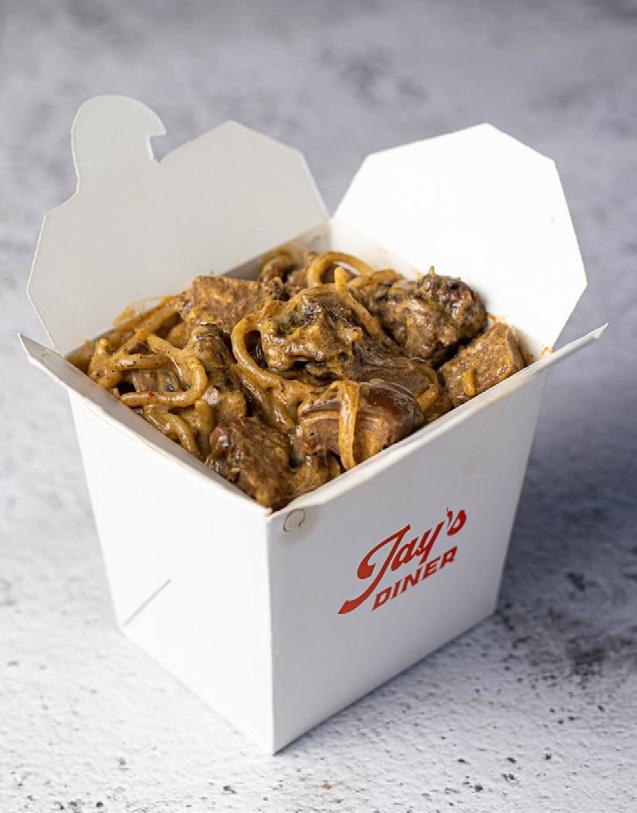

Class and beauty are two things that go hand in hand. If I don’t plug you to the best things, who will? A timeless piece this is. It’s more than just a piece of dishware. It’s art, mastery and intention all shaped into an ecstatic piece that seats pretty. This is the one bowl you want to serve your guest on a beautiful Sunday afternoon. Perfect way to make an impression.


Cocktails by SRVD
Take the party everywhere you go
As an OG baller. I sometimes want to go everywhere with the party, you know we cannot always wait till it’s Friday. That’s why I’m recommending these cocktail pouches that are ready to go. Available in so many variants you get to try a new one everytime. Get one and tell us your favorite.
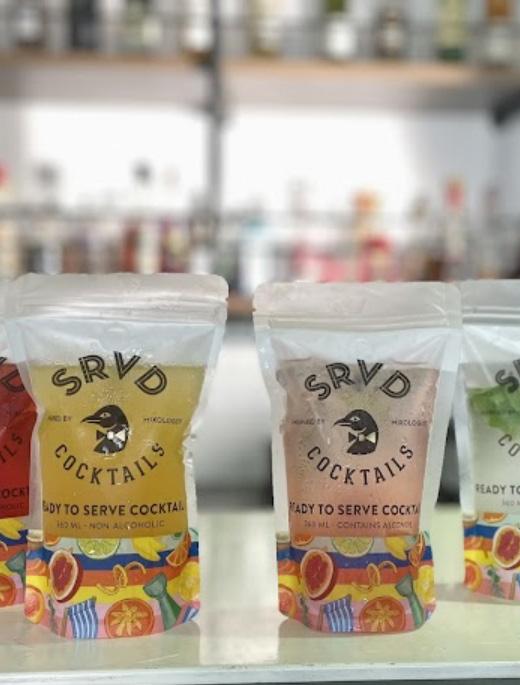

I’m a 20-something-year-old living in Nigeria, so you know I’m constantly tired. I spend way too much time obsessing over self-care, food, tech, and anything else that makes my life easier, making me your perfect plug for anything! Like most people, I find randomly shopping online at odd hours therapeutic, so much so that if you look into your mirror and say “retail therapy” three times, I will appear.

Featured Columnist
Mona Zutshi Opubor
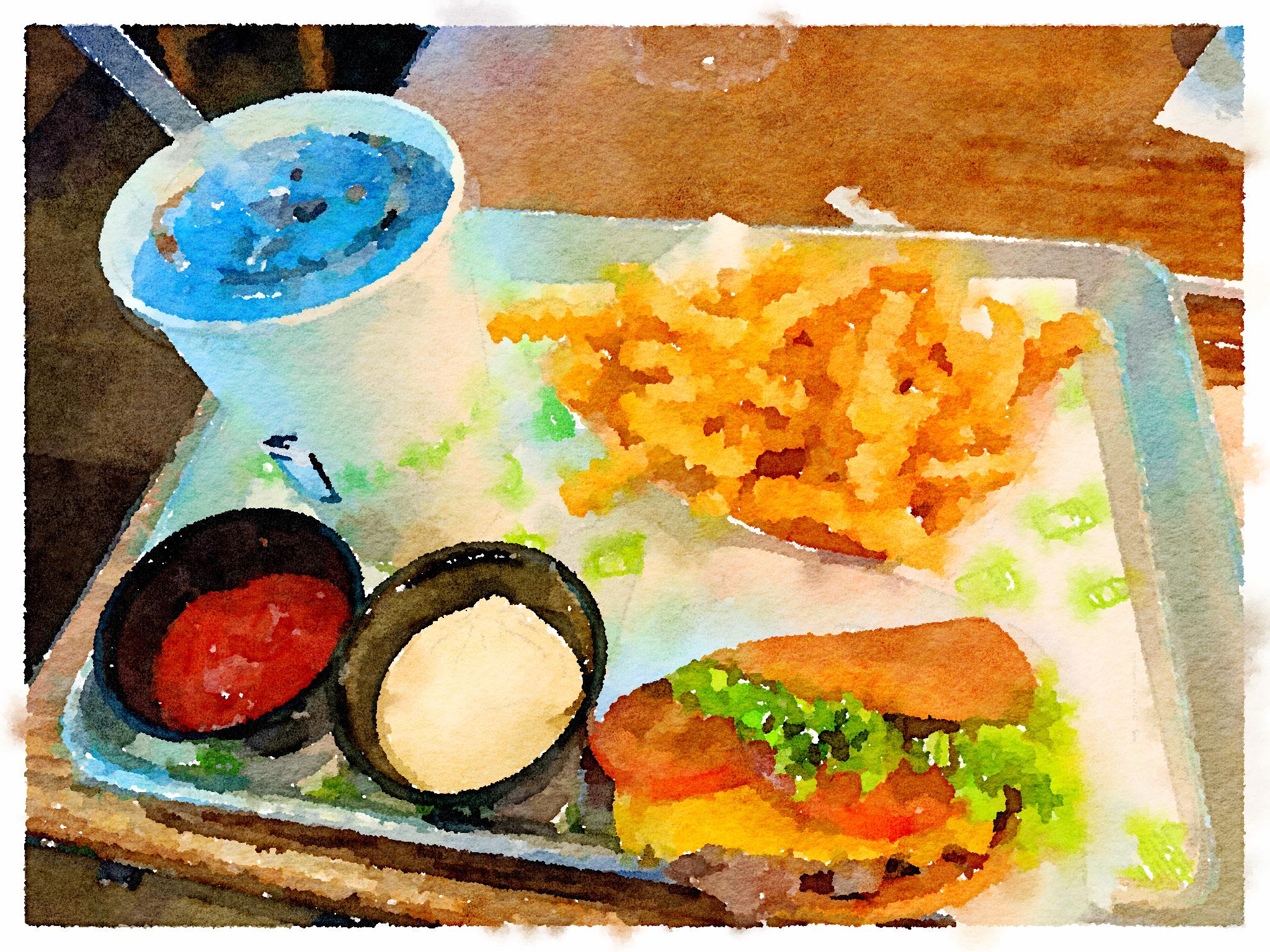
When my school booked me a trip to Dubai for an advanced teacher training last month, It had been ages since I travelled. “Are you excited?” a co-worker asked. This woman travels several times per term. The school sends her to chaperone class trips, sports competitions and attend conferences; she does everything. She is tireless, and I am tired.
I shrugged because it seemed more polite than saying no. When you stop traveling, you realise that everything you need can be found in Lagos. If I can’t find something, I’ve learned to live without it. I used to journey abroad and haul back medication, cooking supplies and even soap. One day, I realized that my body would be just as smelly with soap purchased domestically. Half the supplies I lugged home expired before I opened them. Now I don’t even buy clothes outside of the country. I am a middle aged woman. Who cares how I dress? Let me wear local fabric cut like a potato sack and call it a day.
I departed from Nigeria with reluctance. I don’t like leaving my husband, my son and our dogs. My bed is my favourite place. The only thing that compelled me to climb into the van to Murtala Muhammed Airport–aside from a burning desire not to get fired–was my secret list. I went with two lists, you see: a shopping list (public) and a things-to-eat list (private).
The shopping list was boring. I needed new flip flops and wanted to buy my son air pods. He has borrowed mine so often that they became his. That list was insignificant, but my secret food list was painstakingly composed. I researched the hotel where the school had booked us, and I noticed it was within walking distance of the Mall of the Emirates. I explored the mall’s website and studied the restaurants, planning my purchases months before my departure.

I had to get an iced latte, of course, and that was handled with dispatch on the morning I landed in Dubai. I also needed at least one meal at McDonalds, which occurred as soon as I finished my coffee. People are food snobs, but I grew up in America. I am used to Frankenfood, and all the preservativefree, home cooked dishes I eat in Nigeria don’t scratch the itch I have for heavily processed meals.
I craved sushi. I imagined a spread of strange and spicy rolls. I sat my middle aged butt on a stool on day two in Dubai and uttered the magic words “all you can eat” at a conveyor belt Japanese restaurant.
I wanted dessert, of course. I love ice cream, and the Mall of the Emirates boasted the same chain that existed in the little Massachusetts town where I grew up. I went there twice and gorged on the kind of ice cream you can’t find in Nigeria.
Oh, my list was long, but I got through it all. I even managed to squeeze in a burger and fries at 9:00 a.m. at the
airport, as I flew home. My school colleague–bless his heart–didn’t judge me as I ate a second breakfast moments before our flight departed, even though he watched me eat my first breakfast at the hotel that morning.
The most indulgent meals I ate, however, were the little platters cobbled together in my hotel room from groceries I got at the supermarket. I bought strawberries and blueberries and grapes and cream. I bought cheddar cheese and milk chocolates. I piled my plate high with indulgences I can’t justify buying when I am in Nigeria because they are imported and far too expensive.
I ate those meals alone, moaning with pleasure, devouring mindless detective novels, thinking my thoughts without interruption, thrilled to be relaxing far from family, pets and obligations. That pure, intense joy helped remind me that there may be more to this world than what I can find in Lagos.
Maybe.
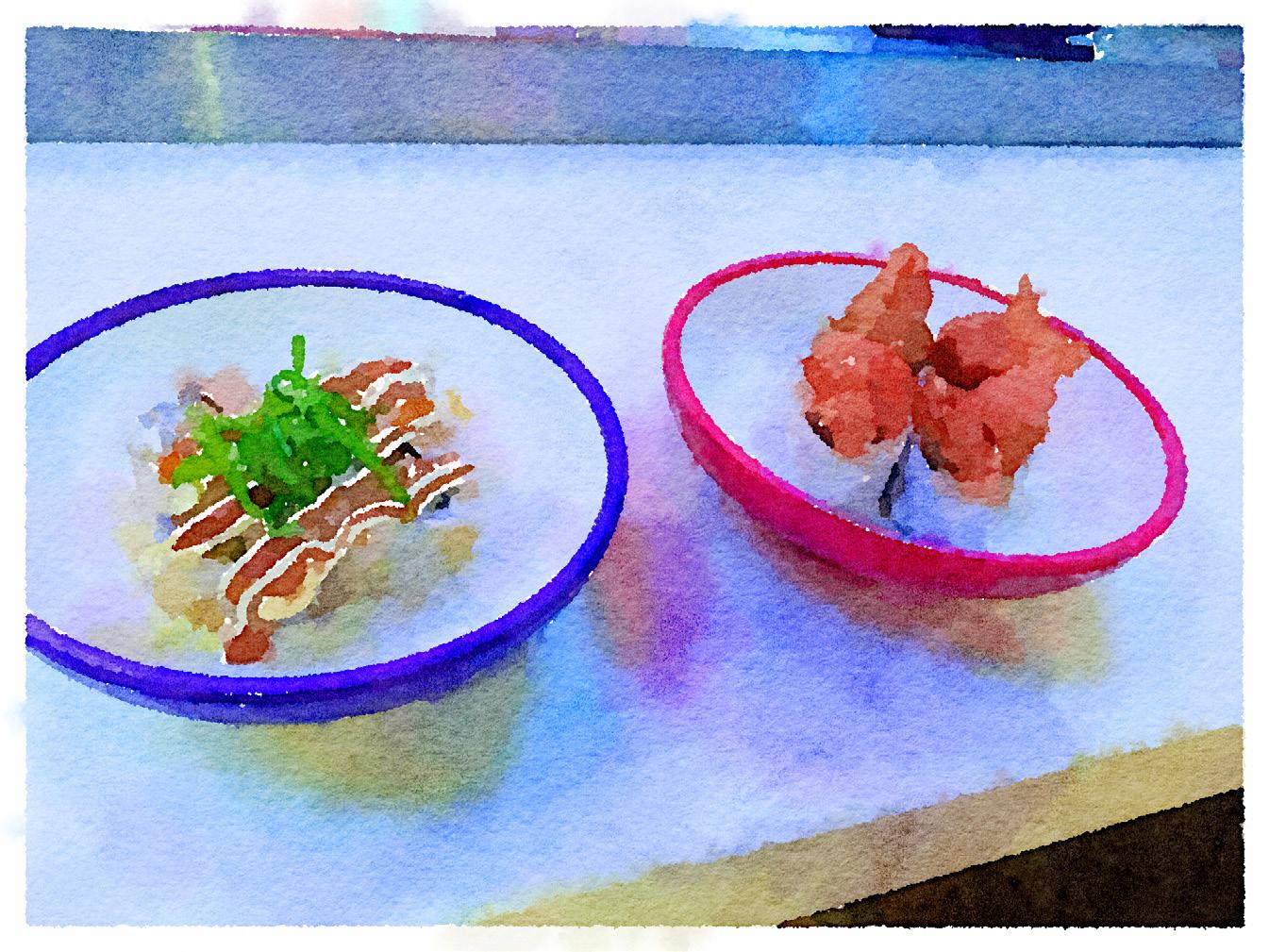

Mona Zutshi Opubor is an IndianAmerican and Nigerian writer. She holds an MSt in Literature and Arts from the University of Oxford, an MA in Creative Writing from Boston University and a BA in English Literature from Columbia University.
Read more at www.monazutshiopubor. com

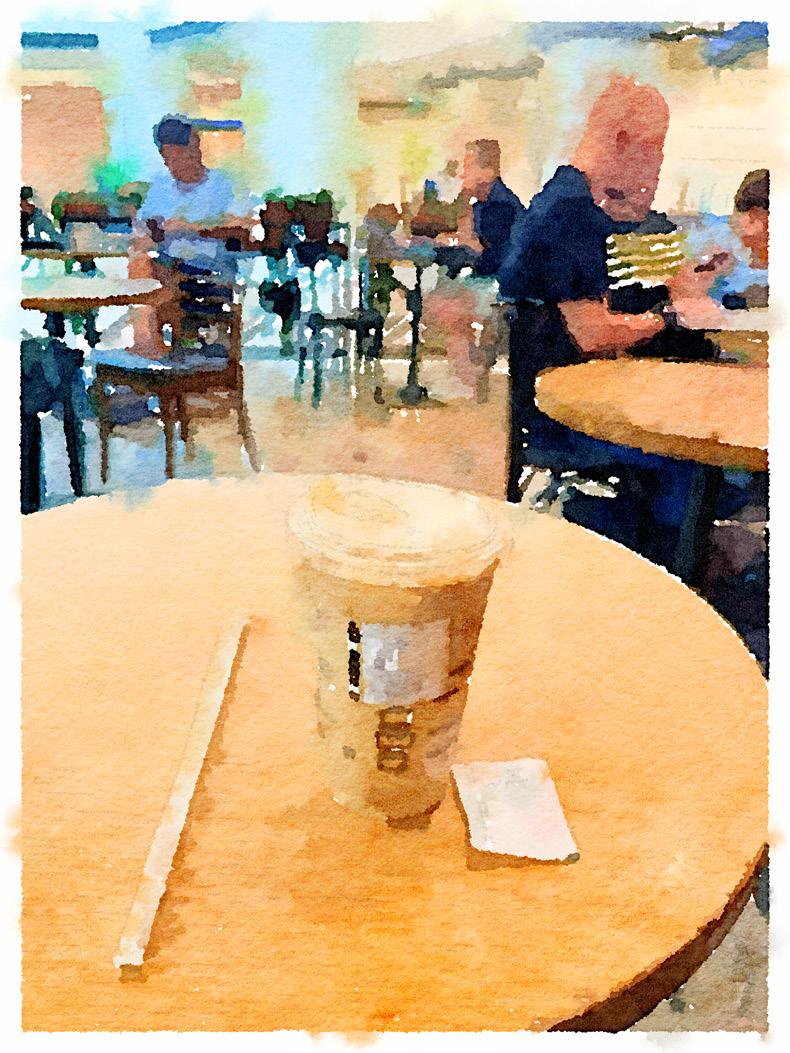
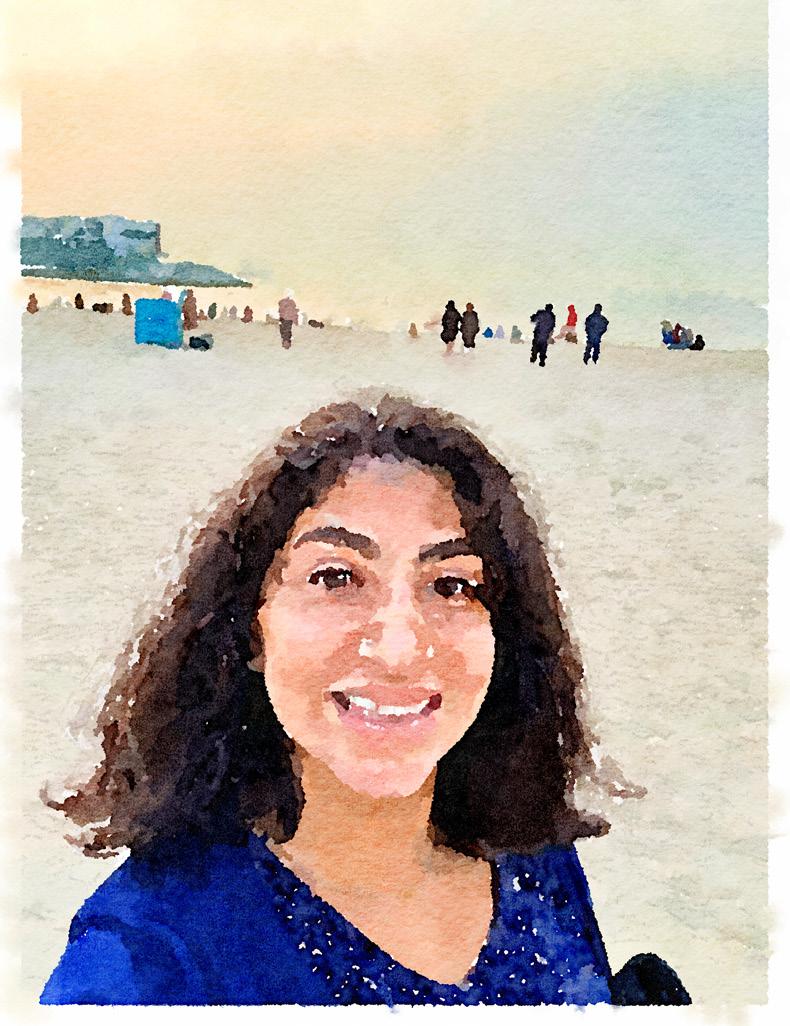
By Elvis Dante Osifo
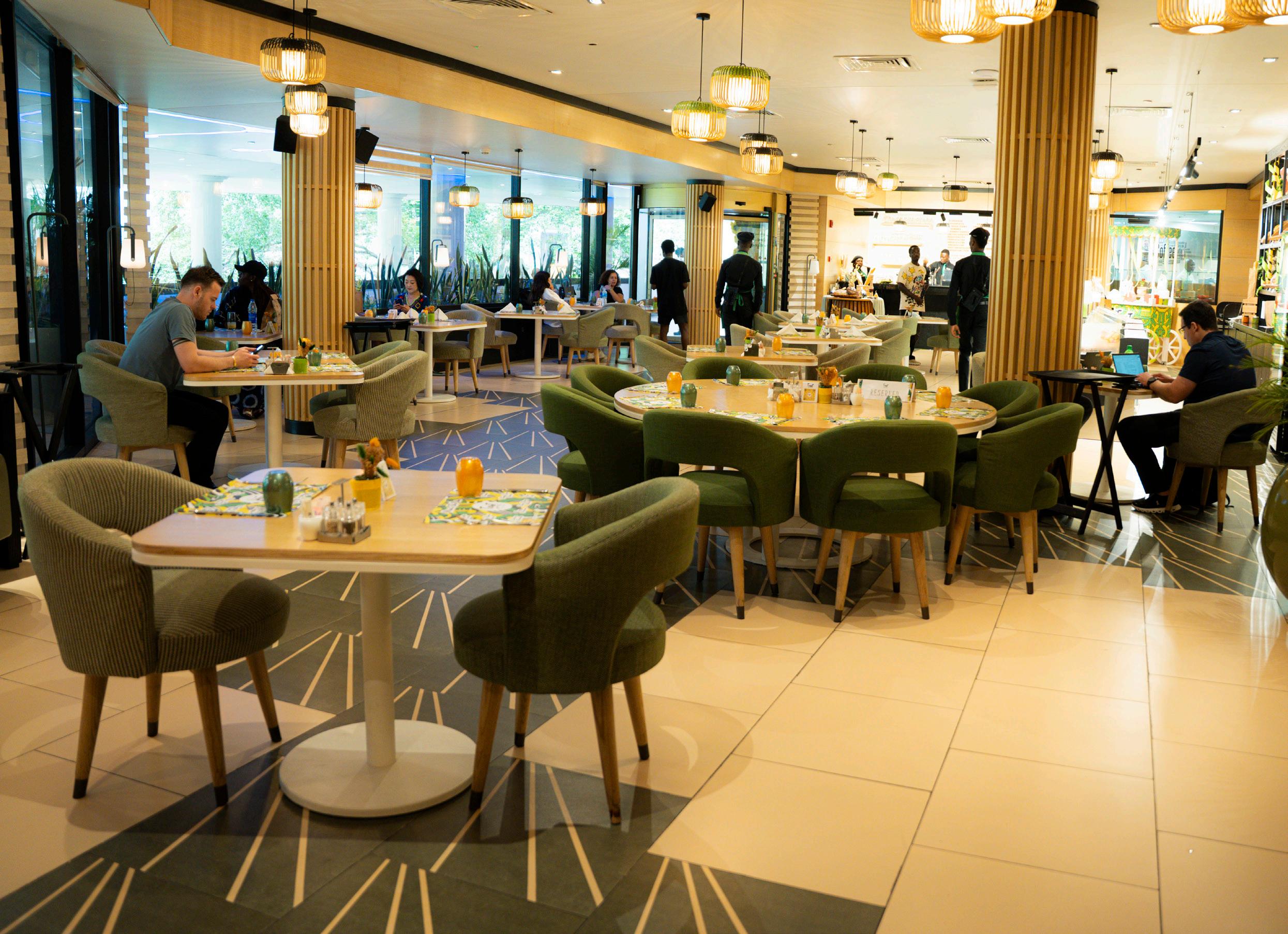

One thing is certain in this Lagos, everyone is looking for a quiet escape from the city’s relentless rhythm. Oh, two things, actually. The second is that you cannot list the top three spots that softens the ‘Eko pulse’ without naming Toast Restaurant at least twice. This coffee and bites haven at Eko Hotels and Suites is less a mere eatery, and more a light-drenched sanctuary designed for the discerning luxe Lagosian and global traveller alike. Getting ready to enter Toast is akin to preparing to dip your entire self into a pocket of your favourite treats. For those who appreciate the fondest and finest things of life, walk with me.
If you’re not too busy reliving your childhood memories on the swing just in front of the restaurant, I am going to need you to pay attention as we both journey into calm sophistication.
As soon as we walk into the always revolving glass doors, we are bathed in natural light that spills across sexy, stylish interiors. It is spacious, something a lot of Lagos hotspots lack these days. The subtle design details, from the considered placement of greenery to the texture of the furnishings, contribute to an atmosphere that is both chic and welcoming. Plush seating invites lingering conversations over expertly brewed coffee, while the subtle clinking of porcelain and the murmur of contented patrons provide a gentle soundtrack for us. It is not hard to tell that the place was designed for connection. “Whether one wants a quiet corner for a power breakfast meeting or a leisurely afternoon escaping the wave of activities happening in Eko Hotel, this is the place to be,” we are thinking to ourselves.
We are diving into the menu. While grounded in the comforting rituals of all-day breakfast, we noticed, here, a classic morning fare is elevated with a touch of culinary artistry. Today, we came to defend our foodie status, so we’re ready to feast.
Firstly, the Full English Breakfast anchored the experience. Glistening sunny-side-up eggs with golden yolks pooling gently, crisp rashers of bacon curling at the edges, and grilled tomatoes that burst with smoky sweetness. The baked beans added a comforting warmth, while sausages offered a herby, satisfying bite. Then came the Pastry Parade. Croissants, your favourite. And just how you love it: flaky, buttery, and warm, sat beside sugardusted pain au chocolat and glossy danishes. Their laminated layers beg you in a whisper as you pull without forgiveness. Next? The Avocado Toast. Well, now we have to share. Stacked high with creamy, ripe avo slices and drizzled with olive oil and herbs, it was offering a fresh, green counterpoint to the richness around it. It was too good. It feels like dessert in disguise. And you love that, don’t you?
You are reaching for your Strawberry Milkshake. One would think because it is rich and creamy, topped with whipped cream and a drizzle of syrup so seductive, you would give it a slow clap. No. Your hands are busy, but not as busy as your mouth. Slow down or I stop the article here.
No? Okay. I picked my Caramel Frappe. The buzz brought by a deep coffee kick was mellowed by sweet caramel swirls. You lift your eyes from your straw to look at me, so I immediately know that I had to leave the berry smoothie, in a thick chilled swirl of

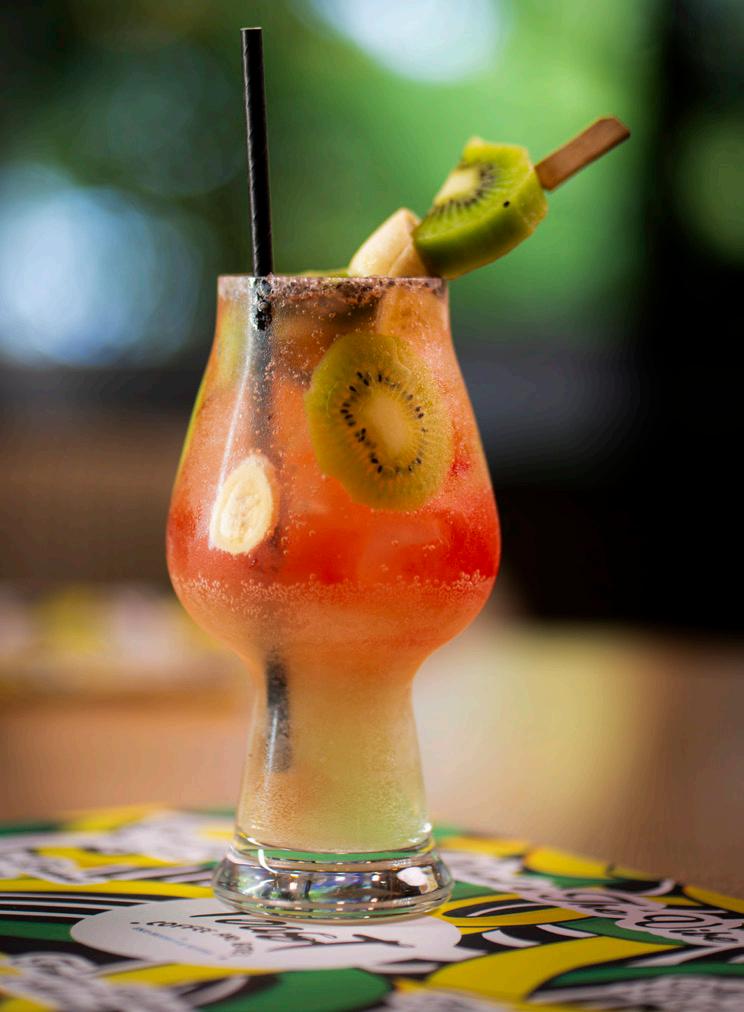
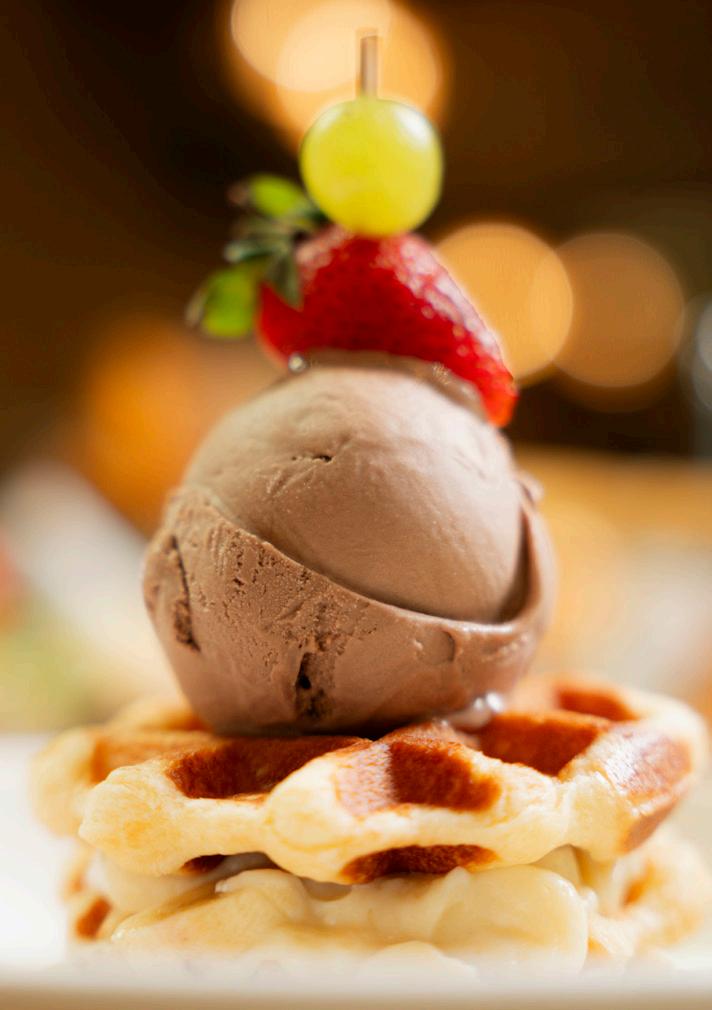
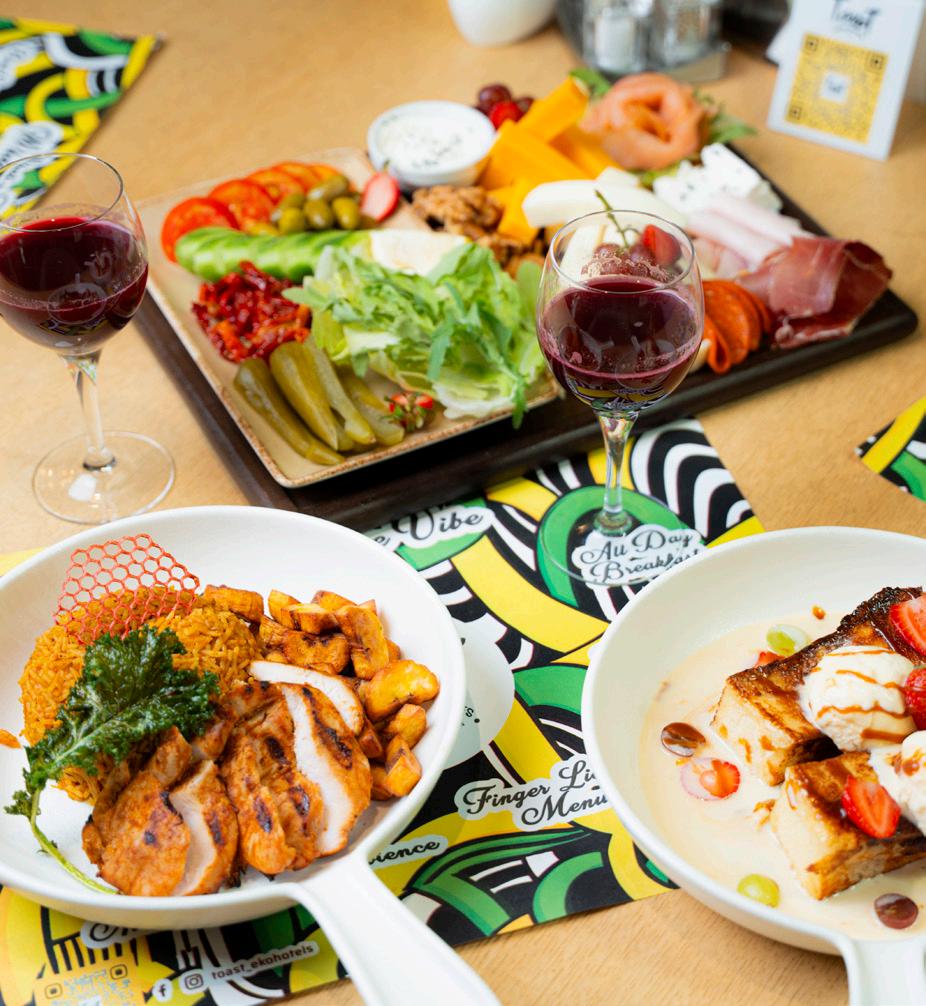
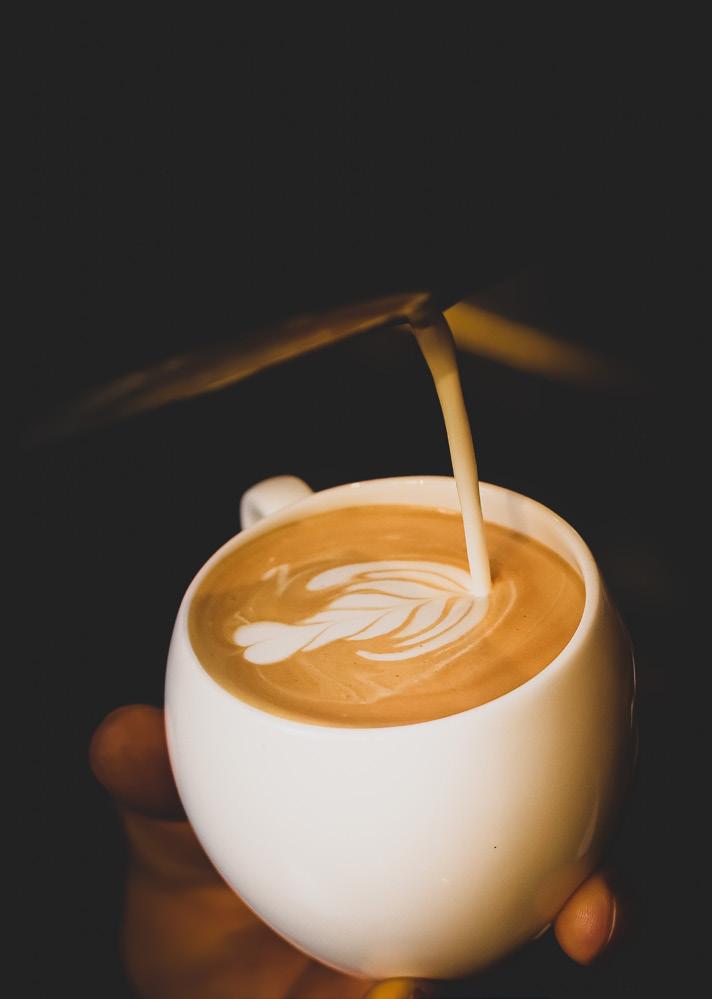
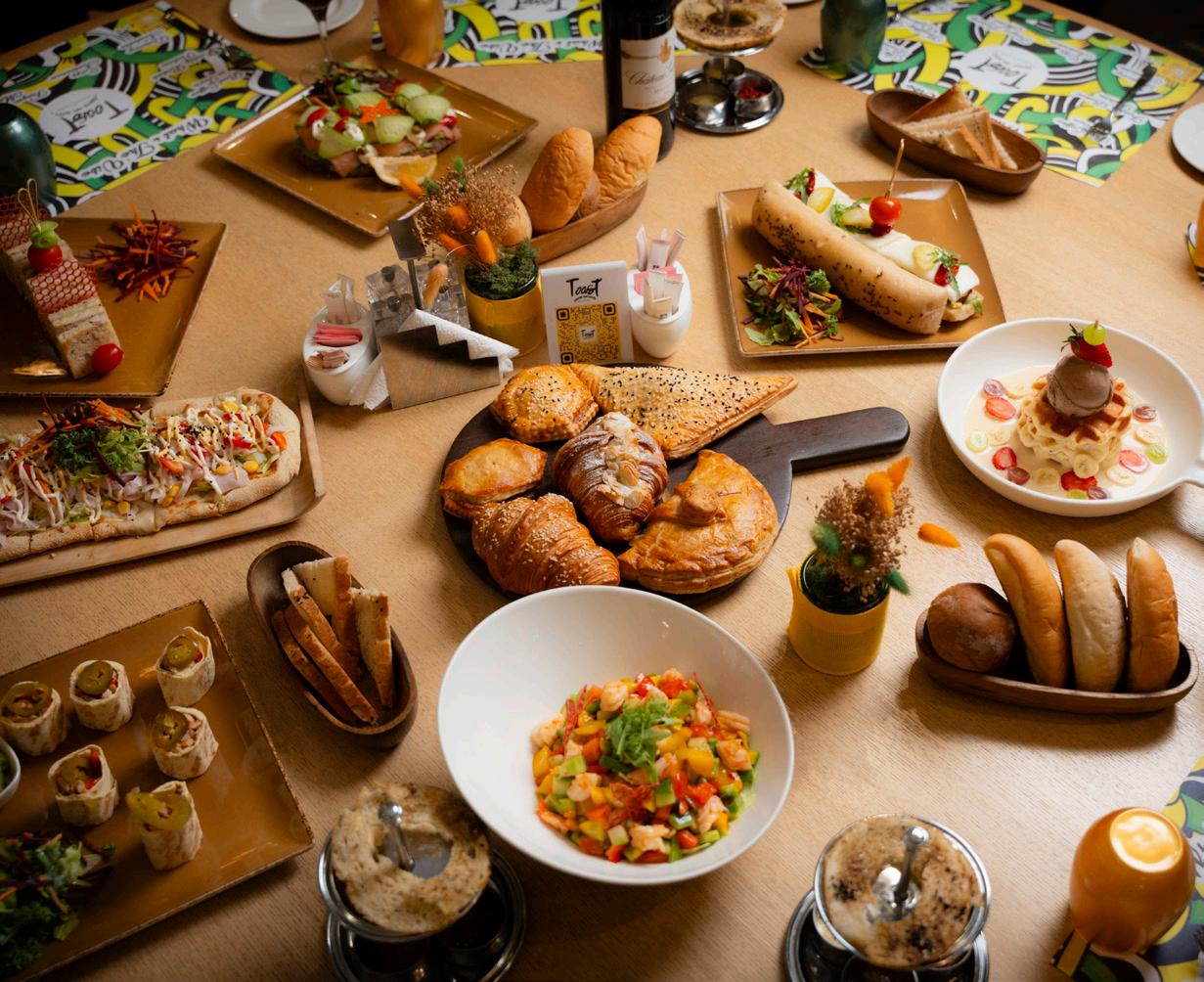
purple goodness, for you. And just when we thought it couldn’t get better, the salad bowl entered: bright mango cubes, crunchy peppers, sweet corn, and a citrusy dressing that sparked joy in every mouthful. Colorful, fresh, and bold, it was a bowl of edible confetti, we thought.
The service walks in to tell us about their artisanal pizzas with perfectly blistered crusts and crisp, but we are full. We take a look around. Every empty cup and greased plate on the table speaks to Toast’s commitment to quality, flavour, a subtle appreciation
for global sensibility, and beautiful execution. There is a palpable sense of dedication from the staff that serves to ensure that every visit feels special. It’s the kind of place where time seems to slow, allowing you to savour each bite, appreciate the carefully crafted surroundings, and truly unwind with every sip of your beverage.
Toast Restaurant By Eko Hotel, Victoria Island, Lagos c: 08179991999


Interview
Chef Gibbs
Chef & Convener, Nigeria Food Summit
CEO of African Concierge Network

You just wrapped up yet another successful Nigerian Food Summit. What was the biggest takeaway from this year’s edition, and how do you hope it moves the needle for our food industry?
One of the major objectives of the summit was identifying and spotlighting all the major aspects of the food industry in Nigeria that currently have good representation, and to see that achieved was exceptional. From media to cookery to tech, business, processing, farming, major sectors of the food space got a chance to shine and promote their work. Another objective was more focused networking within the value chain. For a long time, accessing resources and niche players in the food space would prove difficult, but that illusion was shattered at the summit. The biggest takeaway is we need to do more. We have opened a Pandora’s box that we cannot shut. The country has been waiting for a movement like this, and we are very confident that it has caused a shift that will continue to grow. We already see private funds birthed from the summit, we see private businesses hosting their own small circles, we have inspired a generation, and we are not stopping.
Your career has gone beyond the plate; into policy, advocacy, and cultural discourse. What drives this broader vision, and where do you see Nigeria positioned in the global culinary conversation by 2030?
Yes, I am riding on the wings of the great people that have gone before me. I always knew my path wasn’t just at the back of house, and my first experience was when I branched into restaurant management after several years in the kitchen. Solving problems and creating strategy came very easily to me, and after nurturing my skills for over 10 years, I believe it’s time to do much more for the industry.
I’m driven by the lack I see in the industry and the challenges that drove me to become the man I am today. Nigeria is a
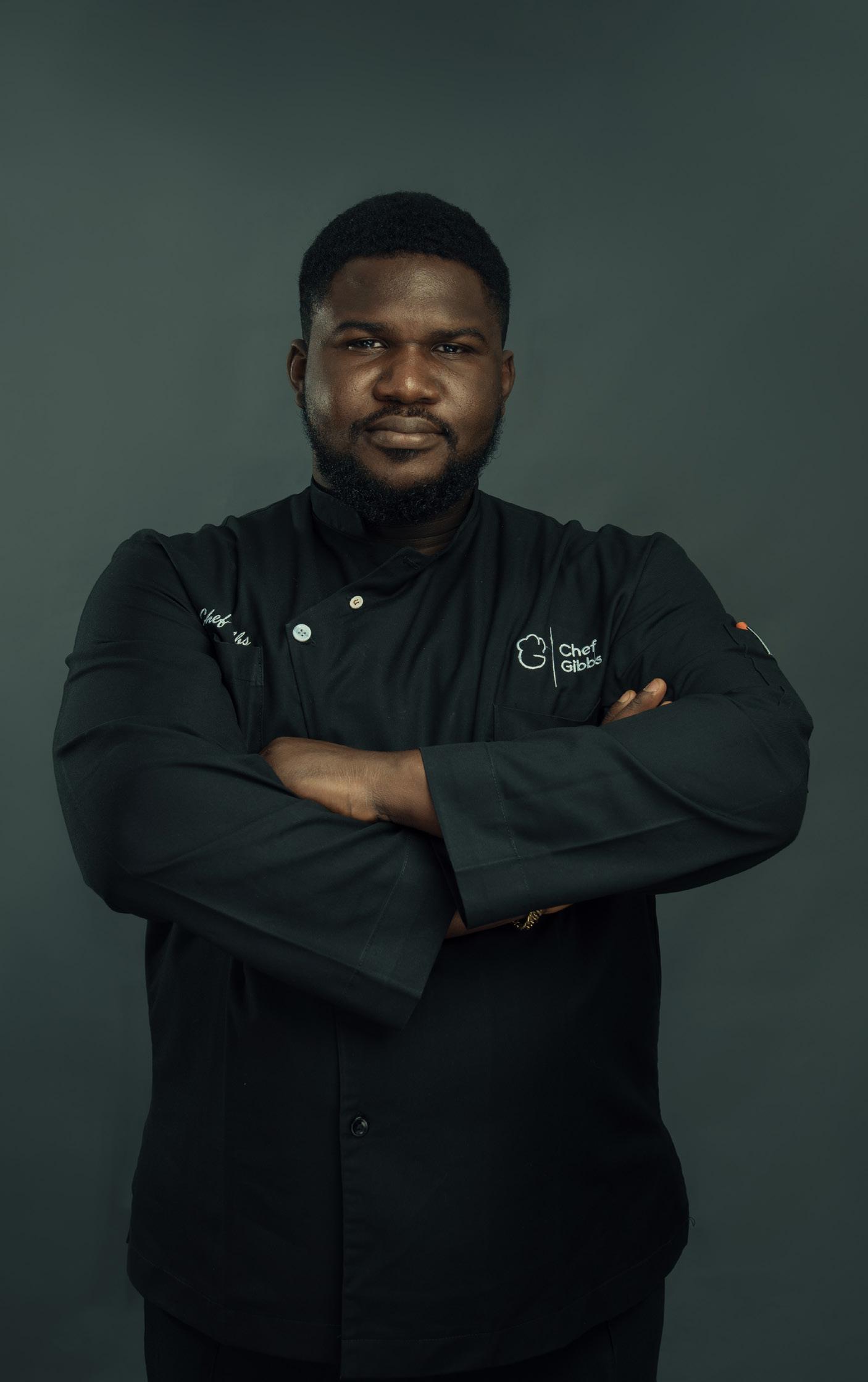
‘‘CBy 2030, Nigeria will once again feed the world, our cash crops and produce grown for export, processed locally, and sent to all corners of the world.
country filled with immense talent and resources, yet it feels underutilized. We’re not adequately recognized on global platforms; our accolades are not always given to us. All these have to change.
The revolution of contemporary Nigerian cuisine started in Nigeria, and the world should know that and celebrate it.
By 2030, I definitely see us as a major contributor to global cuisine culture and influence. It has already started, and it will only continue to grow. The popular culinary

practices and techniques that exist today were the brainchild of certain cultures, and they fought to ensure their relevance. Now it’s our turn to do the same. You will have Nigerian Culinary Arts as a globally recognized practice, with our indigenous techniques and cultures taught in schools and informal settings, and Nigeria will already be a major global food destination with tourists trooping in to experience us. By 2030, Nigeria will once again feed the world, our cash crops and produce grown for export, processed locally, and sent to all corners of the world. We will have dedicated ministries to the food industry that oversee certifications and compliance with standards, and we will have culinary representation across the 36 states of Nigeria. Let us dream together.
What is the most urgent conversation we should be having in Nigerian food right now, and why are we not having it loudly enough?
The most urgent conversation is standardization, and we are not having it loud enough because silos are still cooler and safer than community/industry. When we standardize, we will be taken seriously; then many things will fall into place.
What dish, moment, or memory reminds you of why you started this journey?
The first dish I created was for a group, and the opportunity to get that gig and the feedback helped me realize the immense possibilities we can be privy to in a more structured setting. We are not lesser than our counterparts in other industries and globally.
The culinary industry is expanding, but also evolving. What skills or mindsets do you believe today’s young Nigerian chefs must embrace to remain globally competitive and locally grounded?
We all need to be open to learning. Nobody knows everything, and nobody can know everything. Where your expertise ends is where another begins. The thirst for knowledge and exchange is very important. As cliché as this may sound, confidence, not in emptiness but in value. Chase and acquire value and be very confident. Self-esteem is also in this space. That’s the only way we will promote our industry to the point where no one will be able to silence us.
Final bite: If you had to craft a dish that tells the story of Nigeria’s culinary past, present, and future on one plate, what would be on it, and why?
Hmm, interesting.
Fisherman Soup: Seafood seared and deglazed and blended (past), strained and cooked as consommé (future), finished with infused palm oil (present), cocoyam dumplings (present), served in an aquarium (future).
Let me borrow something interesting I saw from my friend Chef Tucker and add something to it.
Ewa Aganyin: A spread of mashed beans hummus (present) garnished with beans and corn notes (past), sparingly poured aganyin sauce (past), aganyi oil (past), garri crackers (present), finished in a recyclable edible transparent bread balloon (future).
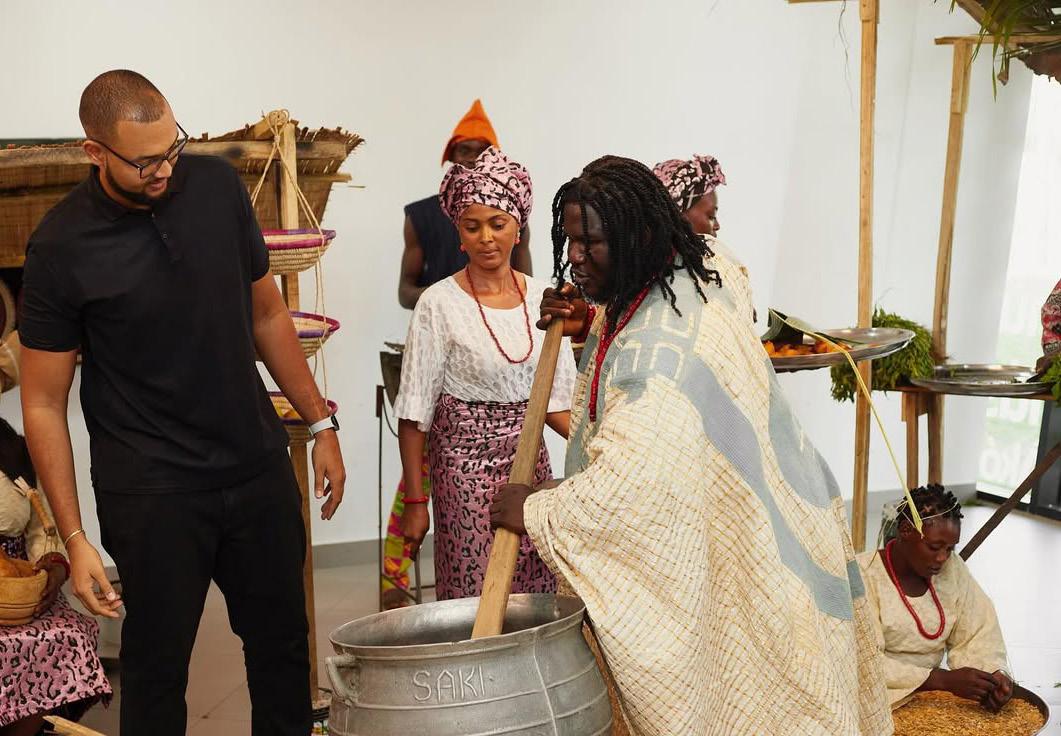
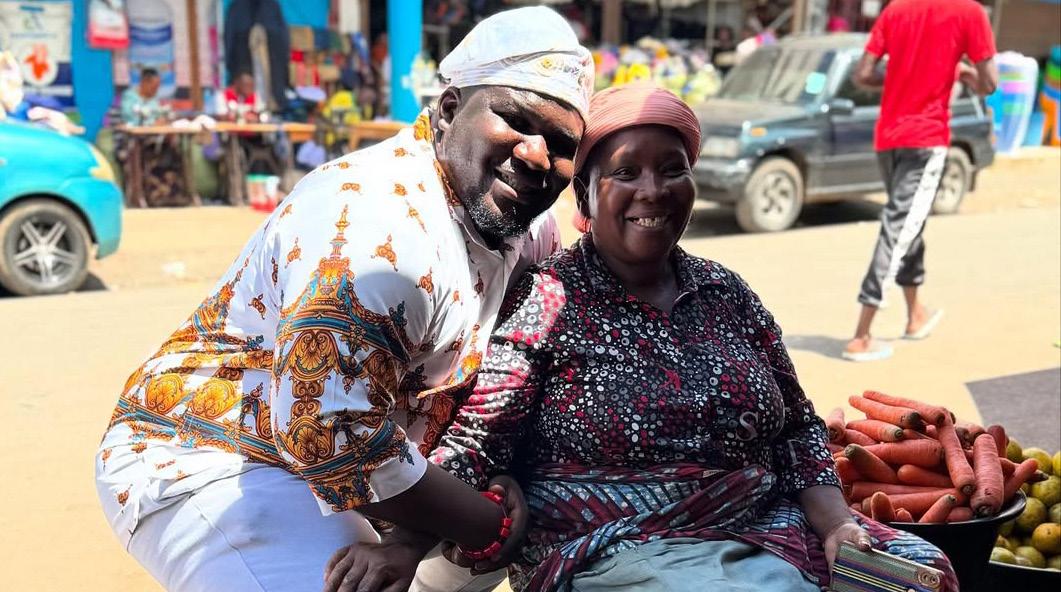

Interview

Chef Wu Chef, Hospitality Consultant, and Creative Entrepreneur
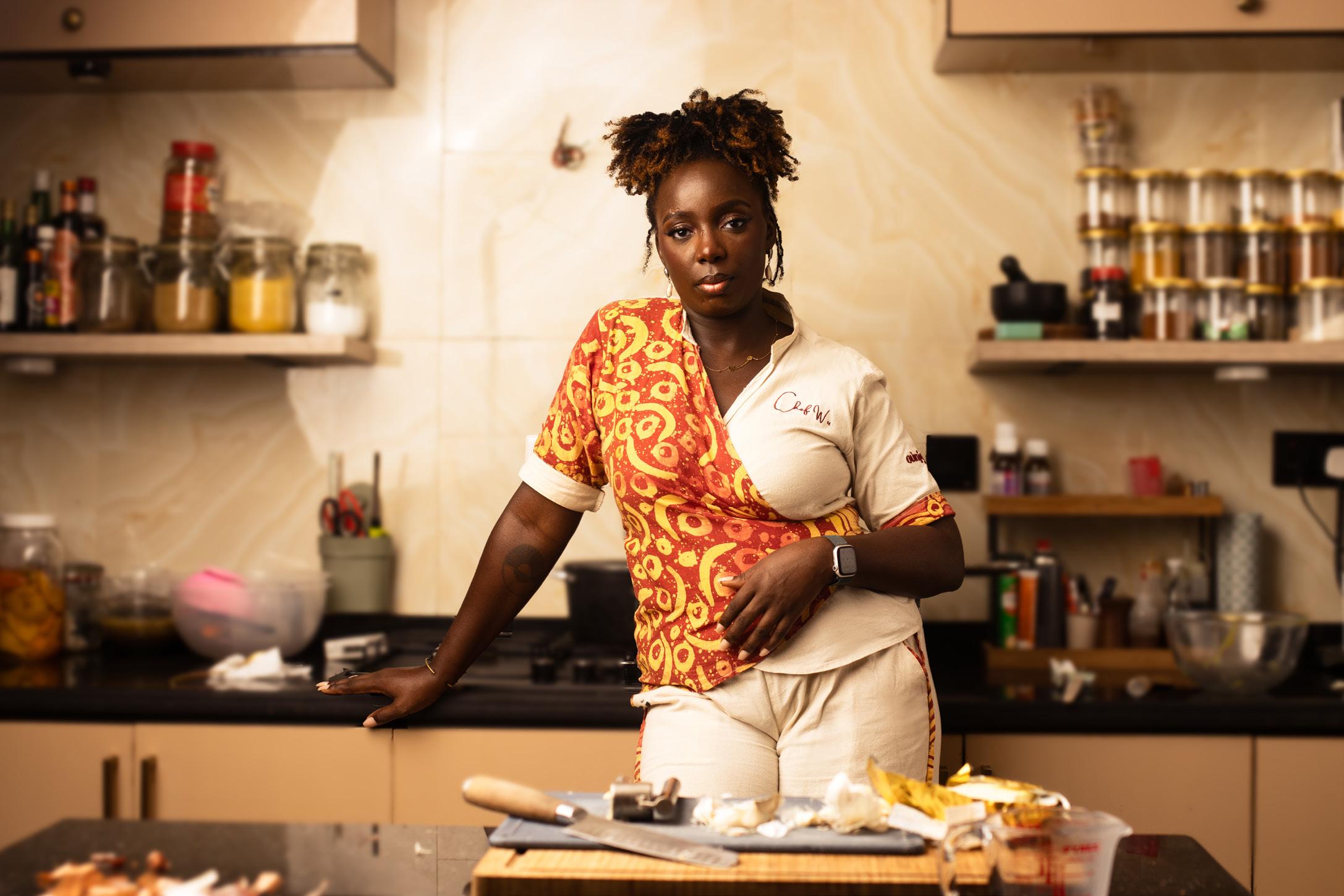

Meet Chef Wunmi Durosinmi-Etti, popularly known as Chef Wu, a distinguished chef, hospitality consultant, and creative entrepreneur who expertly blends food, culture, and storytelling. Her multifaceted work ranges from curating exclusive dining experiences and leading hospitality projects across Nigeria to co-hosting the insightful “One Bite at a Time” podcast. Driven by a passion to elevate the perception of Nigerian cuisine globally, Chef Wu is currently developing a product line spotlighting indigenous West African ingredients.
You wear many hats: chef, consultant, creator, and cultural curator. What grounds you in this work, and what continues to push you forward?
What grounds me is knowing that this work is bigger than me; it’s about legacy and culinary heritage, about making sure the next generation sees our food, our people, our stories reflected in spaces we were once excluded from. What keeps me going is curiosity. There’s always another ingredient to explore, another story to tell, another dish to reimagine, another gap to close in our industry.
You’ve championed the art of reimagining Nigerian cuisine through modern, immersive experiences. What, for you, defines the “evolution of taste” in West African food culture today?
Evolution of taste, I would say, is the shift from sustenance to expression. We’re no longer just feeding people; we’re communicating art, identity, and pride through our food. The evolution of taste is about intention and storytelling - understanding the roots of our ingredients, the history behind our dishes, and using that knowledge to say something meaningful on the plate. Not just copying what’s always been done, but reinterpreting it in a way that
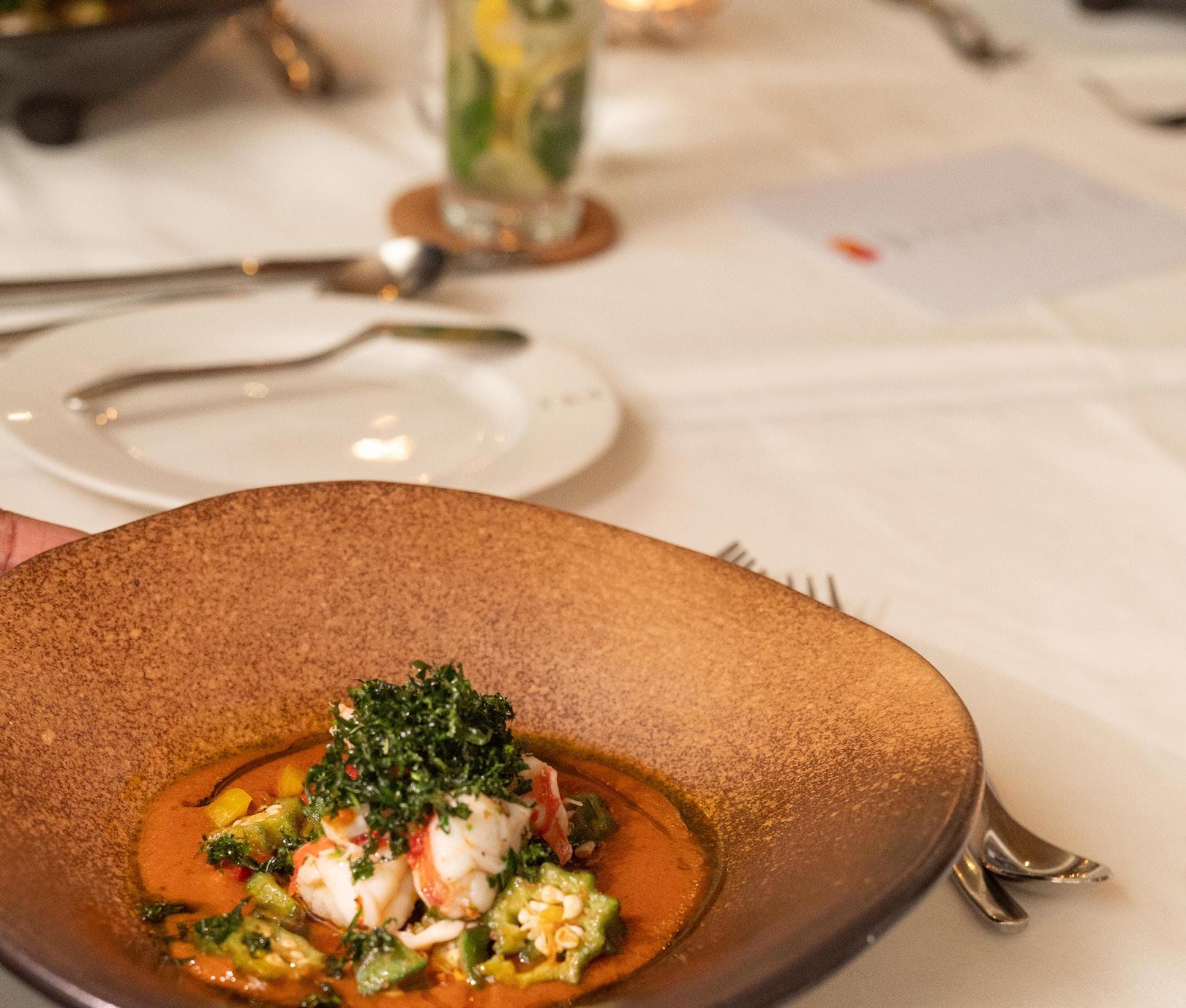
feels fresh, relevant, and still deeply respectful of where it all began.
What are some ingredients or flavour profiles you believe are underappreciated in Nigerian cuisine and deserve global recognition?
Iru, hands down. It’s such a bold, umami-rich flavour that can elevate just about anything. Then there’s egusi, which has way more range than people give it credit for, and lastly, hibiscus—it’s so much more than just zobo; it’s akin to lavender and elderflower, and we are not doing it justice. We have pantry staples that are world-class; we just need to present them that way.
What dish, moment, or memory reminds you of why you started this journey?
There are actually two core food memories that stand out for me, and I honestly can’t choose one over the other. The first was when my paternal grandmother made ogbono for me. At the time, the only draw soup I knew was okra, so this was completely new territory. She served it with elubo (amala), and because my sister and I had never seen it before—with its thick texture and that deep orange colour—we said it looked like moin moin. From that day till now, we still call it “moin moin soup” in our house. It’s become one of those funny, nostalgic food moments that’s stuck with me ever since. The second was during a brief time I spent in Nigeria as a preteen—my maternal grandmother made ikokore for me at her house in Maryland. I still remember the texture, the richness, and how foreign but comforting it felt. That flavour profile imprinted itself on me. It was

the first time I realised food could feel like discovery. But beyond those moments, it was also just growing up and watching my mum cook for her catering business at home. Nothing was ever rushed; it was always intentional. You could taste the passion in every single dish. I think that’s what really lit the fire in me. And now, every time a guest tastes something familiar in a new way and their face lights up, I’m reminded of why I chose this path.
Oúnjẹ Hospitality is changing the playbook for hospitality consulting. What are the most urgent gaps you’ve noticed in Nigerian food service operations, and how do you help close them?
There’s a big gap in structure - things like standardisation, training, and long-term systems are often missing. A lot of places are built on vibes and a notion that a restaurant is a get-rich-quick side-hustle, and that’s not true, neither is it sustainable. What we do at Oúnjẹ Hospitality is come in and help put processes and systems in place, train teams, develop menus, and basically give people the tools to run things efficiently and to ensure longevity in the business.
West African food is often misunderstood or underrepresented globally. What do you believe is the biggest myth about our cuisine that you’re actively debunking?
That it’s one-dimensional or always “too heavy.” I hear that a lot, and it couldn’t be further from the truth. Our cuisine is incredibly layered; flavour-wise, culturally, and even in technique. We work with versatile ingredients, unique spice blends, and fermentation methods that have been refined for generations. There’s freshness, heat, depth, and delicacy, all in one cuisine. The real issue is that we haven’t always been given the platform or freedom—or maybe even had the desire—to present it with the same nuance and elegance other cuisines are afforded. That’s what I’m trying to shift; through how I cook, how I plate, and how I tell our stories.
One Bite at a Time is a bold space where kitchen politics meet cultural nuance. Why was it important for you to start that conversation, and what’s surprised you most since launching it?
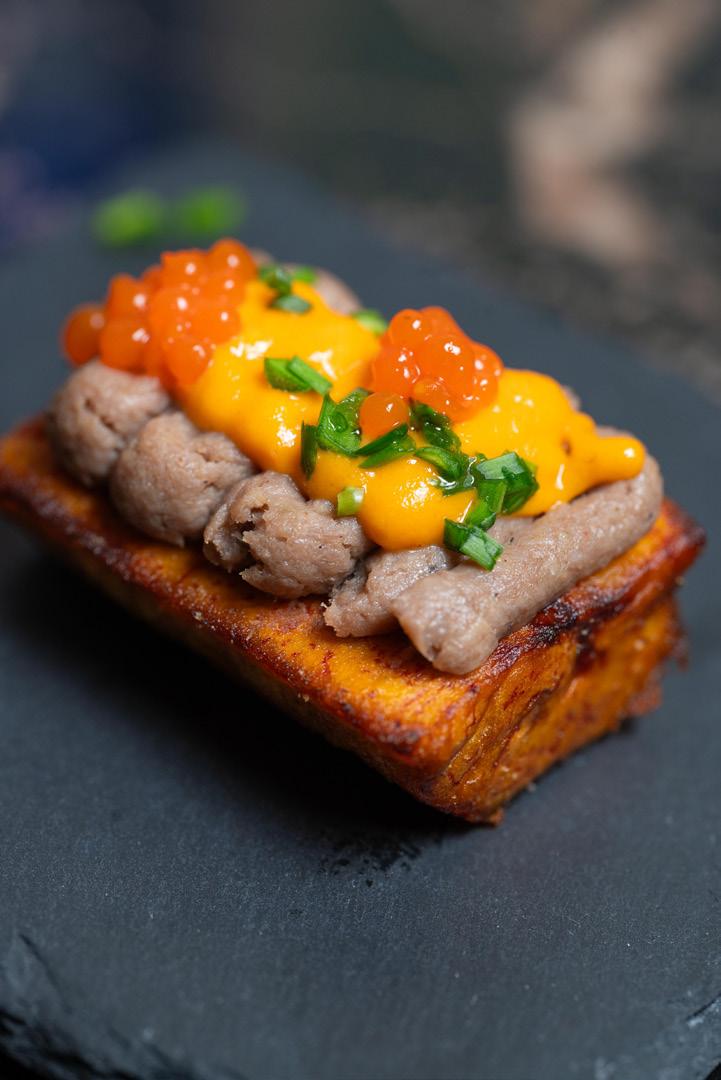
I started the podcast because a space was needed to say the things people whisper in kitchens and at dinner tables with just their inner circle. Chef Vee and I are talking about the real stuff: access, representation, burnout, growth. What’s surprised me most is how many people have felt seen and understood by it. It has made me realise that our voices matter more than we sometimes think.
What does the next chapter look like for Chef Wu and Oúnjẹ Co.? Are there new cities, collaborations, or concepts you’re particularly excited about?
I’m excited about pushing more into product development with our Products of Our Soil range by making West African ingredients export-ready. I’m also looking at hosting more dining experiences in other cities across Africa and the world; continuing to build a global audience while staying deeply rooted in Nigeria. Collaborations are in the works across various sectors—think fashion brands, beverage brands, even film. The next chapter is definitely one to keep your eye on.
Final bite: If you had to craft a dish that tells the story of Nigeria’s culinary past, present, and future on one plate, what would be on it, and why?
Honestly, it wouldn’t be just one dish; it would have to be a multicourse menu. Something that showcases our most indigenous ingredients in new, unexpected ways. And funny enough, that’s exactly what I’m working on at the moment for the 2025 season of Oúnjẹ Roundtables; a series titled One Ingredient, 4 Courses. Each dinner explores a single native ingredient—like fonio, iru, or palm oil—and presents it across four reimagined courses. The idea is to acknowledge the historical use but present it as something reimagined, making way for what it’s become and what more it could be. We’ll be running this dining series at the Oúnjẹ Dining Room from June 22nd through November, with a grand finale in December—a 6-course tasting featuring the standout dish from each instalment. So I guess I have just given Lost in Lagos the ultimate exclusive.
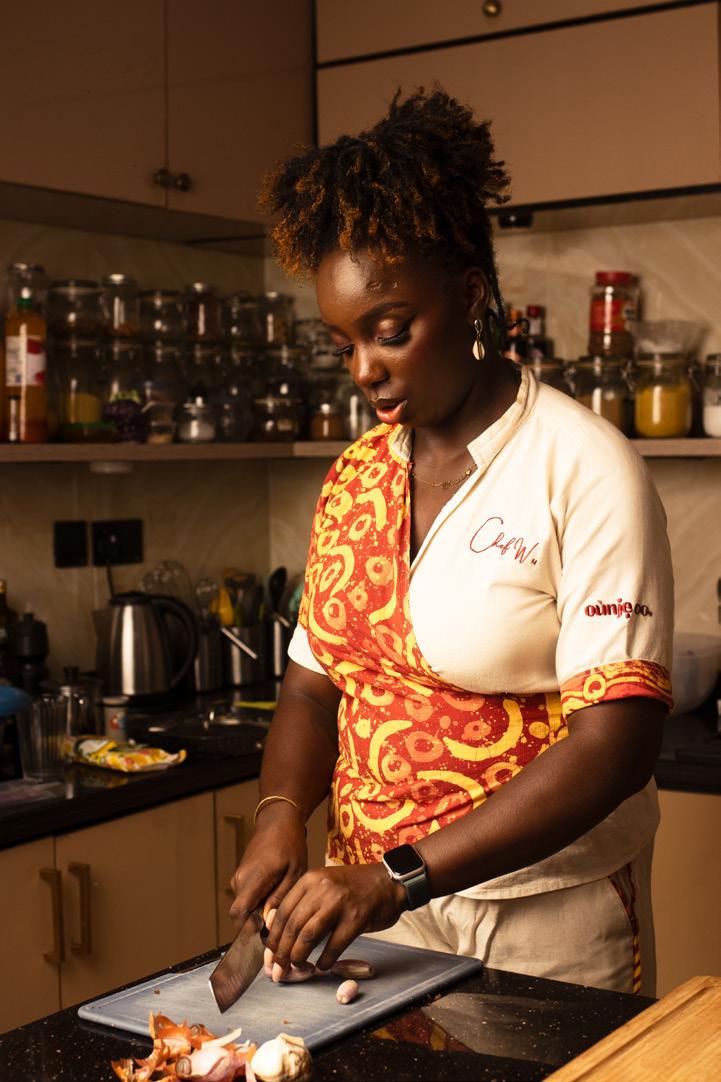
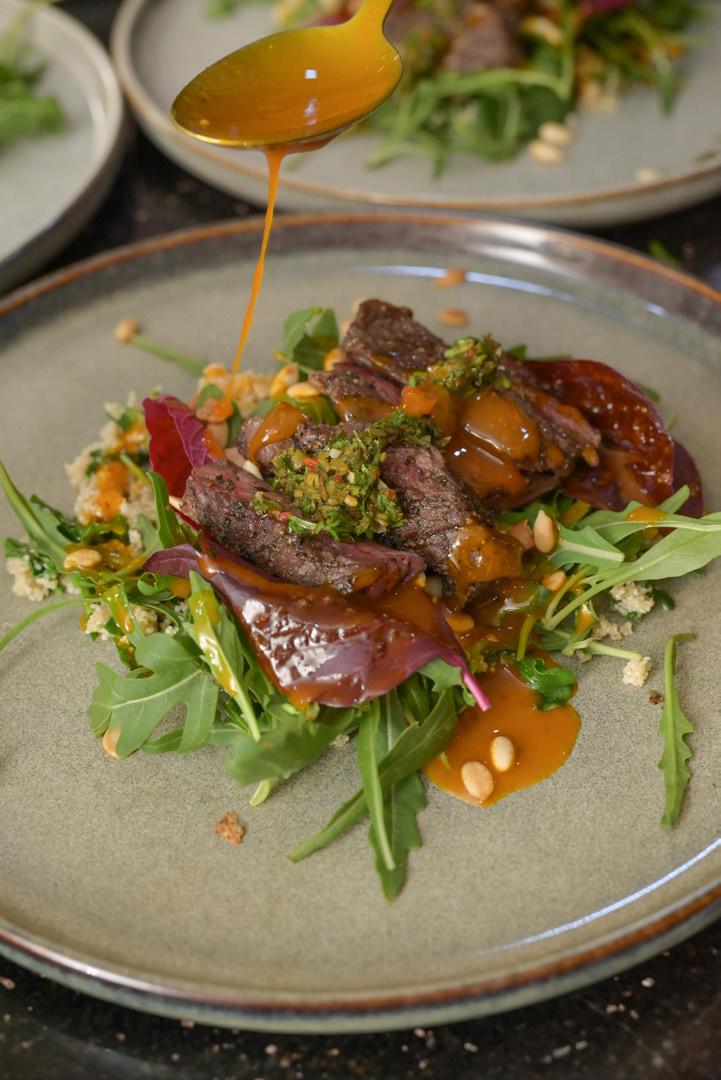
‘‘ We have pantry staples that are world-class; we just need to present them that way.

Interview Chef Feyikewa Founder, Kewa’s Kitchen and Àjọjẹ Lagos

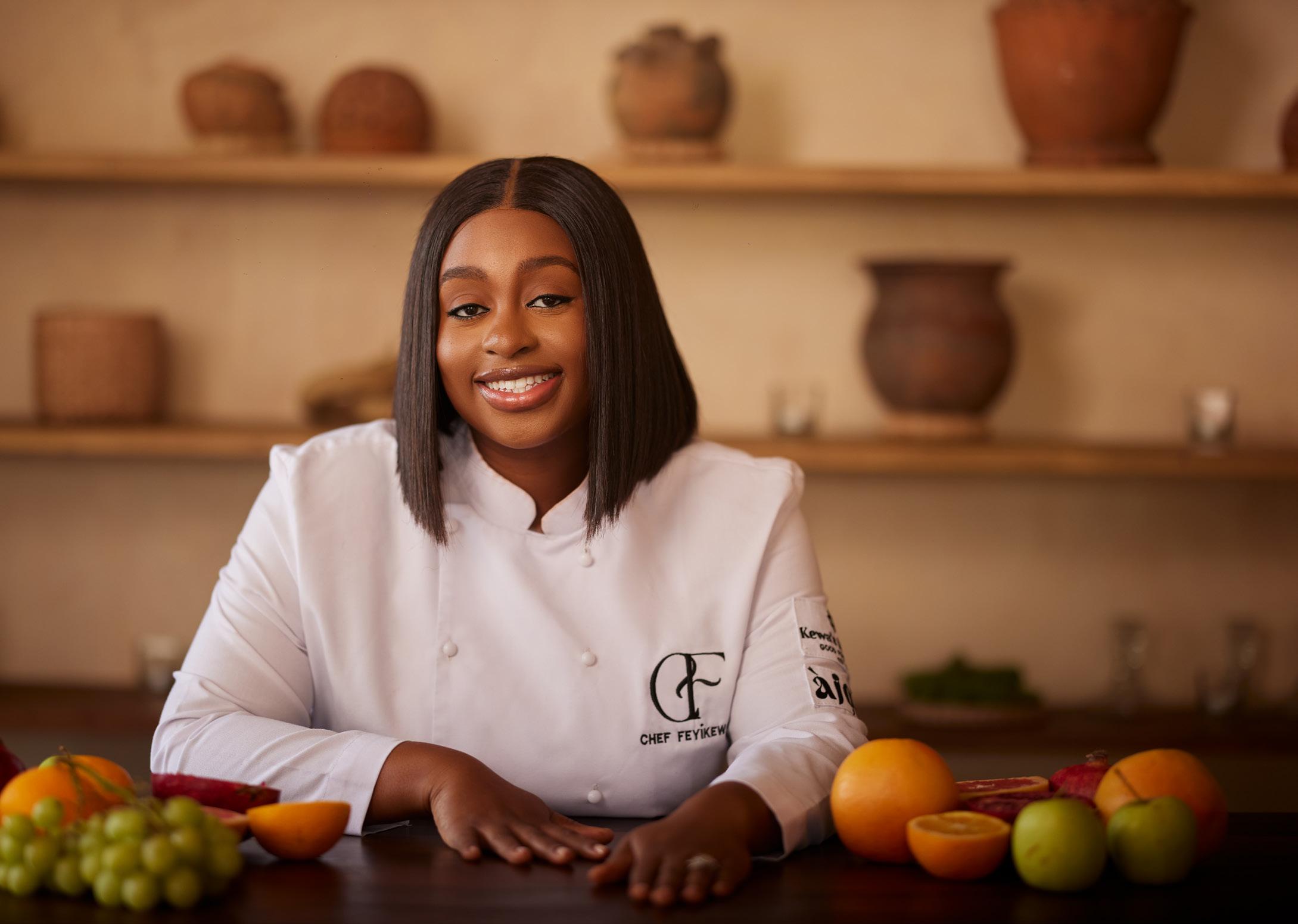
What inspired all of these? How did you get into the industry?
I’ve always loved food but I didn’t always see it as a career. I studied law in the UK and Nigeria but I was constantly drawn back to food as a creative outlet. Eventually, I decided to go to culinary school and it all clicked. Kewa’s Kitchen started as a small hustle and slowly grew into what it is now, and Àjọjẹ came out of a desire to create something more intentional a space to eat, connect, and share culture in a really meaningful way.
Your work with Kewa’s Kitchen and Àjọjẹ speaks to something deeper than just food. How would you describe your personal food philosophy?
For me, food is a creative avenue to share my life’s journey and experience. I love exploring flavour, drawing inspiration from everywhere I’ve lived or travelled but always keeping a strong Nigerian / West African foundation. I want what I serve to feel considered, familiar, and fresh all at once.
West African cuisine is as bold as it is layered. How do you balance tradition with your own creative interpretations when designing a dish?
I respect tradition deeply but I don’t feel boxed in by it. I like to take what I know and grew up eating and find new ways to express it. Sometimes that’s through a different technique, pairing, or presentation but the soul of the dish always stays intact. I think that’s how you keep food evolving while still honouring where it comes from.
Do you remember the first event you ever catered? What went wrong, and what went so right?
Yes, I’ll never forget it. It was a friend’s birthday and I was so anxious
Chef Feyikewa Animashaun is the founder of Kewa’s Kitchen and Àjọjẹ Lagos, known for crafting warm, thoughtful, and subtly surprising food experiences. Trained at Le Cordon Bleu after studying law, she passionately blends her Nigerian heritage with global inspiration, creating immersive dining events that foster connection and celebrate culture. Through both her catering and intimate dinners, Chef Feyikewa shares her culinary journey, inviting guests to savor considered and fresh flavors.

that I made way too much food. I was exhausted by the end of the day but people loved it and the feedback was incredible. That’s when I realised this could be something real.
Àjọjẹ, meaning ‘eating together,’ feels like both an experience and a movement. What inspired its creation, and what has it taught you about connection through food?
Àjọjẹ came from a place of wanting more. More depth, more intention, more connection. I didn’t want to just cook for people, I wanted them to feel part of something. It’s shown me that when people sit together, eat together, and let their guard down it creates the kind of magic you can’t force. It just happens.
We’re all about local flavours. What’s one underrated Nigerian ingredient you think the world should know more about?
Okra, without a doubt. It’s often overlooked but it’s actually so versatile. It’s earthy but also a perfect blank canvas like a gallery you can keep building flavour on. We’ve played with it in a few unexpected ways at Àjọjẹ. There’s a salad on our new menu that incorporates okra, and we even developed a drink that uses it too. It deserves way more attention than it gets.
If Àjọjẹ could travel the world, where would you want it to go next and what story would you want it to carry with it?
New York. There’s something about the energy of that city that feels like the perfect backdrop for Àjọjẹ. It’s fast paced, diverse, always moving but people are craving depth and connection more than ever. I think Àjọjẹ would feel like a pause. A reminder to slow down, sit together, and experience something real. I’d want it to carry the story of Nigerian hospitality, how we host and how a shared meal can feel like home even in the middle of a city that never stops.
Interview
Michael Williams
GM at EbonyLife Place
M
ichael Williams has been the accomplished General Manager of EbonyLife Place since December 2020, expertly guiding a 200+ team across its diverse operations. His two decade career spanning tourism, media, and hospitality in Nigeria, coupled with a background in advertising and marketing, establishes him as a leading authority in the nation’s dynamic hospitality sector. A champion for exceptional guest experiences, Michael is also a published author with a passion for continuous learning.
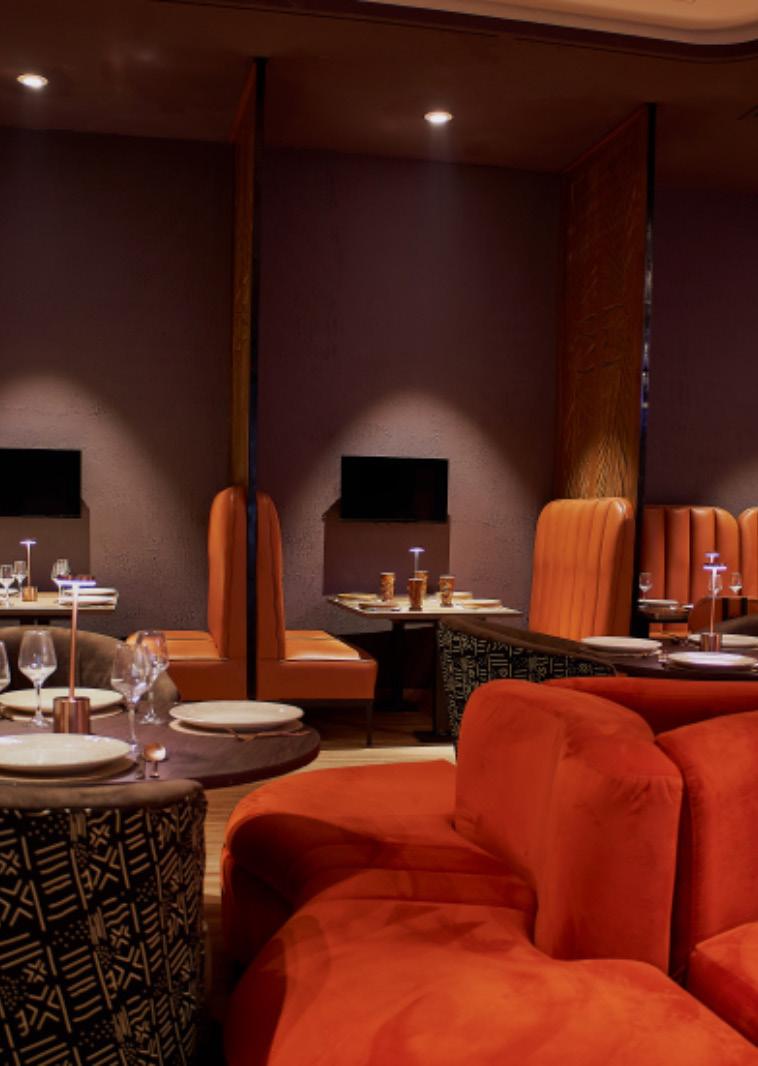
The Afrobeat Lagos is described as the first restaurant in the world dedicated to celebrating Africa’s vibrant music genre through food. What inspired the concept, and what story are you telling through its menu, design, and soundscape?
Around 2018, I had an idea for a restaurant that would celebrate Nollywood, the Nigerian film industry, but no one was interested at the time. Over the years, I saw that Nigerian music artistes had overtaken actors in terms of global popularity, making a theme restaurant that celebrated both industries more viable. In 2022, I was talking to Mo Abudu about the possibility of a new restaurant and floated the idea, but she felt more confident about focusing on just afrobeats because of its local and international appeal. That’s how The Afrobeat was born. We wanted something both sophisticated and African, in terms of the furniture and fittings, as well as the cuisine, and we wanted the music to be seen and heard. To create the interior design, we turned to Tola Akerele of iDesign, who did a fantastic job as usual. Strider Woods built the furniture and fixtures, and the space was further enhanced by striking wall art from Murals.ng. Trace was a no-brainer as our partner with the music and visuals, and an instant connection to the artistes.
You’ve had an incredible two-decade career in tourism and hospitality. What unique opportunities and challenges come with leading a cultural hub like EbonyLife Place, particularly in Nigeria’s evolving food and entertainment scene?
EbonyLife Place was a brilliant concept from

the beginning—an upscale leisure resort with a luxury cinema and boutique hotel. It was obvious to me that Mo Abudu had a clear idea of the standard she wanted to set, based on the quality of the facility she built. The opportunity was there to create an environment for the perfect date night, fun family day out, or relaxing after-work escape, with a variety of dining experiences and excellent customer service. It has been exciting to keep the resort growing and evolving with constant innovation, especially when people least expect it. For example, EbonyLife Cinema, with only 4 screens, managed to become the no.1 cinema location in West Africa for 2024, largely due to the comfort of our reclining VIP seats, a friendly team, and an extensive menu of over 25 food and drink choices. The biggest challenge is recruiting, training, and retaining talent, followed by navigating the unpredictability of the Nigerian economy.
What is the most urgent conversation we should be having in Nigerian hospitality and leisure right now, and why are we not having it loudly enough?
Hospitality and leisure have grown so much in the last 5 years, with so many promising signs. However, I think it’s time for us to take Nigerian cuisine more seriously— valuing local ingredients, using them in more interesting ways, and elevating their preparation and presentation. It’s a little embarrassing to see more innovation by Nigerian chefs in London than in Lagos.
As a hospitality leader, what are your thoughts on nurturing talent and building

long-term careers in Nigeria’s food and beverage industry? What structures are missing, and what should we be doing better?
Although margins are tight, it is important to improve the pay and conditions of the average hospitality worker, especially by providing incentives—something that every business can afford because it pays for itself. That is the only way for the industry to attract more talent. Better training will provide greater upward mobility for the more ambitious. The biggest gap is the lack of training for middle and upper management in hospitality. Until we close that gap, the industry will be overly reliant on workers from overseas. In the meantime, it is vital for expatriate managers like me to be intentional about transferring skills to those who want to build lasting careers.
Lastly, if The Afrobeat Lagos could send one dish and one song to represent the soul of the restaurant to someone who’s never been, what would they be, and why?
It’s hard to choose one, but the Seafood Oha with Grilled Parsley and Poundo Patties ticks the most boxes with its combination of fish, crab, calamari, and prawns, tossed in spicy Okomu palm butter sauce with Oha and Uziza leaves. The poundo patties are buttery, light, and fluffy. It surprises with both taste and texture. One song? Nearly impossible. Maybe Laho II by Shallipopi and Burna Boy for its totally laid-back vibe—just like chilling on the red-clay, serpentine sofa that dominates our dining room while sipping a signature cocktail after a satisfying meal.

Interview Judah Habila Sommelier & Hospitality Consultant Founder, Elite Hosting International Ltd
‘‘ A lot of people still think wine is for “elite” gatherings or special occasions. Breaking that mindset is one of the biggest hurdles.

What inspired all of these? Juju the Wine Guy? Nice! What’s the story?
Honestly, life did. I went abroad to study IT, but things got really tough for my family, and I stopped getting financial support from home. I had to find a way to survive, so I got a job as a waiter. That’s how I stumbled into hospitality, and I quickly fell in love with it—meeting people, learning, growing. Eventually, I was working as a VIP lounge bartender and supervisor at a five-star hotel in Cyprus. I looked around and noticed the hotel had all sorts of professionals—great chefs, mixologists, service experts—but no one handling wine. That gap sparked my curiosity. I started researching, buying wines, tasting them at home with my family.
In 2019, Brennan’s Restaurant in New Orleans sponsored me to train with the Court of Master Sommeliers in the US. I took

M
eet Judah Habila, also known as Juju The Wine Guy, a certified sommelier, hospitality consultant, and the esteemed Founder of Elite Hosting International Ltd. His expertise lies in crafting premium hospitality experiences, enriching wine education, and curating memorable events throughout Nigeria and beyond. Judah’s passion is centered around making wine enjoyable and accessible, seamlessly blending hospitality with captivating storytelling to connect people through wine.
the chance, went for it, passed the certification, and here we are. That’s how Juju The Wine Guy came to life—not just a name, but a journey of passion, hustle, and purpose.
As a sommelier, how would you describe the Nigerian palate when it comes to wine? What excites you about where it’s headed?
Nigerians generally have a sweet tooth when it comes to wine. There’s a clear love for Moscato, sweet Rieslings, Chenin Blancs—basically anything fruity and smooth. These wines are easy to enjoy and feel familiar, especially with the kind of food we eat. That said, there’s a growing number of Nigerians with more adventurous, complex palates. People are becoming curious about drier styles, bolder reds, sparkling wines, and natural wines. What excites me most is that people are no longer just drinking wine to look fancy—

they’re actually asking questions, attending tastings, wanting to learn. That curiosity is how culture starts, and I’m here for it.
Do you think Nigerian cuisine has been under-paired or under-explored when it comes to wine pairing? What local dishes and wine pairings do you believe deserve more attention?
Let me be honest—and some of my friends in the wine industry might not love this, especially those who market and sell wine. They’ll say anything to get people to pair wines with everything. But personally, I don’t think all Nigerian food needs to be paired with wine. One of the key principles in wine pairing is “what grows together, goes together.” Take Sauvignon Blanc and Chèvre for example—they’re both from the Loire Valley in France and naturally complement each other. That’s why the pairing works.
Now, Nigerian food didn’t evolve alongside wine. Our food grew up with things like beer, palm wine, and local spirits. So sometimes, trying to force a wine pairing just feels off. Pepper soup, for instance, could technically go well with a sweet white wine—the sugar helps balance the spice without dulling the flavor. But if I’m being honest, I’d still rather enjoy my pepper soup with a cold beer. It just works. That said, there are some exciting combinations: Suya with a bold Shiraz; grilled fish with a well-chilled Chardonnay. But we shouldn’t feel pressured to force wine into every dish. The best pairings are the ones that feel natural.
You’re not just a wine lover: you’re building an ecosystem. What have been the most eye-opening challenges in bringing wine culture to life in Nigeria?


Access, first of all: access to good wine, proper storage, education, and even just wine-friendly spaces. A lot of people still think wine is for “elite” gatherings or special occasions. Breaking that mindset is one of the biggest hurdles. There’s also the challenge of infrastructure. By the time a bottle of wine makes it to the average consumer here, it’s already been through a lot—heat, poor handling, sometimes even counterfeit issues. That affects the experience and the trust people have in wine.
And then there’s the pressure of taste. People often don’t trust their own palate—they’re used to being told what’s good instead of finding out for themselves. But the good news is, I see change happening. When someone comes to a tasting I’m hosting and says, “Wow, I didn’t know I liked this,” that’s a win for me. That’s one more person who now sees wine differently. I’m not here to push wine—I’m here to build a culture around it that’s honest, inclusive, and Nigerian at heart.
If you could design your own wine label, fully reflective of Nigerian identity, what would it be called and what would it taste like?
What a great question!
Lol, thank you, Juju.
It would probably be called “Oriire”—which means blessed or favored in Yoruba. It would be a red blend—bold, warm, and full of character. Maybe something like Grenache, Syrah, and a touch of something local if that ever becomes possible agriculturally. It would have the intensity of harmattan, the spice of suya, and the soul of Afrobeat. A wine that speaks to resilience, joy, and celebration.
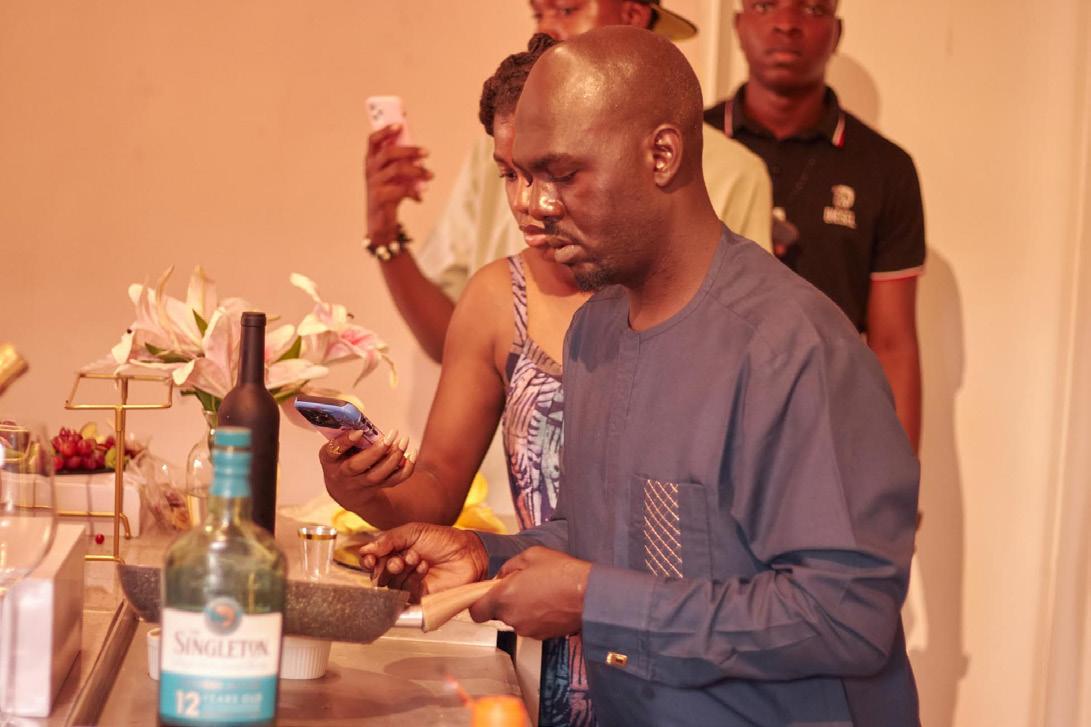
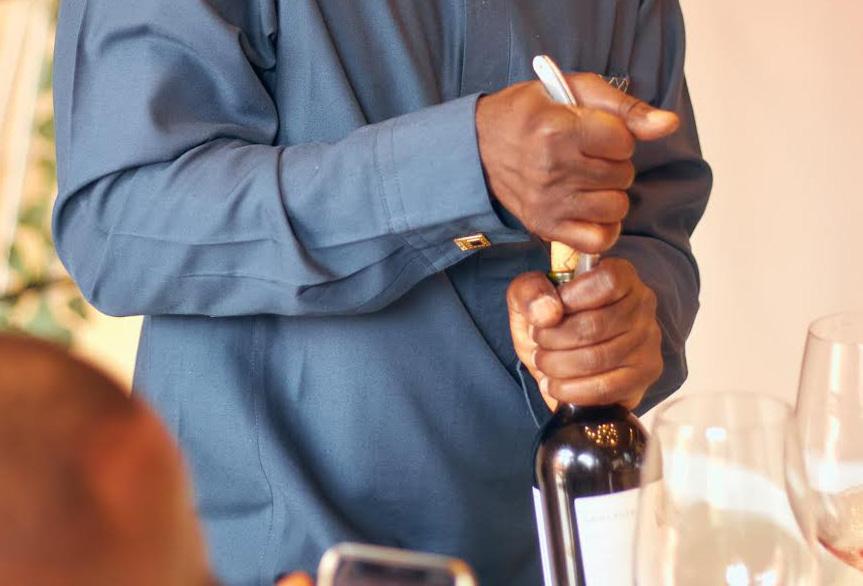



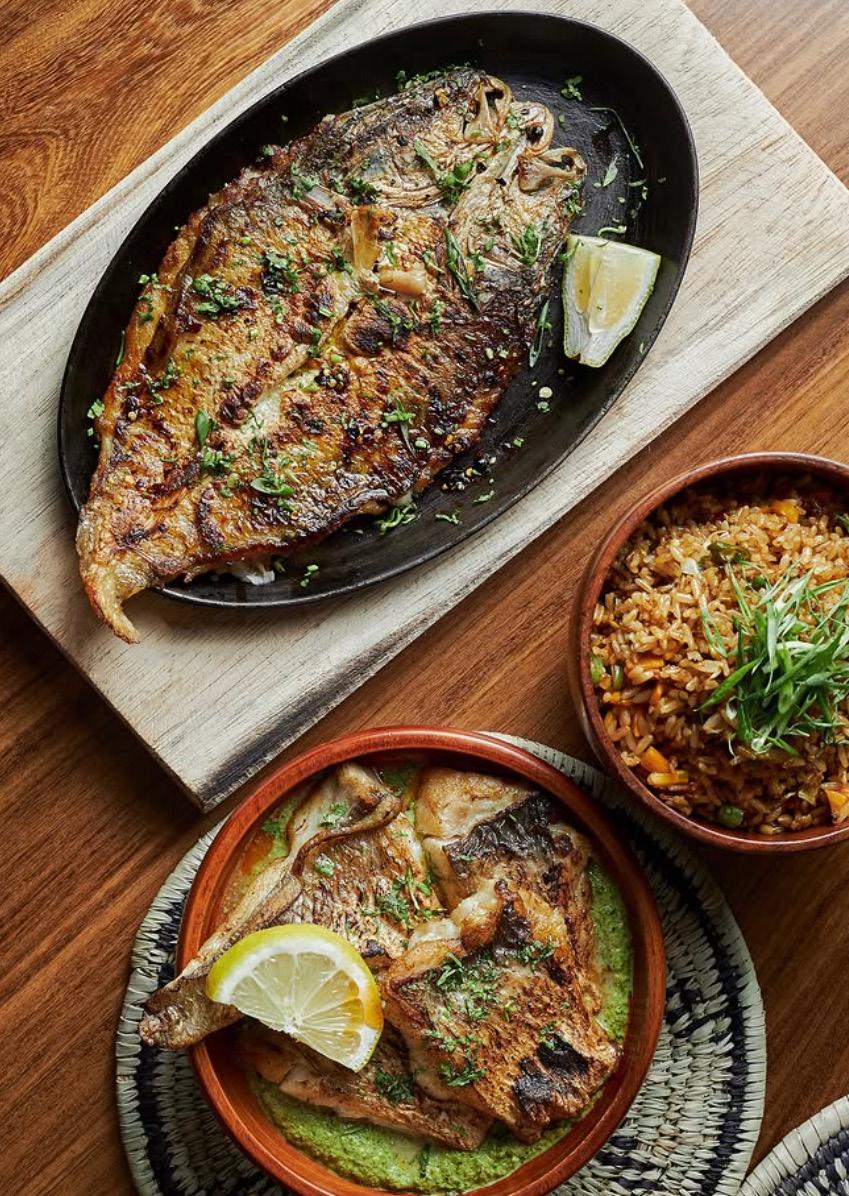

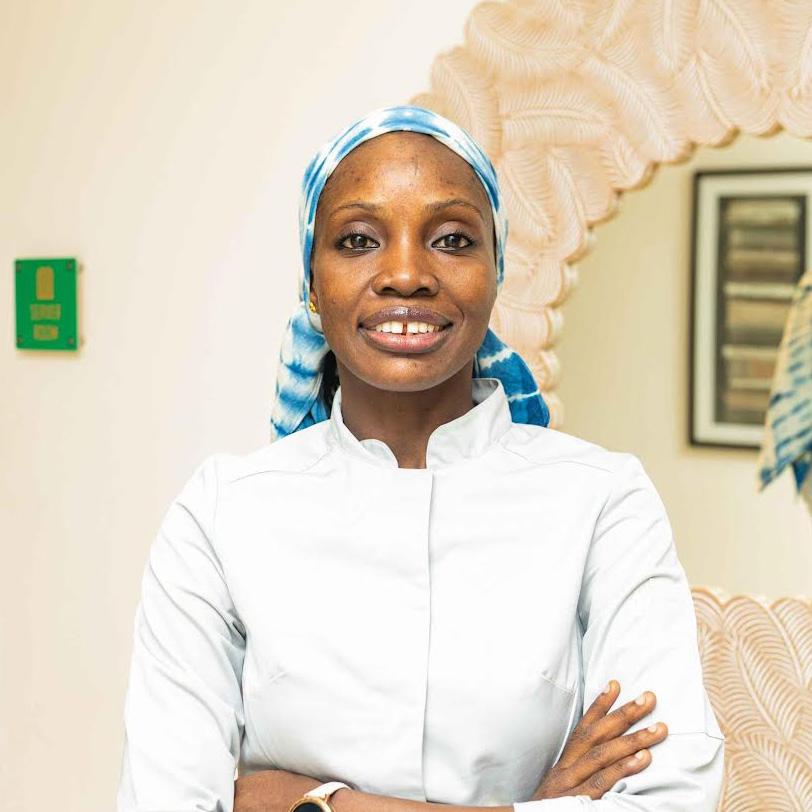
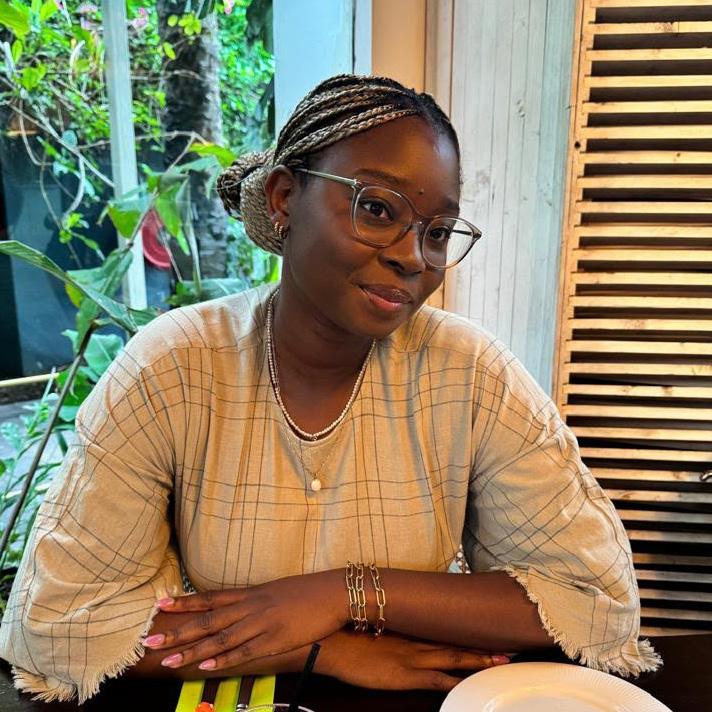
Fine food and wine can often feel exclusive, but at Supper Clubs, everyone is invited. These intimate dining experiences are the emerging sweet spot between fine dining and catering, happening in homes and pop-up restaurants across Lagos.
‘‘
Here guests dine communally, sharing meals as distinct and individual as the people seated. Food enthusiasts, local chefs, and food entrepreneurs get to connect with diners in a food and hospitality industry that can often feel impenetrable.
In the new era of dining in Lagos, inclusive is the new exclusive. The allure of the foreign and unobtainable now pales in comparison to the connection diners have with the locally sourced, the seasonal, and the story-driven.
I sat down to talk about the future of dining in Lagos with Chef Maryam Ahmed of Taste of Arewa, a bi-annual Supper Club experience that showcases the depth of Northern Nigerian
Adaorah: When did you first start running Supper Clubs?
Demilade: My first supper club was last August and it was mostly for my friends, but there was one person who had seen it on his social media and decided that it would be fun to attend. That was really exciting, that for the first one
cuisine, and Demilade Akingbe of My Friend’s House, a modern social club that curates a range of community-driven events, including Supper Clubs.
I had, there was one person there who had purely found it organically and wanted to join in. We do it less than once a month, maybe once every other month, or once every two months.
Chef Maryam: My first supper club was seven years ago. It

was a pasta club. I do homemade sauces, so I used to run supper clubs to highlight the sauces I made. Taste of Arewa started three years ago. Now I run two of these events every year, and we try to infuse northern fashion and culture to make it more interesting for everyone.
Adaorah: So why a supper club, as opposed to a restaurant, cloud, kitchen, or catering business?
Demilade: I think restaurants are either chef-led or investment-led. I think supper clubs allow you to gauge the zeitgeist, you see what’s going on, how people are feeling, and then what you can offer. For example, if you could have a restaurant open from October to December only, that would be great. There are lots of people in Lagos around that Art season till December, so if you could be open for just three months, or run your cloud kitchen in those three months, fantastic for you, and then you go off on vacation.
Chef Maryam: For me, it gives me time. I like to pace myself, and it gives me the convenience to do that. I don’t like the hustle and bustle as much as I like to cook. Northern Nigerian food also isn’t well represented in the Nigerian culinary landscape. I feel like a lot of people still think northern Nigerian food is unhygienic and not visually appealing. Aside from suya and masa, a lot of people are scared to try other things, so I like to share recipes. I don’t like the everyday life of cooking the same thing. I love changing things. I like to be spontaneous. I also like to be intentional in everything I do. I also love the creative process behind it. When you’re not in the kitchen, you have time to think.
Adaorah: What are some of the must-try dishes people leave the Supper Club recommending?
Chef Maryam: The Fura ice cream was something that I personally like. The flavors come from ginger, so when you’re eating it, there are bits of ginger in it, and there’s spice and sweetness and crunchiness. It’s not just the ice cream itself, there’s a Dublan cone. Dublan is a sweet from northern Nigeria made with flour. We use a pasta machine to roll it very
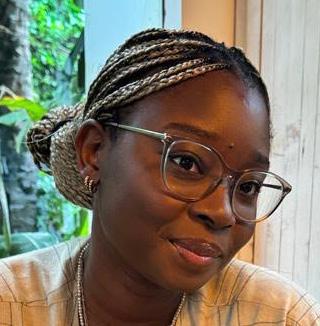
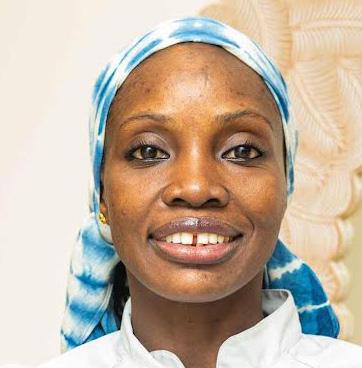
thin, and then it’s fried off and soaked in syrup, and we use it to make an ice cream cone for our ice cream.
Demilade: So a lot of our food is the continental basics, and I think the thing that’s gotten the most compliments has been my crispy calamari. I think it is less because it is the most fantastic thing on earth, and more because, if you compare it to crispy calamari you get in Lagos, usually it’s like, ‘okay, crispy calamari tastes like this, so why is it that when we go out, we’re getting something else?!’
Adaorah: What has changed the most from when you started running the supper clubs until now?
Demilade: I think something that I have learned is that there is an art to curating these events. I didn’t go to culinary school, and I’ve never worked in a kitchen, so a lot of this is learning on the fly as well. There’s an art to curating the menu and allowing people to go on a bit of a journey in it, and I think that that’s something that you don’t think about in the initial stage. The psychological marketing of it all, like steak and chimichurri and mashed potatoes, they look great together, but you have to put it together in a way that makes it more enticing than just steak with chimichurri and garlic mashed potatoes.
Chef Maryam: Over the last two years, it’s been a long journey, honestly, starting something with just passion, and then it’s leading you to purpose, because now you’re seeing that you have a lot of responsibility as a chef to ensure that, these foods are preserved– our local foods, our local recipes. We haven’t even scratched the surface of your food yet. Why are we forgetting some food? Why aren’t we trying to bring them into our new environments? In the last couple of years, I’ve had a lot of opportunities to travel to African countries and I’ve been able to take this role now more like an advocacy role, because we have to advocate for our own food. We need to ensure that the whole world is learning about this food, and is eating this food, not just for nourishment, but because the food itself tells our stories of resilience.
Demilade is a food entrepreneur, content creator, and the founder of My Friend’s House, a thriving social club dedicated to fostering community through curated gatherings. With a deep passion for food, hospitality, and bringing people together, Demilade has successfully hosted multiple gatherings cultivating a space where meaningful connections flourish. Beyond supper clubs, Demilade shares her culinary expertise through engaging content on TikTok, where she has built a growing audience passionate about food, culture, and storytelling. Whether through digital content or curated gatherings, she continues to shape how people gather and connect over food.
Maryam Ahmed, a seasoned Chartered Accountant with a remarkable 11-year journey in the Banking industry, who embraced a delectable twist in life to become a Private Chef. Her fascination with food ignited a bold decision of bidding farewell to the corporate world, and setting her sights on nurturing both her culinary passion and venturing into the realm of food sustainability. She is the founder of Mimies Homemade Sauces, a private catering company that also makes and packages homemade sauces, condiments and sausages in small batches. She is also a founder of Taste of Arewa, a food company that celebrates Arewa’s vibrant culture and resilience of the Northern Nigerian people.

A visit to Citizen, the latest resto-bar in the restaurant hub of Victoria Island.
The concept of Nigerian-style tapas evokes a very tasty question: how do you fit such big flavours onto such small plates? Luckily, Chef Duhalde, originally from Chile but now native to Lagos, is no stranger to challenges.
The head chef and owner of city staple La Taverna, and the short-lived but well-loved Rapa Nui, presents his latest offering: Citizen, a restobar in the heart of Victoria Island. With live music and a bar that stretches from the door to the stage, he invites diners to stretch their own preconceived notions of Nigerian food.
Start with the charred prawns basted in suya butter and
served over moi moi for another Latin American interpretation of beans and shrimp, similar to Brazilian acarajé.
The charcoaled grilled chicken wings finished with a pineapple and habanero glaze bring a daring twist to the classic sweet and spicy pairing that is unmistakably Lagosian.
Of course, no Nigerian meal is complete without rice. The Jollof served Al Ajillo, with lots of garlic, prawns and spring peas, is a decadent throwback to the Tantalizers Jollof that once had the nation by the throat.
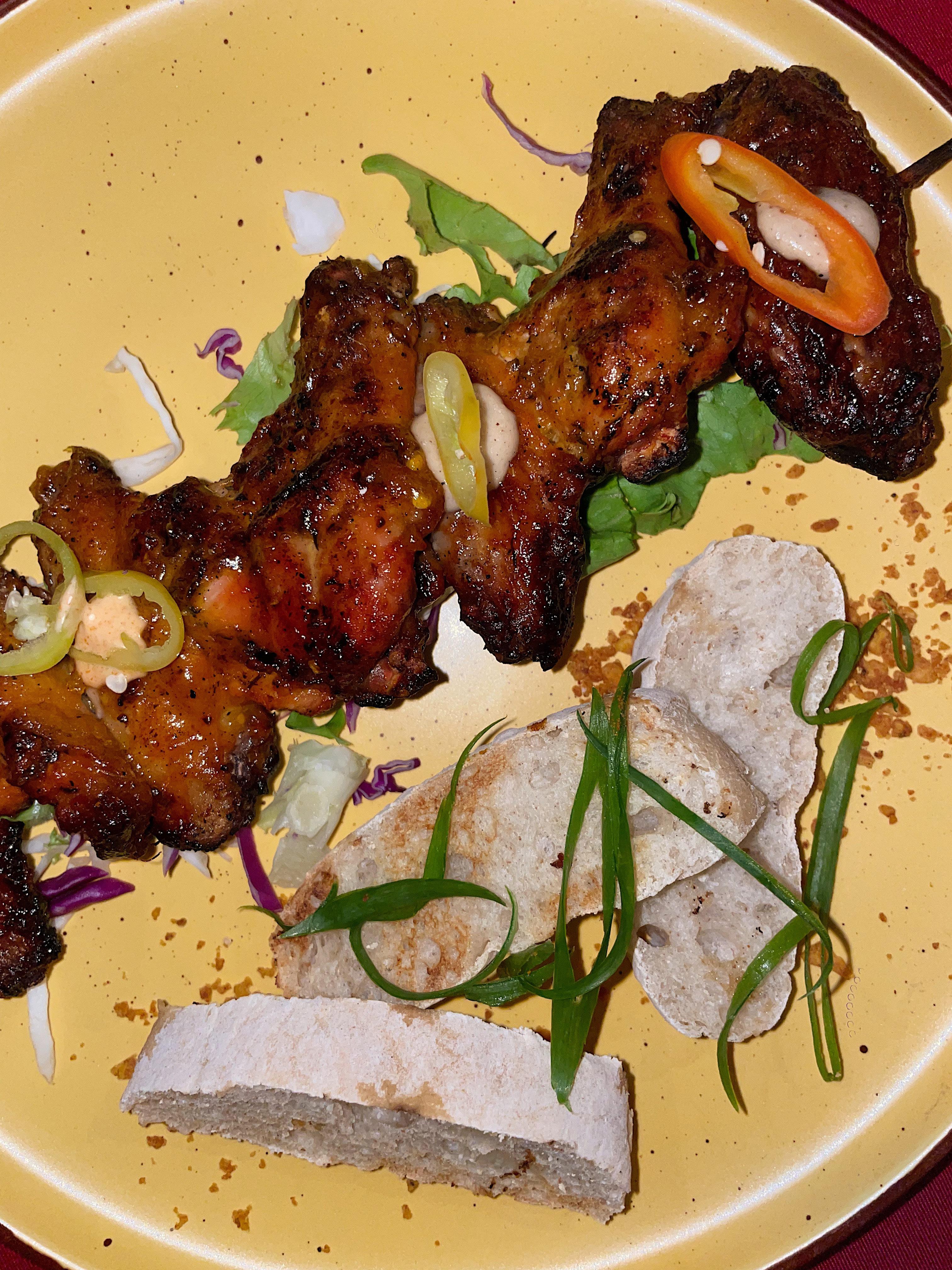
The menu connects the seafood-forward cuisines of the Chilean and Lagosian coasts. It’s food for the people, by a chef who has come to know and love cooking for them.
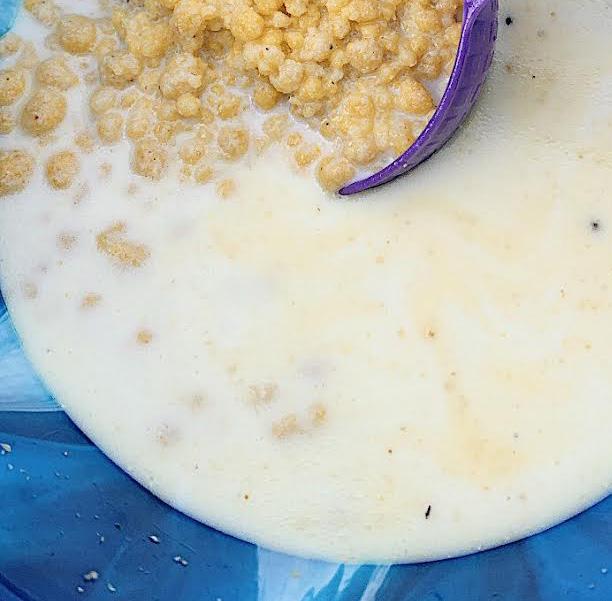
Ingredients
• 1 cup of Tiger nuts
• 4 cups of water
• Ice cubes
• ½ cup of Dates
• Black tea
Instructions
• Soak the tiger nuts in water for about 6 - 8 hours or overnight to make them easier to blend.
• Add the dates and blend together with the nuts and about 4 cups of water and adjust for the consistency.
• Pour the mixture into a bowl through a cheese cloth to separate the liquid from the fibre.
• Boba (tapioca pearls)
• Hibiscus cordial
• Additional sweetener to taste - agave, palm sugar, date sugar or other.
• Bring the milk to a gentle simmer and add the black tea, brewing for about 20 minutes.
• Add additional sweeteners to taste
• Boil the boba pearls for about 30 minutes and drain.
• Place the boba pearls at the bottom of the cup, top with ice, the cooled tigernut milk tea, and finish with a layer of the hibiscus cordial.
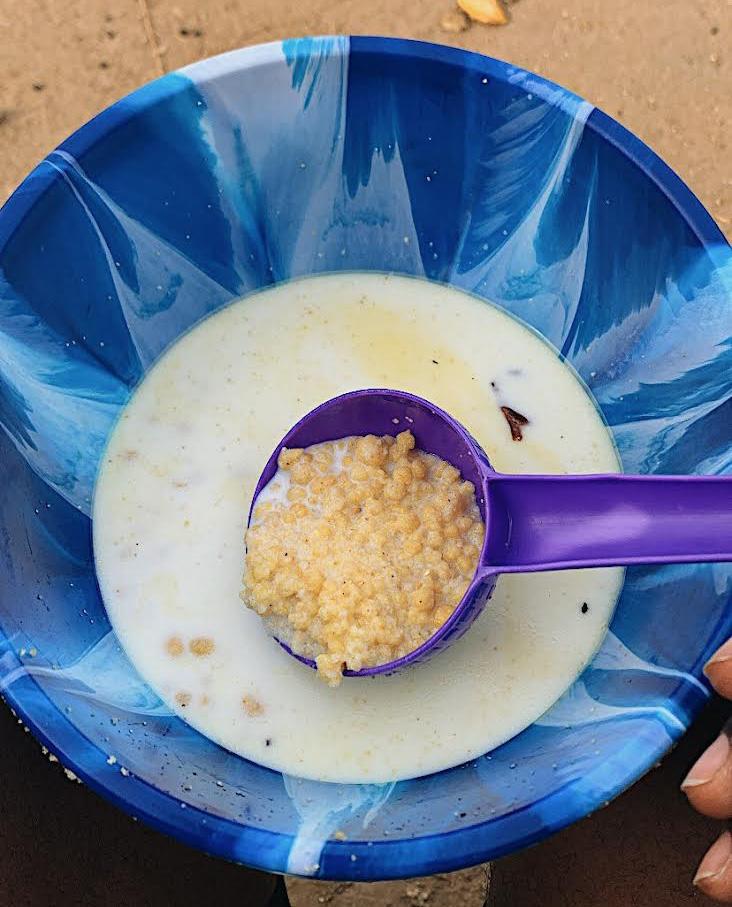

An exploration of the food scene in Los Angeles that highlights the diversity and fusion of flavors and the presence of Mexican food as a foundation
Spice, heat, and goat meat - a few of the many things Nigerian and Mexican cuisines share.
From 6:30 in the evening, the wheels of the El Flamin’ Taco truck finds their home on the corner of Wilshire and Vermont, a nook in the Koreatown neighborhood of Los Angeles. That portable kitchen housed in its signature red and yellow truck was responsible for the many plates of burritos, empanadas, and, of course, birria tacos that made dinners the best part of being a hungry but lazy grad student. These days, my taco cravings are satisfied at El Padrino right here in Lagos. Along with the fresh tortillas topped with chunky guacamole, I always get the goat meat tacos as a memento of the one thing that, to me, connects the food scenes of Los Angeles and Lagos.
With streets bedazzled in the neon lights of 24-hour diners, I discovered that food is to Los Angeles what casinos are to Las Vegas. It’s a place where a Mexican food truck in a Korean neighborhood of an American city is a regular Tuesday night. The culinary scene reflects centuries of migration, an agricultural industry valued in the billions, and the many people who keep its residents well fed.
In a city that was once part of Mexico, the food scene is not a melting pot of flavors but rather a sizzling skillet that has retained the aromatics of meals cooked in immigrant kitchens from across the world so that every cuisine is sprinkled with hints of another. Countries typically worlds apart find common ground in plates piled high with history and innovation, cuisines converge constantly, and fusion exists as the norm. It was here that I tried my first pupusa, the fresh flatbread from El Salvador made from cornmeal and stuffed with pulled pork and cheese. It was also here that I took several buses from downtown to Inglewood in south L.A. in search of Veronica’s Kitchen for some jollof rice that tastes like home. Los Angeles might be a food Mecca, but in this gathering, Nigerian food is still few and far between.
On the cast iron pan where the many worlds of Los Angeles collide, the flavors of African food have long been overpowered by preferences for cuisines that are easier to exoticize for American consumption. Despite California being home to one of the largest populations of Nigerians in the U.S., there are only

about five Nigerian restaurants in the city, and most of them are a distance from downtown.
Today, that story is slowly changing, and West African chefs are finding their seat at the table. In New York, there are spots like Teranga, opened by Senegalese chef Pierre Thiam, or the fastcasual spot Chop ‘n’ Block located in Houston and run by chef Ope Amosu. Now, chefs like Amosu and Kwame Onwuachi can make guest appearances on Top Chef, where they introduce contestants and audiences to West African food outside of the generic jollof. While Nigerian food is gaining presence in the American food scene in general, if there’s anywhere it really has the potential to thrive, it’s L.A.
Originally a part of Mexico until 1848, Los Angeles retained its Spanish origins with a name that translates to ‘City of Angels’. When California, its home state, was ceded to the United States by treaty in the aftermath of the Mexican-American War, it became a part of America and the culinary foundation of food from the country’s west coast. Regional and flavorful, Mexican food is the mother dough of Los Angeles cuisine. Much like Chinese cuisine or Indian, it is a plate that makes space for the bold flavors typically classed as ‘ethnic’. Like Nigerians, Mexicans are not afraid of spice, heat, or goat meat—the staple ingredient in the birria tacos that took TikTok by storm.
In L.A. you can have the world in a taco. All over the city are creations like kimchi quesadillas, a sour and spicy dish of tortillas filled with pickled Korean cabbage, or sushi burritos that roll Japanese flavors in Latin American technique. The modest tortilla has housed many of the new flavors that have come looking for a home in the culinary capital of the West Coast.
It connects cultures and cuisines and stands as evidence that taste is always acquired. When I reminisce on birria tacos washed down with cool horchata, the drink made with rice milk and sweetened with cinnamon, I imagine a future full of tacos that fuse Nigerian flavors and techniques. A future of Asun tacos, burritos stuffed with savory jollof rice and salsas that combine the heat of Yaji with the fresh tang of pico de gallo. A future where tasty slices of home are tucked in between tortillas that bring my two favorite cities together.

Vladimir Oyibode-Olokpa Founder, IKUEGBE | Sous Chef, ÌTÀN Test Kitchen

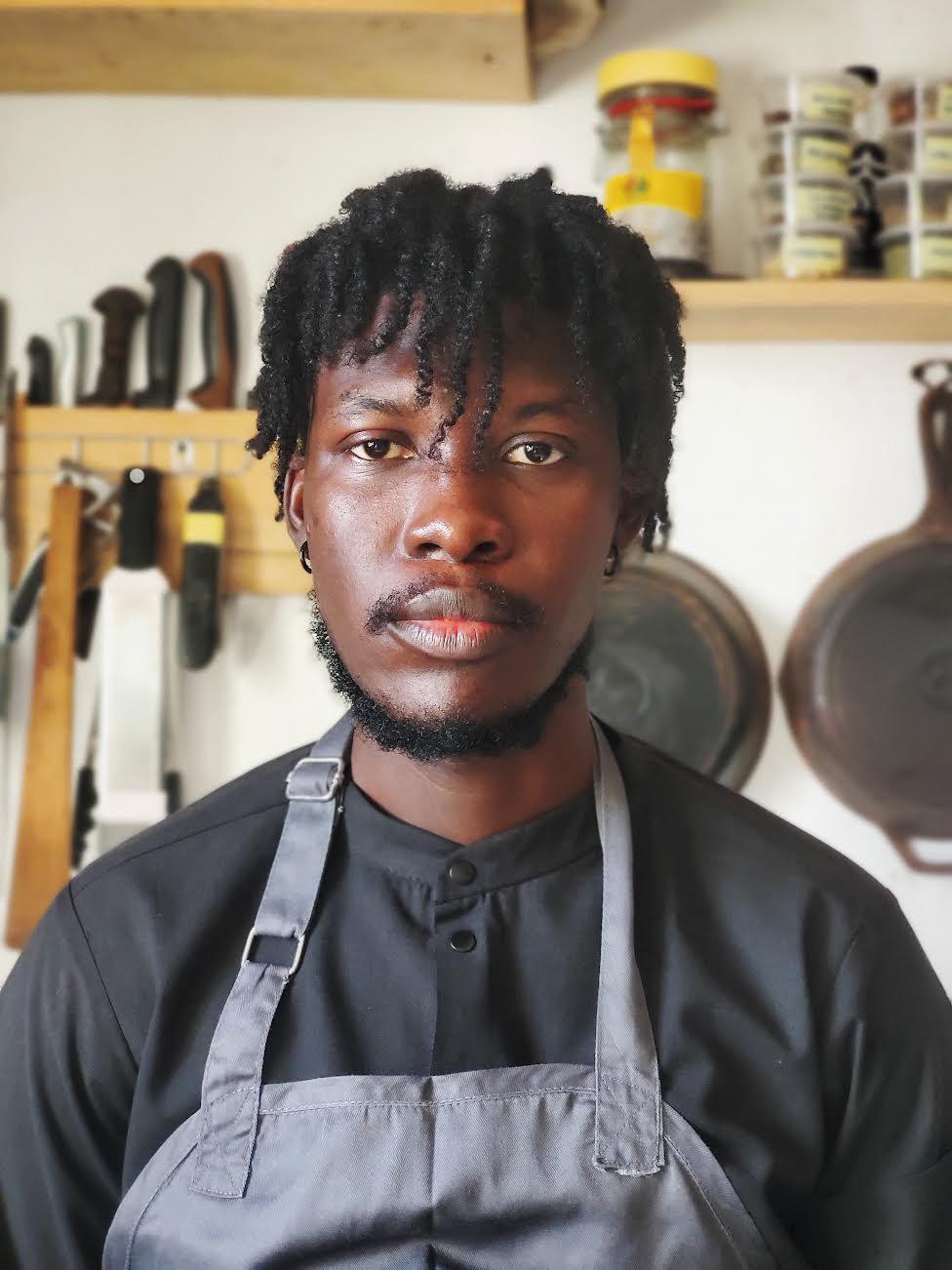
On a recent journey through the rural heartlands of Niger State—specifically Tegina, Pandogari, and Mariga—I embarked on a culinary exploration to uncover the diverse uses of indigenous ingredients across Nigeria. These areas, home to a rich tapestry of ethnic groups including the Kamukus, Nupes, Hausas, Fulanis, and Yorubas, offered a fascinating window into foodways rooted in culture, sustainability, and tradition.
Driven by curiosity, I set out to understand the traditional processes behind every day cooking fats and condiments— essentials like Dawadawa (fermented locust beans) and ManKadai (shea butter extracted from shea fruit). My journey led me deep into a Kamuku settlement, where I discovered a remarkable dish called Dami
Dami is a beautiful example of culinary sustainability, made by repurposing day-old Tuwo Masara—a gelatinous meal made from white corn flour—into a comforting pudding. It is served in two distinct ways:
Savoury: The leftover Tuwo is softened in water and eaten with garden eggs, dipped in yaji (a peppery spice blend), and accompanied by rich Umami of dawadawa.
Sweet: The Tuwo is transformed with milk, sugar, and seasonal fruits such as mangoes, coconuts, and bananas—a combination reminiscent of cold oatmeal but uniquely local in flavor and texture.
Later, in a Fulani community, I encountered a variant known as Dambu Dami. This version uses coarsely cracked yellow corn kernels that are steamed, sautéed in Mashanu (local ghee), and then served in fresh, warm Madara (cow’s milk)—a delicacy often reserved for welcoming guests.
What struck me most was the ingenuity in how maize is used across different cultures—not only as a staple, but as a base for flavor-packed, nourishing dishes that reflect resourcefulness, hospitality, and deep-rooted culinary wisdom.

By Berg Robert Baboyan
Step 1: MIX IT UP
Create 5 bold, colorful cocktails and give each a ridiculous name like:
“Hot Mess Express” – Whiskey, ginger, honey, lemon
“Fierce Fiesta” – Tequila, lime, chili, pineapple
“Drama Llama” – Vodka, cranberry, lime, mint
“Saucy Sunset” – Rum, orange, grenadine, bitters
“Glow Getter” – Gin, cucumber, elderflower, lemon
Step 2: PICK YOUR FATE
Each player picks a number (1–5) and gets that cocktail.
Step 3: DARE OR DRINK
Draw a card (or paper slip) with a truth or dare.
Examples include:
Dare: Send a flirty emoji to your last DM
Truth: What’s your most unhinged 3am craving?
Dare: Walk the room like it’s a runway in slow motion
Truth: Spill the last person you stalked online Dare: Do a dramatic reading of your last text convo
Truth: Reveal your go-to guilty pleasure drink
❌ Don’t want to answer or do it? Finish your drink!
Step 4: SIP & SLAY
Complete the challenge, sip your cocktail like a legend.
Step
Play continues until everyone’s had a turn or you’re out of dares… or sobriety.

Curated to match the chaos, confidence, and cheeky vibes of the night:
“Truth Hurts” – Lizzo

“Savage Remix” – Megan Thee Stallion ft. Beyoncé
“Don’t Start Now” – Dua Lipa
“Juice” – Lizzo
“Say So” – Doja Cat
“Peaches” – Justin Bieber ft. Daniel Caesar, Giveon
“ROXANNE” – Arizona Zervas
�� BONUS ROUND: BALANCE–A Cocktail for the Soul. Low-maintenance. High-reward. Berg-style simplicity in a glass.
✨ COCKTAIL: BALANCE
A stripped-back, no-tools-needed cocktail for when you’re chillin’ at home and need something that just works.
Ingredients:
1. 50ml base spirit (vodka, rum, gin, or whisky)
2. 1 tablespoon sugar (any kind works)
3. Juice of half a lemon
4. A splash of water or Juice
5. Ice (optional)
Method:
1. Use any clean glass or jar.
2. Add spirit, lemon juice, sugar, and water/ juice.
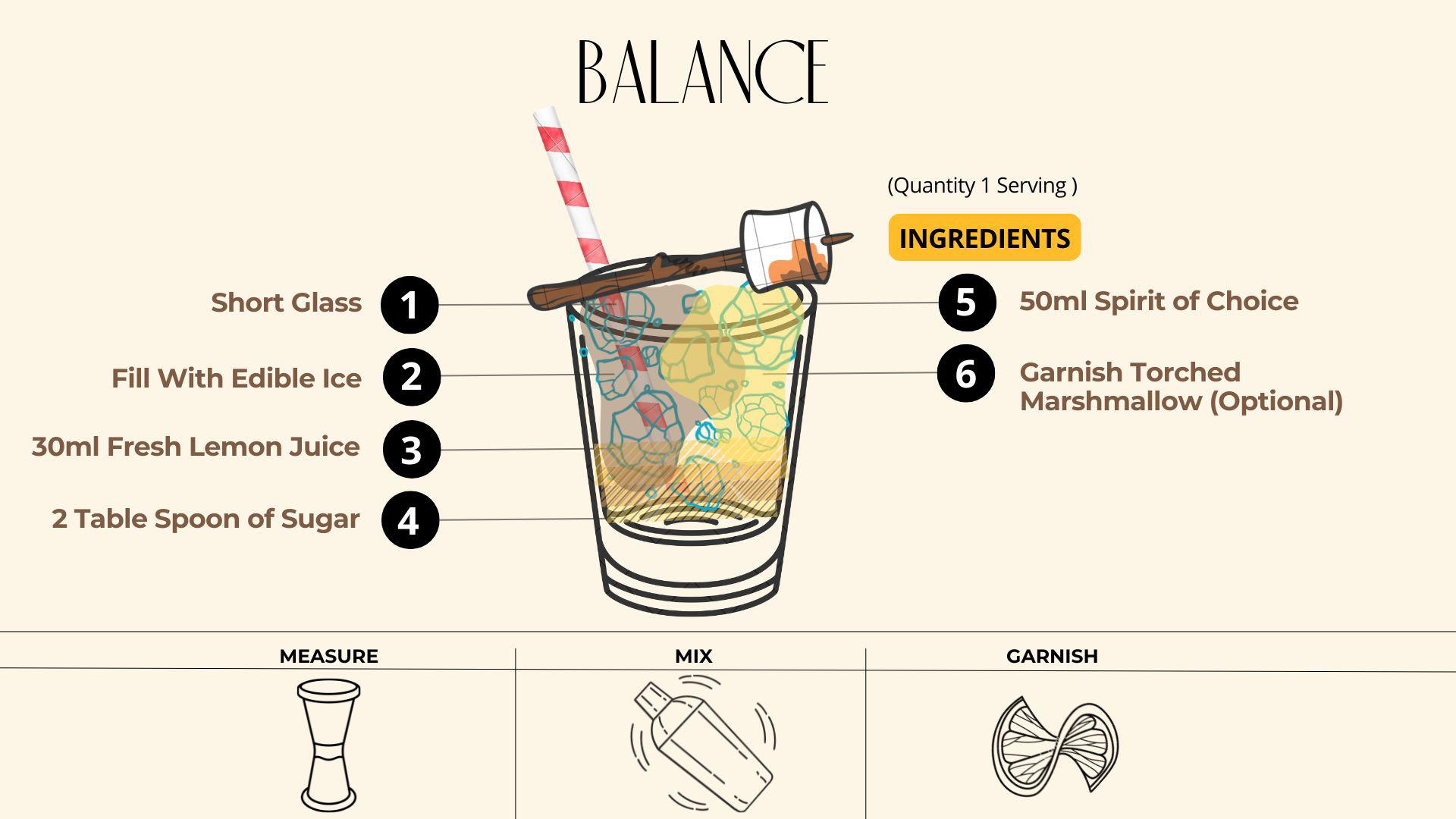
3. Stir with anything (a spoon, straw, chopstick — go wild).
4. Adjust to taste: more sugar for sweet, more water for mellow.
5. Add ice or chill if you like.
6. Sip slowly and feel the balance return to your soul.
�� Best paired with: “Peaches” – Justin Bieber ft. Daniel Caesar, Giveon
�� WHY YOU’LL LOVE THIS NIGHT
Truths get deeper. Dares get weirder. Drinks get better.
Easy setup, big laughs, unforgettable chaos. Pairs perfectly with sweatpants, oversized tees, and too much confidence.
Designed for wild hearts and honest conversations.
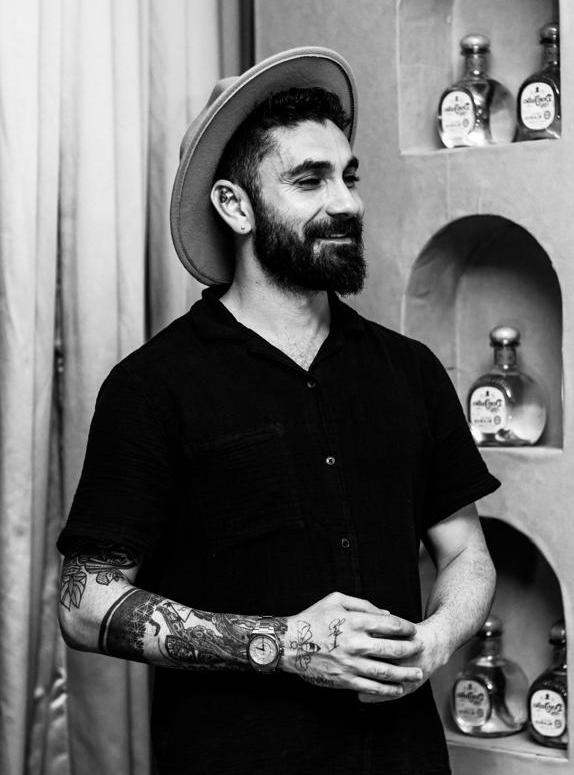
MEET YOUR HOST: Berg
Robert Baboyan is a visionary mixologist and the founder of BarMechanics, renowned for transforming Nigeria’s beverage scene with his multicultural flair and technical artistry. From his pivotal role at Diageo Nigeria to crafting bespoke programs for Lagos’s top venues, Berg creates unforgettable cocktail experiences. He is a pioneer in the Ready-to-Drink space and a dedicated mentor, consistently pushing the boundaries of cocktail culture across the continent. Baboyan crafts experiences that turn any night into a memorable occasion.


Kehinde Omosowoeni Mixologist, Kenizmix


Bio
Kehinde Omosowoeni - AKA Kenizmix, is your friendly neighborhood bartender. He is a renowned mixologist with a passion for creating exceptional beverage experiences. Using bartending as an art and an opportunity to inspire, he “lives to inspire positively”
With extensive experience in the bar and hospitality industry, he excels in crafting innovative cocktails, developing beverage programs, and providing expert consultancy. He has been featured on TV shows and involved in major festivals and events. Kenizmix has served as the chief mixologist for numerous international beverage brands.
Zobo is a classic non-alcoholic Nigerian beverage made from dry Hibiscus not so different from the delicious Hibiscus Margarita cocktail.
Both have the common ingredient – “dry hibiscus” and are made in different ways.
So I decided to create my own hibiscus margarita having that delicious...smokie, aromatic spice & a sweet and sour, subtly flavor
Ingredient
50ml - Reposado tequila
20ml - Triple sec
15ml - Homemade Cinnamon syrup
15ml - fresh lime juice
5 pieces toasted Cloves
2 slices fresh ginger
Dry hibiscus flower
Pinch of salt
Instructions
Muddle the fresh ginger, dry hibiscus flower and jasmine tea. Add in freshly squeezed lime juice, some homemade cinnamon syrup, triple sec, toasted Cloves and a pinch of salt with Reposado tequila.
Shake well and pour over a hand craft ice ball in a cocktail glass. Garnish with homemade hibiscus tea sugar crystal candy globe.

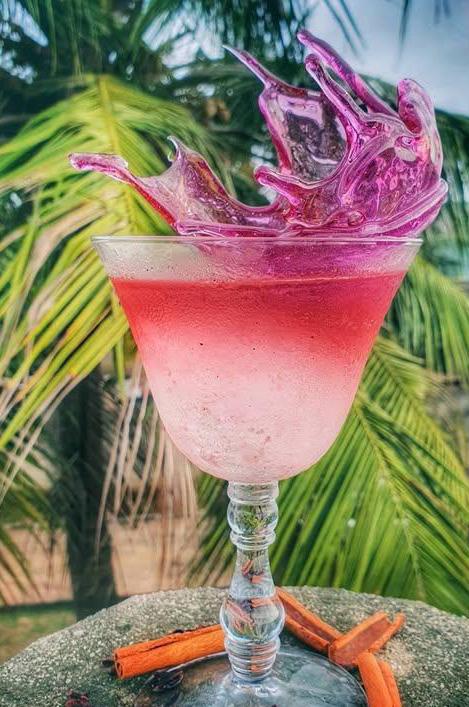

By Obanya Chinedu Victor Mixologist

Bio
Obanya Chinedu Victor also known as the (BARCHEF), is a multiple award winning mixologist, based in Lagos Nigeria. He is a hard working and focused mixologist, who dedicates his time and passion to honing his craft and letting the hard work pay. He is currently working as the beverage manager for rsvp, slow and Vici Lagos.
Savour the Flavors of Nigeria with the Caramelized Pineapple and Sage Cocktail.
This is a unique cocktail that blends traditional ingredients with modern techniques. With a base of Tequila Resposado, this cocktail is elevated by the rich sweetness of caramelized pineapple and all the ingredients come together nicely to earn its name.
Ingredients
6cl Tequila Resposado
5 Chuks caramelize pineapple
2.5cl Lemon juice
2.5cl Pineapple juice
5cl Caramelized sauce
1 Drop saline solution
4 Drop fee former
300g Fresh pineapple
5g Crushed black pepper
100g Sage leaf
300g Brown sugar
150g Water
5cl Tequila Resposado
Glassware: clay cup
Garnish: dehydrated pineapple/ sage leaf
PINEAPPLE and SAGE
PREPARATION
Instruction:
Add in a sous vide bag vacuum and place in a sous vide machine for
about 55degree for 3 hour after which take it out then into a pan add the pineapple and add brown sugar allow to caramelize for 20 mins after which add don reposado tequila and then take it off the heat allow to rest and then transfer into a jar.
Cocktail
Instruction:
1. In a shaken, muddle 5 chunks of caramelised pineapple and then add all other ingredients into it.
2. Add ice and shake vigorously, then double strain into another shaken and dry shaker.
3. Pour into a clay cup filled up with crouch ice.
4. Garnish with dehydrated pineapple and sage leaf.

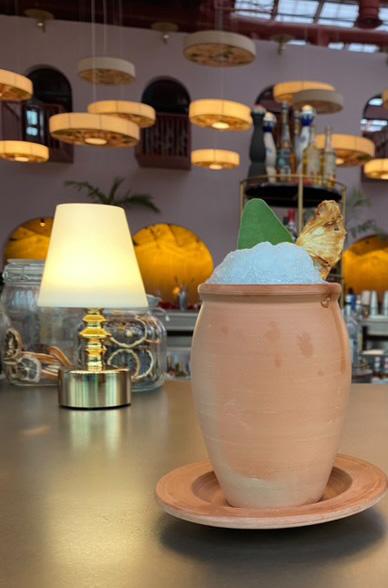


Interview Chef Britty Founder & Head Pastry Chef, Utó Confectionery

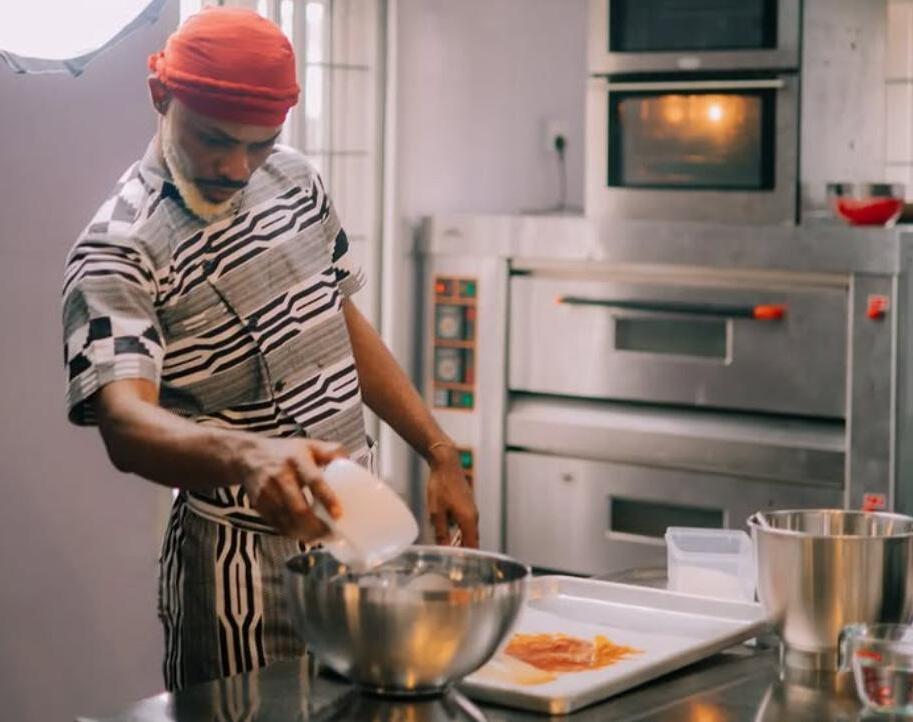
Chef Britty, we absolutely love you. Thank you for agreeing to be a part of this.
Thank you so much. It’s an honour to be featured on Lost in Lagos Plus Magazine, a platform I respect deeply for how it tells food stories in a way that’s current, conscious, and beautifully Nigerian.
What inspired all of these? How did you get into the industry?
My first love was art, and then food. I actually thought I’d become an architect. I was obsessed with form, structure, and the way shapes speak to each other. But the moment I discovered pastry—real pastry, the kind that demands precision and rewards creativity—I knew I’d found the perfect medium. It was the best kind of marriage: art and food, structure and emotion, all in one edible form. I entered the food world out of curiosity, but what made me stay was purpose.
I got tired of seeing pastry treated like a foreign concept, something we had to import, aspire to, or imitate. Why couldn’t patisserie reflect us? Our culture, our flavours, our rhythm? So I trained. I studied. I pushed. And I began telling stories through sugar and structure, stories that feel like home. My work is rooted in heritage but styled with intention. At the heart of it, I’m just an artist who decided that cake was a louder way to speak.
Nigerian palates are evolving; from classic desserts to plated
innovations. How would you describe the current appetite for pastry in Nigeria?
Meet Chef Britty, also known as Obiefule Lawrence Kelechi, the founder and head pastry chef of Utó Confectionery. This visionary Nigerian culinary artist blends tradition, memory, and modern aesthetics to create high-end, culturallyrooted pastries and wedding cakes. Chef Britty’s visually captivating and deeply nostalgic desserts, crafted with local ingredients and stories, have established him as a leading pastry innovator, culinary consultant, mentor, and educator.
We’re at a very exciting time. There’s a growing hunger, not just for sugar, but for sophistication, narrative, and cultural relevance. People want desserts that look like art but also feel familiar. They want to be surprised, but they also want to be seen. The appetite is there. The audience is more open than ever, and they’re no longer just eating with their mouths; they’re engaging with their eyes, their memories, and their social media feeds haha! especially the social media feeds.
Your work is known for its artistry. What’s your creative process when developing a new pastry, from concept to plating?
It usually starts with a question or an emotion. What am I trying to say with this piece? Am I invoking a childhood memory, honouring a tradition, or challenging an assumption? From there, I start building backwards: from flavour to texture to form. I research, sketch, test, and re-test until I find the right balance

between beauty and flavour. I don’t believe in doing something just because it looks nice. Everything must earn its place on the plate. Plating, for me, is the final punctuation mark in the story.
Food is often seen as memory. Is there a dessert you’ve created that is a personal ode: to a place, a person, or a moment?
Yes, many times. But one that stands out is my Ukwa Mousse. That dessert is an ode to my roots in the southeast, to the bowls of boiled breadfruit shared at home, to the soft quiet of evenings after rain. Turning that humble, often overlooked seed into a plated dessert was my way of honouring its place in my story—while also challenging what people imagine when they think of “dessert.”
You’re one of those championing Nigerian patisserie. What would it take for us to become a true destination for patisserie? What structures, policies, or platforms do you think need to exist?
First, we need better culinary education, one that’s contextualised, not copied and pasted. We need platforms that centre Nigerian voices and ingredients, not just replicate French or American models.
Policy-wise, easier access to equipment and more support for small-scale food entrepreneurs would go a long way. But most importantly, we need belief. We need to believe that our ingredients are enough, that our stories are worth telling, that excellence doesn’t have to come in imported packaging.
We’re all about local flavours. What’s one underrated Nigerian ingredient you think the world should know more about?
Fermented locust beans—Iru. People think it’s just for soups, but it has incredible umami. I once used it in an ice cream, and it won an award for Most Controversial Recipe of the Year. That tells you how much we’ve boxed ourselves in. There’s gold in our pantries. Iru is just one of many ingredients with global potential if we treat it with the same respect we give to vanilla or miso.
You’re not only a chef but also an educator. What do you want your students, and Nigeria’s next generation of pastry chefs, to carry forward?
I want them to be curious: to question norms, challenge templates, and know that pastry is more than sugar and decoration—it’s language, identity, and legacy. I want them to carry forward excellence without mimicry, and to build things that last. Most importantly, I want them to be bold. The world is waiting for Nigerian pastry chefs who are not just technically skilled, but culturally grounded.



There’s a growing hunger, not just for sugar, but for sophistication, narrative, and cultural relevance. ‘‘

By: Matildah
Digital Marketing Executive, Lost in a City
Nigerian chefs are globally recognized for their culinary innovation, masterfully blending traditional Nigerian flavors with modern techniques to deliver extraordinary dining experiences. This list highlights ten remarkable restaurants where Nigerian chefs are showcasing and elevating West African cuisine to international acclaim.
Chishuru
Chef Adejoké Bakare’s Chishuru offers a modern take on West African cuisine in the heart of Fitzrovia. As the first Black woman in the UK to earn a Michelin star, Bakare’s dishes, like her renowned banga fish stew, showcase expertly balanced spices and flavors that celebrate her heritage.
1
London, UK
IG: @Chishuru
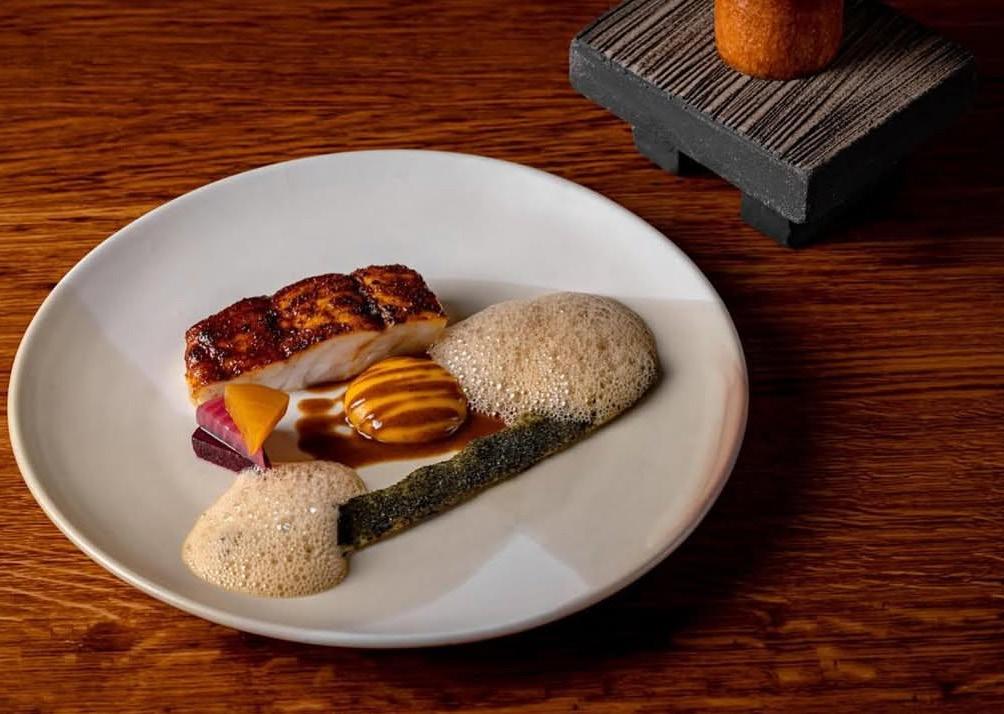
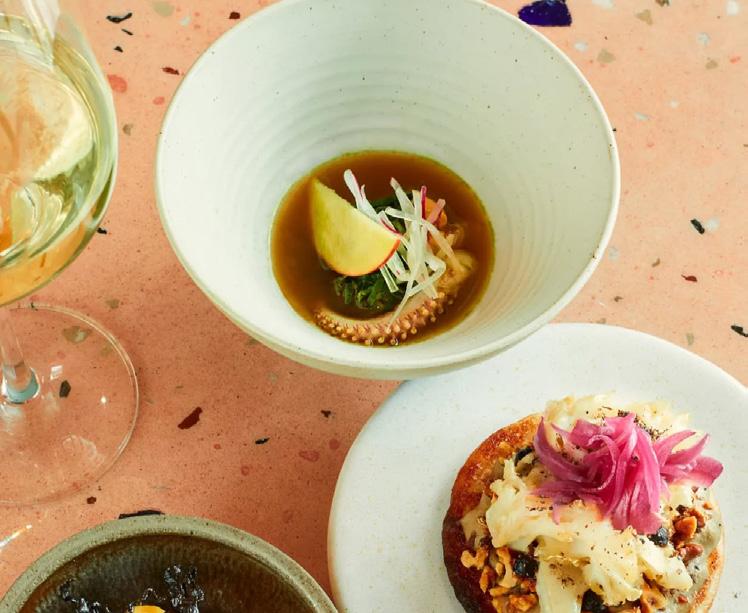
Co-founded by Jeremy Chan and Iré Hassan-Odukale, Ikoyi presents an innovative interpretation of West African flavors. Known for its signature smoked jollof rice, the restaurant has earned a spot among the world’s 50 best restaurants, highlighting its unique culinary approach.
London, UK
IG: @Ikoyi_london
3
Aji Akokomi’s Akoko brings the rich tapestry of West African cuisine to London’s fine dining scene. With a Michelin star to its name, the restaurant offers a tasting menu that takes diners on a flavorful journey through dishes inspired by Nigeria, Ghana, and Senegal.
London, UK
IG: @Akokoresturant
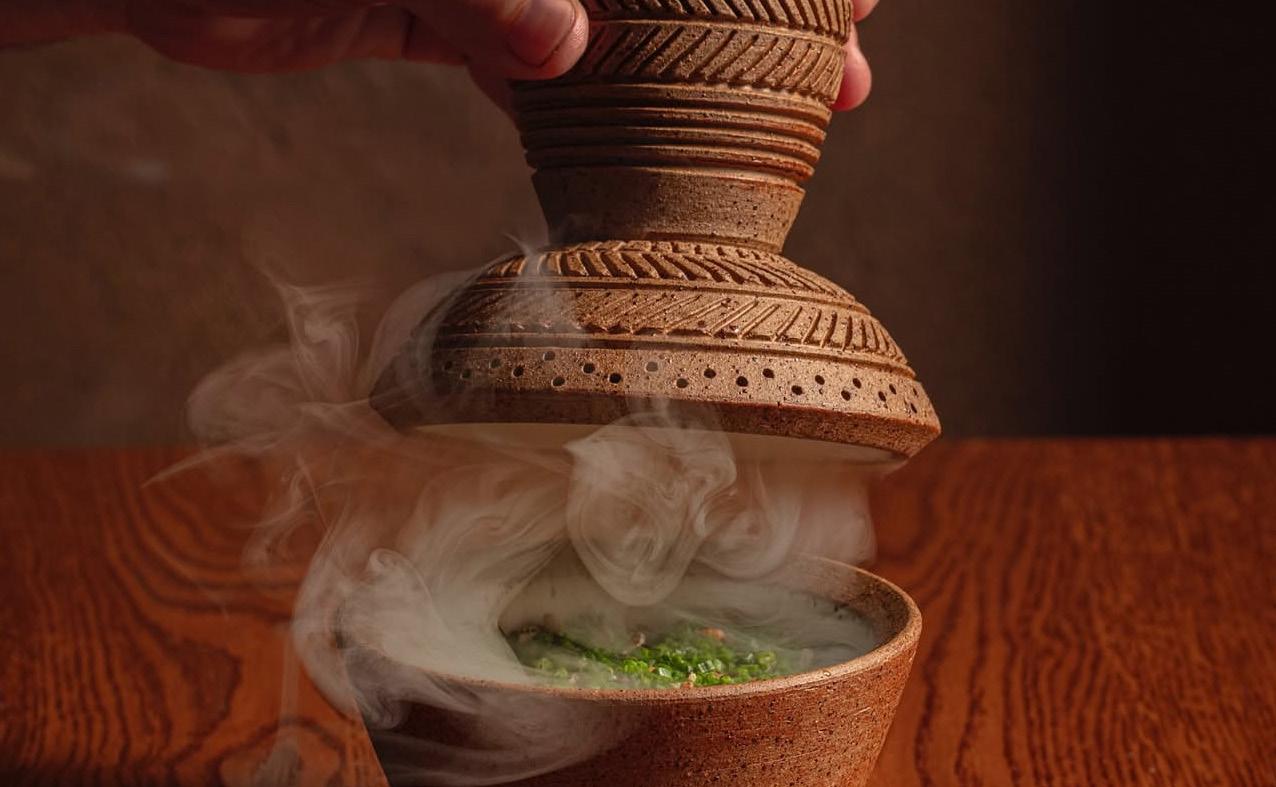
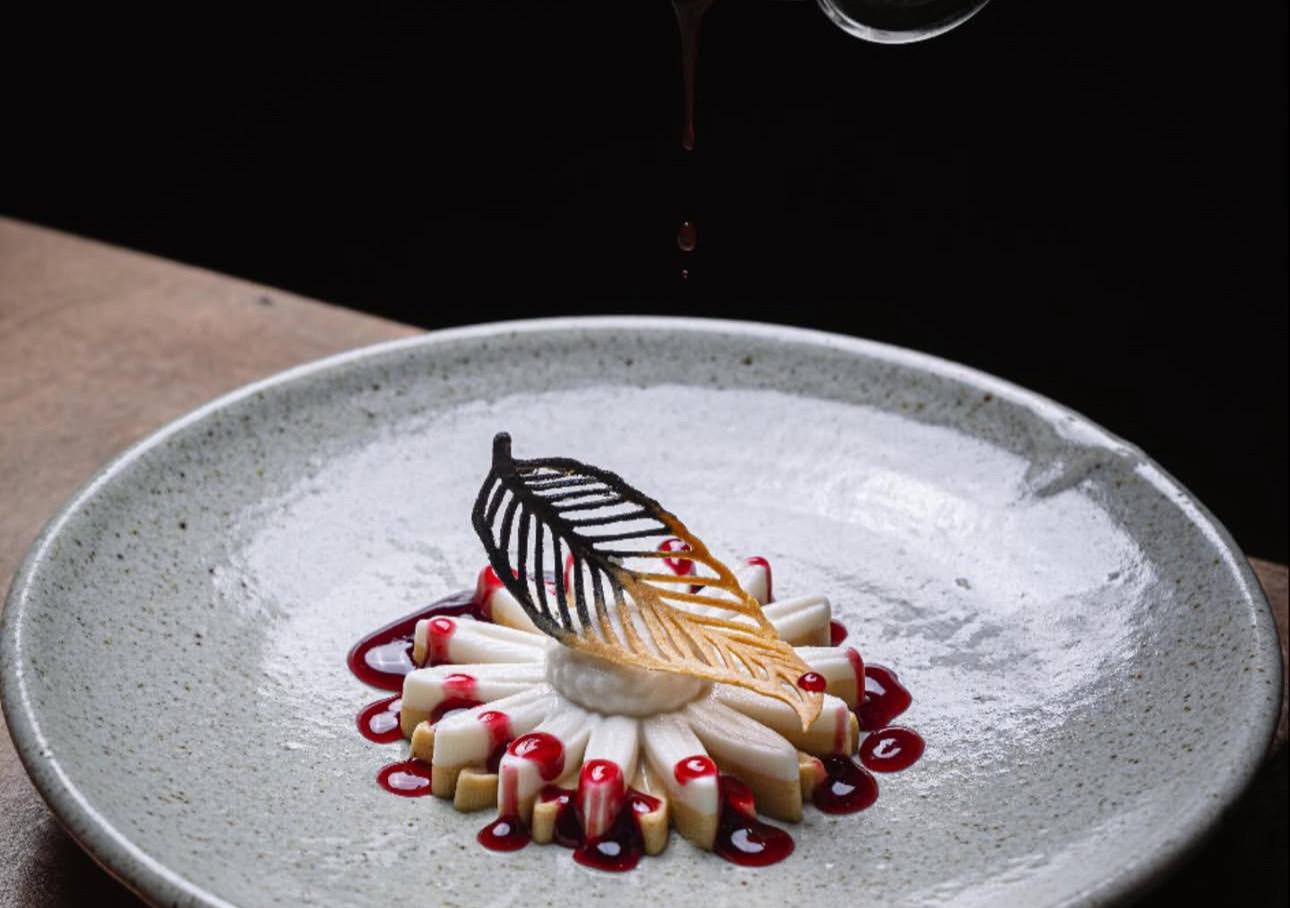
Chef Stone’s The Burgundy is a reservation-only fine dining restaurant that offers a unique 7-course pan-African menu. Emphasizing a farm-totable approach, the restaurant delivers an immersive culinary experience that celebrates the continent’s diverse flavors.
Abuja, Nigeria
IG: @Theburgundyng
4

Chef Tayo’s Club is a unique dining series that combines the communal essence of “Ebi” (family in Yoruba) and the joyous spirit of “Ayo” (meaning joy or happiness) to provide guests with a memorable culinary journey. The five-course familystyle menu blends Chef Tayo’s Nigerian heritage with Italian influences, creating an evening where communal dining meets culinary artistry.
Los Angeles, USA
IG: @Ebiayosupperclub

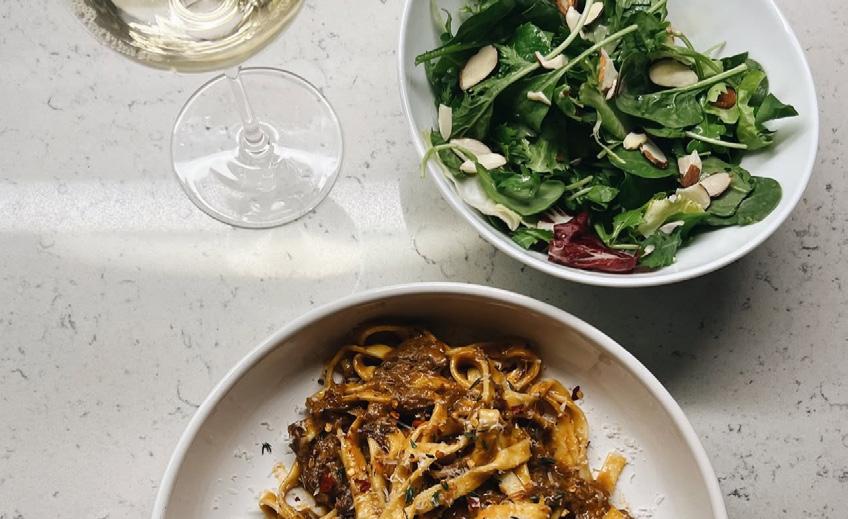
Chef Moyosore Odunfa-Akinbo’s Atije Experience curates fine dining events that showcase the best of West African cuisine. Through intimate multicourse tasting menus, guests are invited to explore the rich flavors and culinary traditions of the region.
Lagos, Nigeria IG: @Atijeexperience
Founded by sibling duo Ifeyinwa and Emeka Frederick, Chuku’s is the world’s first Nigerian tapas restaurant, located in Tottenham, London. The restaurant offers a modern twist on traditional Nigerian dishes, serving them in a tapasstyle format. The menu caters to a variety of dietary preferences, including vegan, vegetarian, and gluten-free options.
London, UK
IG: @Chukusldn
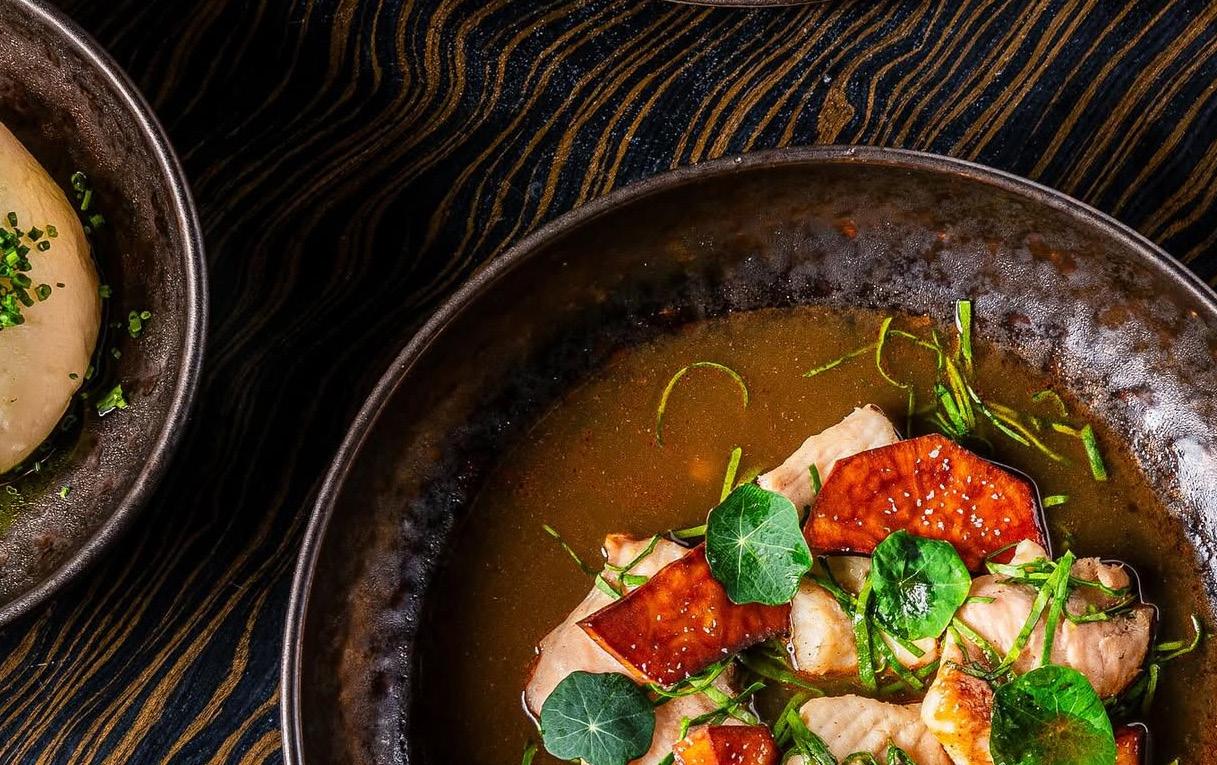
Chef Kwame Onwuachi’s Dōgon is an Afro-Caribbean restaurant situated in the Salamander Hotel in Washington, D.C. The menu draws inspiration from Onwuachi’s Nigerian, Jamaican, Trinidadian, and Creole heritage, offering dishes like coconut mussel curry and jollof rice. The restaurant’s name honors the Dogon tribe of Mali and reflects a commitment to storytelling through cuisine.
Washington, DC, USA | IG: @Dogondc
Chef Adebola Adeshina’s The Chubby Castor is a fine dining restaurant located in a 400-year-old thatched building in the village of Castor, Cambridgeshire. Adeshina, who trained under renowned chefs like Gordon Ramsay, offers a menu that blends classical techniques with modern flavors. The restaurant has been recognized by the Michelin Guide for its exceptional cuisine and inviting atmosphere.
Cambridgeshire, UK | IG: @Chubbycastor
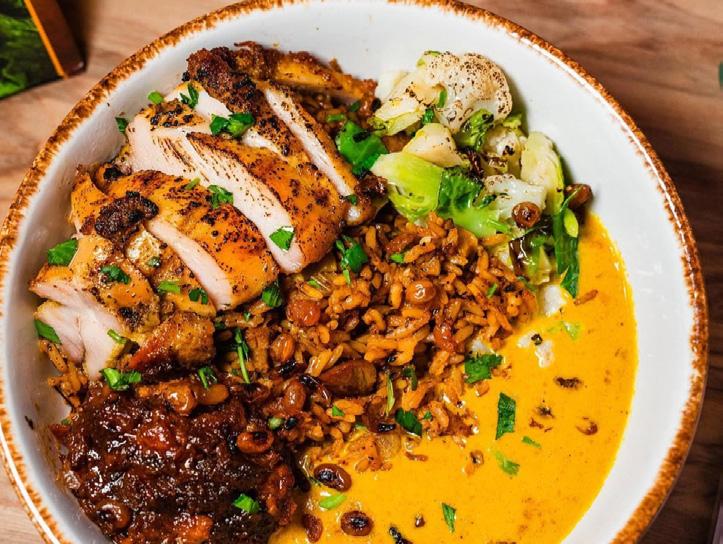
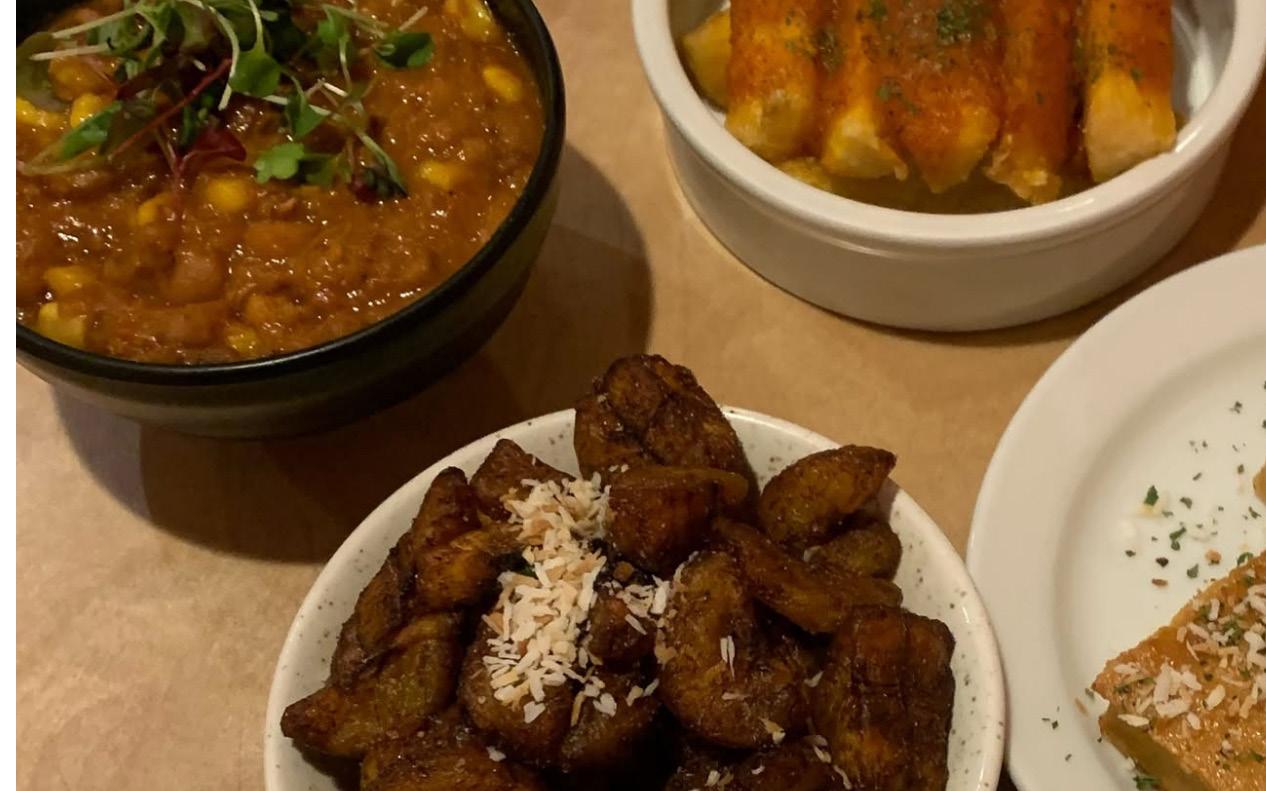
6 8
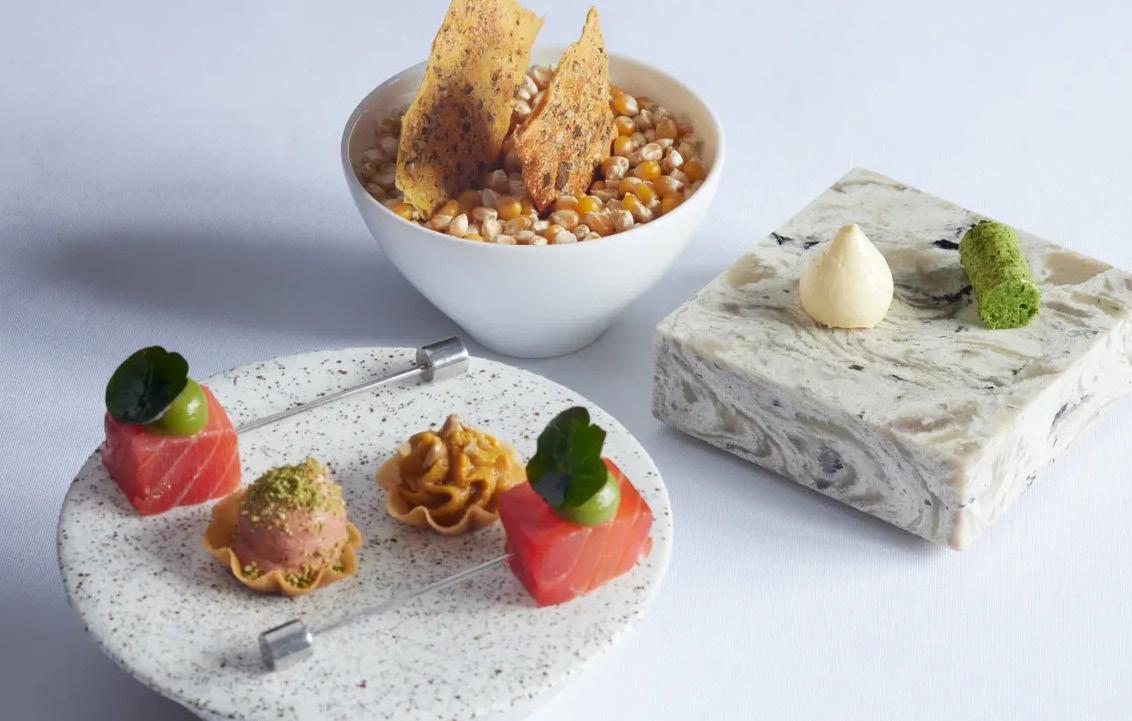
Chef Ope Amosu’s ChòpnBlọk is a fast-casual restaurant that brings West African flavors to Houston’s diverse food scene. Offering dishes like red stew and suya, the restaurant provides a contemporary take on traditional cuisine, making it accessible to a broader audience.
Huston, USA
IG: @Chopnblok_
These restaurants exemplify the global impact of Nigerian chefs who are redefining culinary boundaries.
By Chef Matthew Okwor
Prawns Akara Sushi is a creative fusion dish combining the savory flavors of Nigerian Akara (bean fritters) and Agoyin sauce with the delicate art of sushi making.
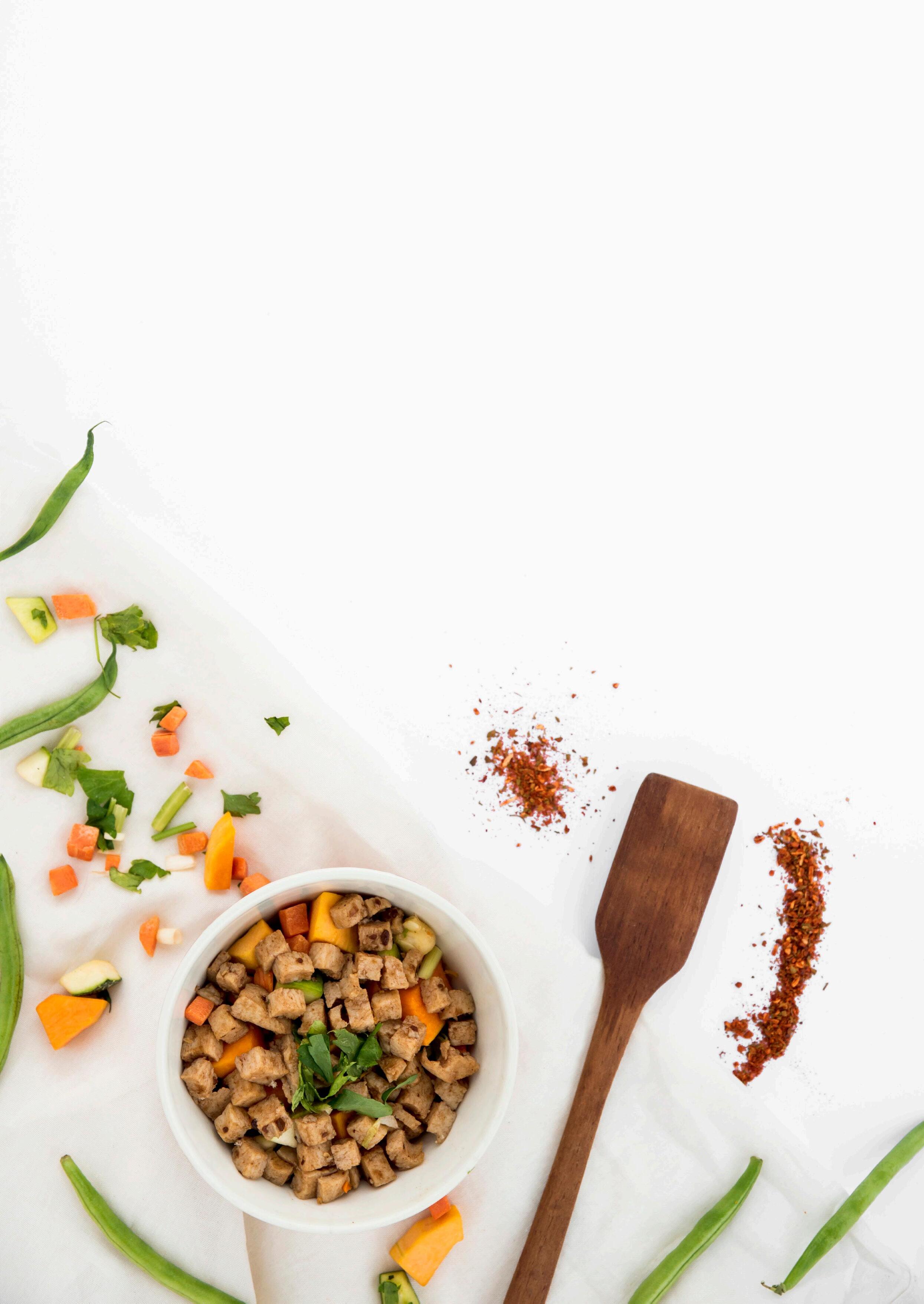
Ingredients
• Beans 300g
• Plantain 100g
• Jumbo Prawn 150g
• Local Rice 100g
• Seaweed 1 sheet
• Tatashe 15g
• Red Chilli 10g
• Red Atarodo 10g
• Crayfish 25g
• Locust Beans 20g
• Ginger/Garlic 10g
• Fresh Coriander handfull
• Smoked cat fish 25g
• Red Oil 80ml
• Red Onion 50g
• Salt 2g
• Sugar 5g
• Fresh Tomatoes 20g
For the Akara
Instructions
1. Wash the beans to peel off their skin.
2. Add the red chilli, tatashe, onion, ginger, and ripe plantain to bend to a puree.
3. Add salt to taste and stir continuously.
4. On a deep pan add a large amount of vegetable oil, set the heat to 120 degrees, and add the scoop until golden brown.
For the Sauce
Instructions
1. Blend the fresh tomato, onion, and red atarodo to a rough blend and set aside.
2. In a deep saucepan, add palm oil, allow to heat for about 3 minutes.
3. Add the blended mixture to the hot palm and allow to fry.
4. Add the crayfish and locust beans, season to taste, and turn down the heat.then blend to a puree.
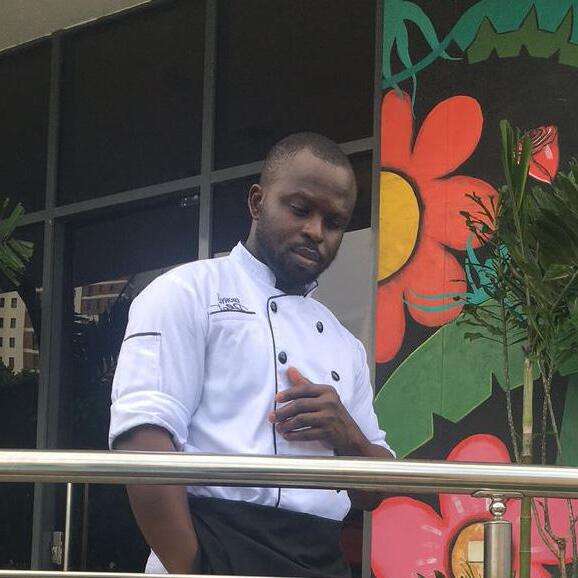
CHEF BIO

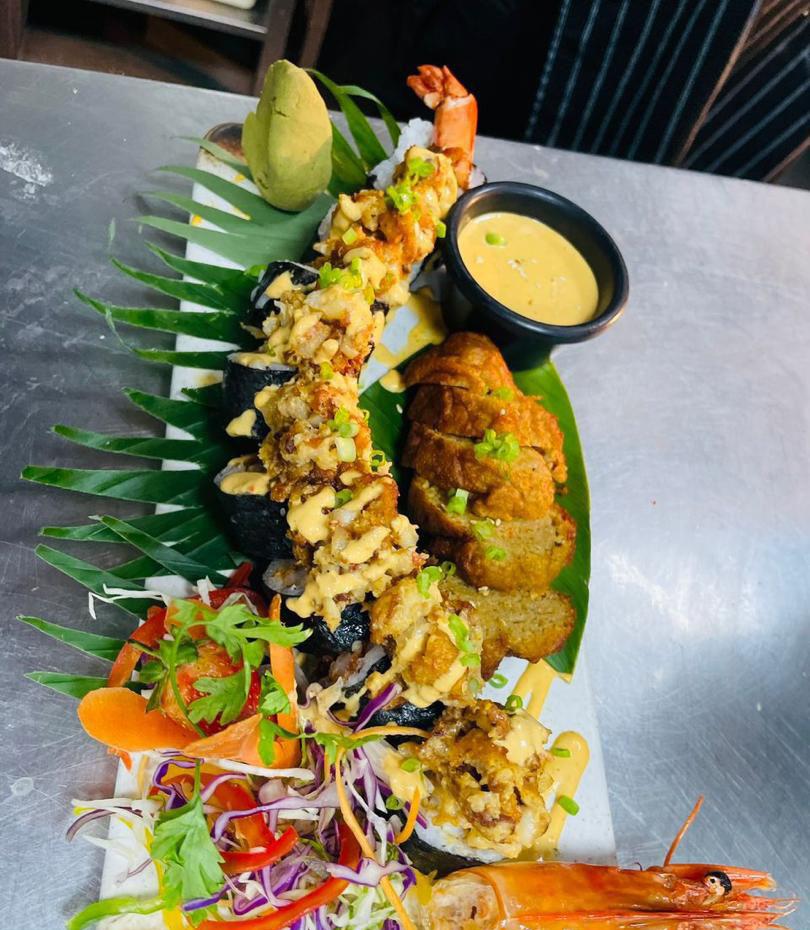
For the Prawns, Rice and Rolling
Instructions
1. Season the prawn with oyster sauce, fresh ginger, and ginger garlic.
2. Wash the rice thoroughly and add to a boiling water, allow to cook, add the sugar and combine and allow to cool down.
3. For the rolling, spread the seaweed on board and add the cooked rice evenly to cover the edges, on one half of the sheet add the diced prawn, Akara crumbs, and the blended puree sauce and roll tightly.
4. Ensure it is firm before cutting to the sushi shapes.
Chef Matthew Okwor, a native of Enugu state, Udi, and an Economics graduate of the University of Calabar, is the Sous Chef at Afrobeat Kitchen, part of White Orchid Hospitality (Ebonylife Place). His experience in this role has been a significant journey, encompassing menu design, creation, and rigorous tasting processes aimed at achieving culinary excellence. The chef holds a strong belief in continuous improvement, viewing constructive criticism as an essential element for professional growth.
By Chef Matthew Okwor
Ingredients
Titus Fish 100g
Medium Prawns 100g
Calamari 50g
Periwinkle 20g
Basmati Rice 100g
Uziza Seeds 5g
Bell Peppers 20g
Locus Beans 5g
Crayfish 15g
Red Atarodo 20g
Red Chili 10g
Fresh Tomato 40g
Broccoli 20g
Basil 5g
Onion 25g
Red Oil 20ml
Fish Stock 50cl
Salt 1g
Maggi Crayfish 16g
Ginger/Garlic 10g

INSTRUCTION
1. In a bowl add the prawn, calamari, and titus fish, add salt, and crush Uziza seeds to marinade.
2. Place the seafood on an oven tray and grill at 150 degrees for 25 minutes.
3. In a deep pan add the palm oil and allow to heat for 5 minutes, add the onion, fresh. tomato and crushed ginger, garlic, crushed Uziza seeds and locust beans then allow to fry for 3 minutes.
4. Wash the raw rice to reduce starch then add to the simmering sauce, cover with foil paper and allow to simmer on a low heat for 20 minutes.
5. Blanch the broccoli in boiling water with salt to taste.
6. Add the seafood and blanched broccoli to the rice and cover to cook for an additional 10 minutes for flavors.

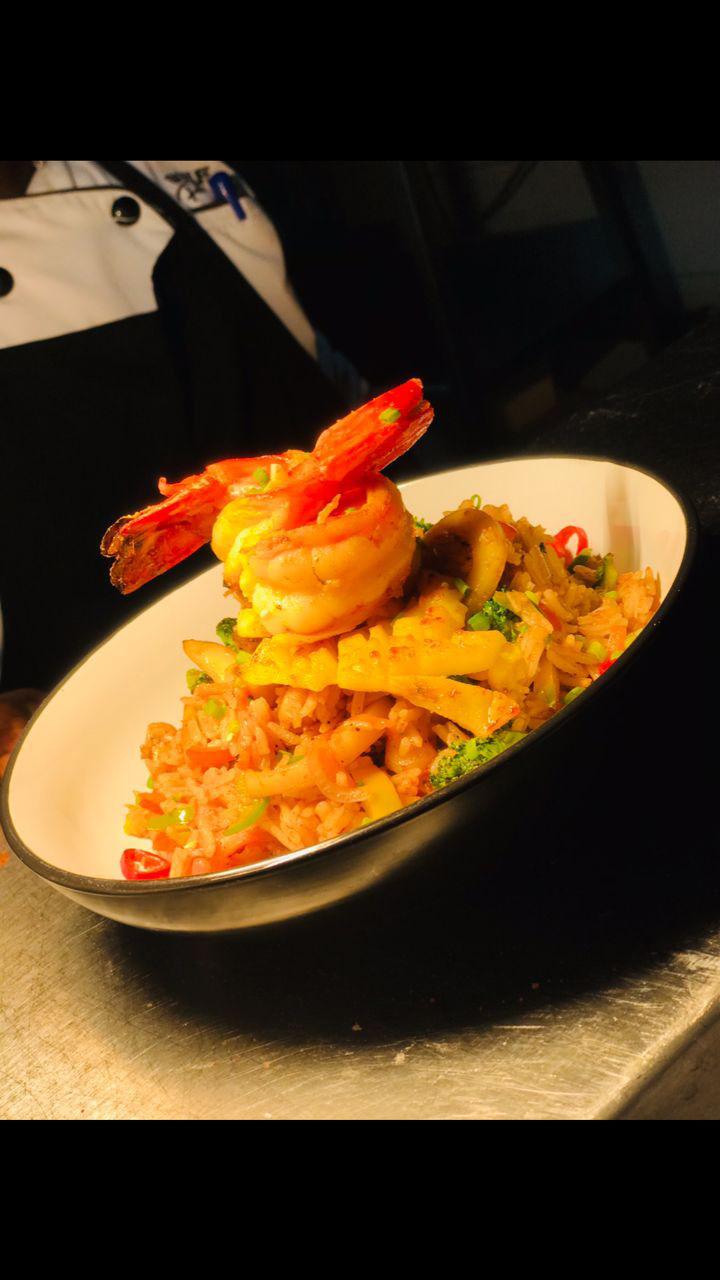




Burger Week is Back!

Get ready for 10 delicious days of burger bliss as Burger Week returns—proudly presented by Awari refreshed by Pepsi, Maltina & Tiger Beer and our Bank Partner; Providus Bank!
From Lagos to Abuja, 65 restaurants are serving up the ultimate treat: an exclusive Buy One Get One Free offer on their mouthwatering burgers. Whether you’re a fan of long-time favorites or ready to discover the city’s hottest new spots, we’ve curated a lineup that celebrates the very best of the evergrowing restaurant scene.
Date: 16th to 26th June, 2025.
Location: Participating restaurants across Lagos & Abuja
Be sure to share your Burger Week experience and tag us: @lostinlagos12 @providusbankig @pepsi_naija @maltina @tigerbeerng
Let the burger adventure begin! #BurgerWeek2025 #BW2025 #providusbank For more information, download the Awari App.
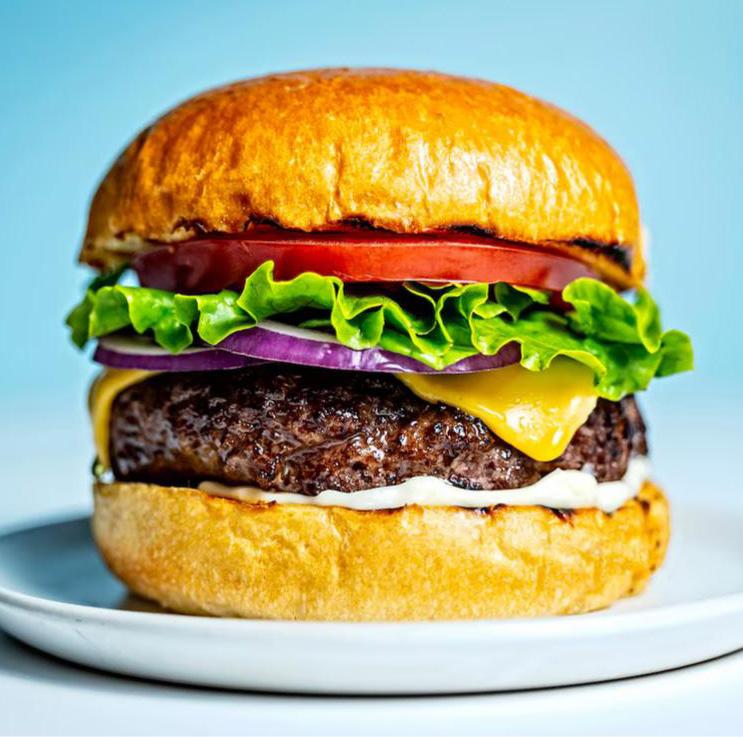

ADALINE LAGOS by Lickfinger Foods
Discover Adaline Lagos, Lekki’s premier dining destination, “where the food truly speaks for itself.”
Enjoy casual dining in an elegant, personal setting, complete with vibrant flavors and impeccable service. Our passionate chefs create inventive continental and national dishes, morning to night, always with the freshest ingredients and a perfect pairing from our selection of wines, cocktails, and unique drinks.
Lennox Mall Admiralty Way Lekki
Phase 1, Lagos
t: 08033651608
e: lickfingerfoods@gmail.com IG: @lickfinger_foods
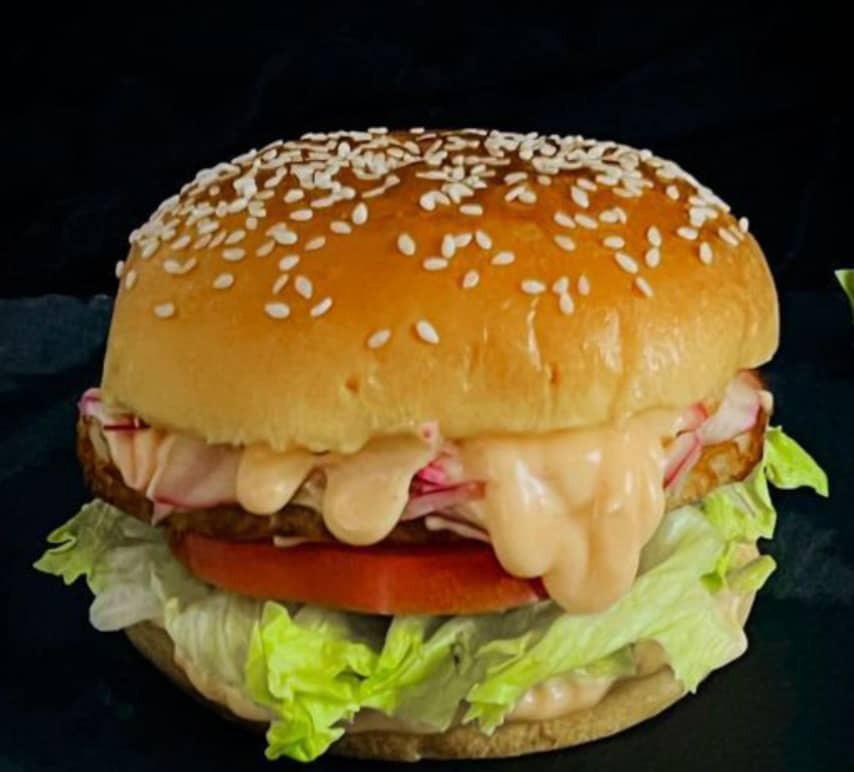

BOGA MASTA
Boga Masta is a sister company to Sweet Sensation Ltd, which is tailored to burger and shawarma product varieties
26 Adetokunbo Ademola Street, Victoria Island 106104, Lagos.
38 Awolowo Rd, Ikoyi 106104, Lagos. Maruwa Bus Stop, Remi Olowude St, Lekki Phase I 106104, Lekki.
3 Opebi Rd, Opebi, Ikeja 101233, Lagos.
62 Isaac John St, Ikeja GRA, Ikeja 101233, Lagos.
75a Bode Thomas St, Surulere, Lagos 101241, Lagos.
26 Ijaiye Rd, Ogba, Lagos 101233, Lagos.
4 Diya St, Gbagada, Lagos 105102, Lagos.
238 Herbert Macaulay Wy, Yaba, Lagos 101245, Lagos.
t: +234 805 031 1594
e: bogamgr@sweetsensation.ng
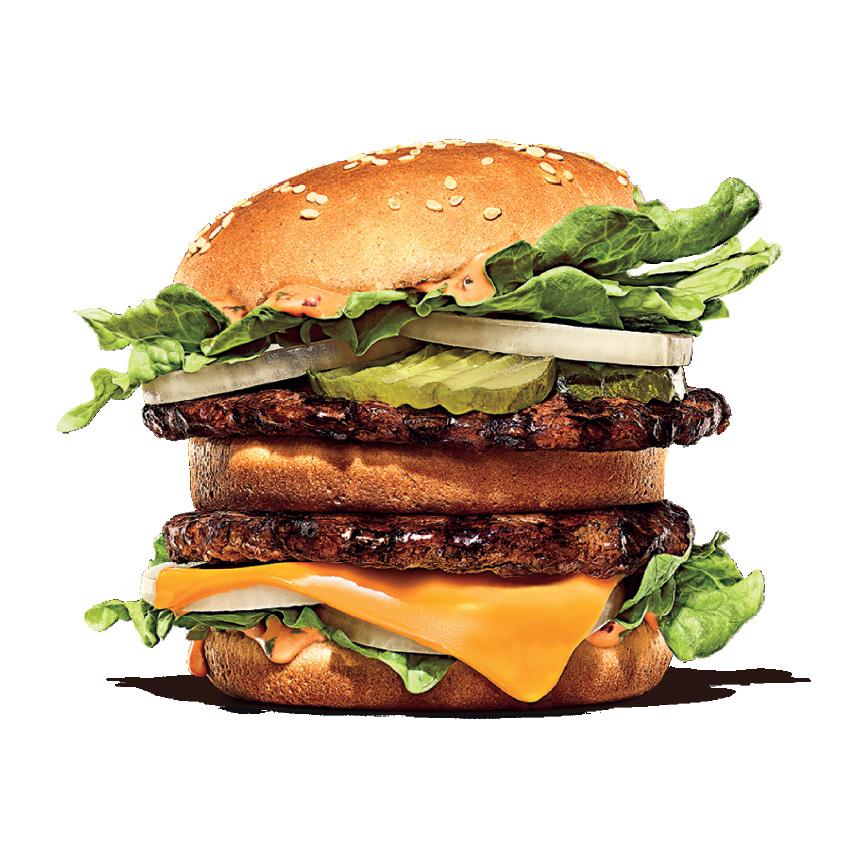
BURGER KING NIGERIA

Having launched its first Nigerian restaurant in November 2021, Burger King Nigeria (a joint venture with Allied Food and Confectionary Limited and BURGER KING® Worldwide) is set for significant growth. We aim to open over 55 new stores in the next five years, contributing to the Nigerian economy and generating substantial employment.
247, Ajose Adeogun, Victoria Island, Lagos.
237 Lekki Epe Express Way, Ajah, Lagos.
10 Agungi Ajiran Road, Agungi, Lekki, Lagos.
282 Herbert Macaulay Way, Yaba
69 Adeniran Ogunsanya Street, Surulere 45, Toyin Street, Ikeja, Lagos.
32, Joel Ogunnaike Street, GRA Ikeja
The Palms, Lekki, Lagos.
Plot 132 Festac Access Road, Festac, Lagos. 11b Victoria Arobieke Street, Lekki
296, Gbagada Oworonshoki Express Way
2 Purple Way, Freedom Way, Lekki Phase 1 Ikeja City Mall, Obafemi Awolowo Way, Ikeja. Muritala Mohamed Airport, Ikeja, Lagos.
t: 07000334477
e: info@burger-king.ng
IG: @burgerkingnga

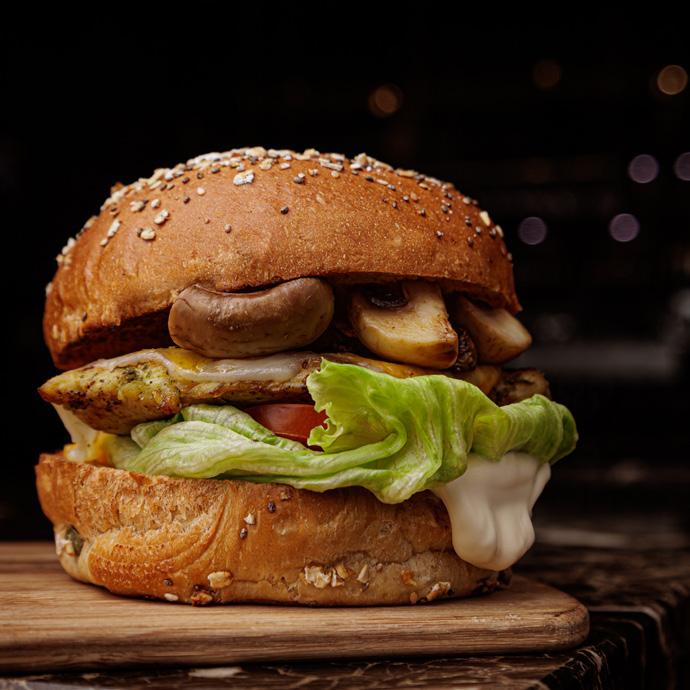
CASPER & GAMBINI’S

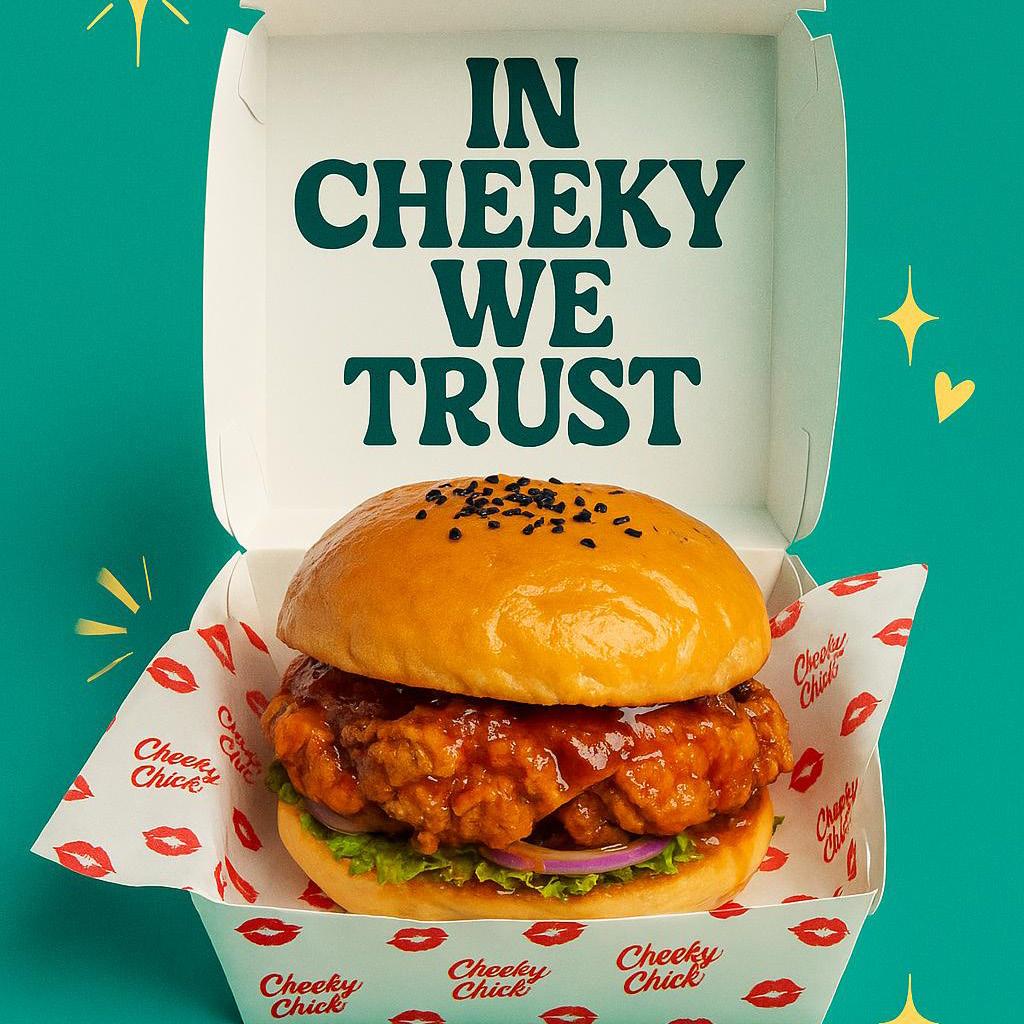
CHEEKY CHICK



From Lebanon to the world!
Established in 1996, Casper & Gambini’s is an international restaurant-café chain serving fresh and healthy gourmet meals, along with signature award- winning coffee, all within a stylish urban chic environment embracing the daily trendy lifestyle.
Casper & Gambini’s, Ikeja City Mall, Obafemi Awolowo Way, Oregun, Ikeja, Lagos
t: 07077717665
e: Hoo-lagos@casperandgambinis-nig.com
IG:@casperandgambinisnig
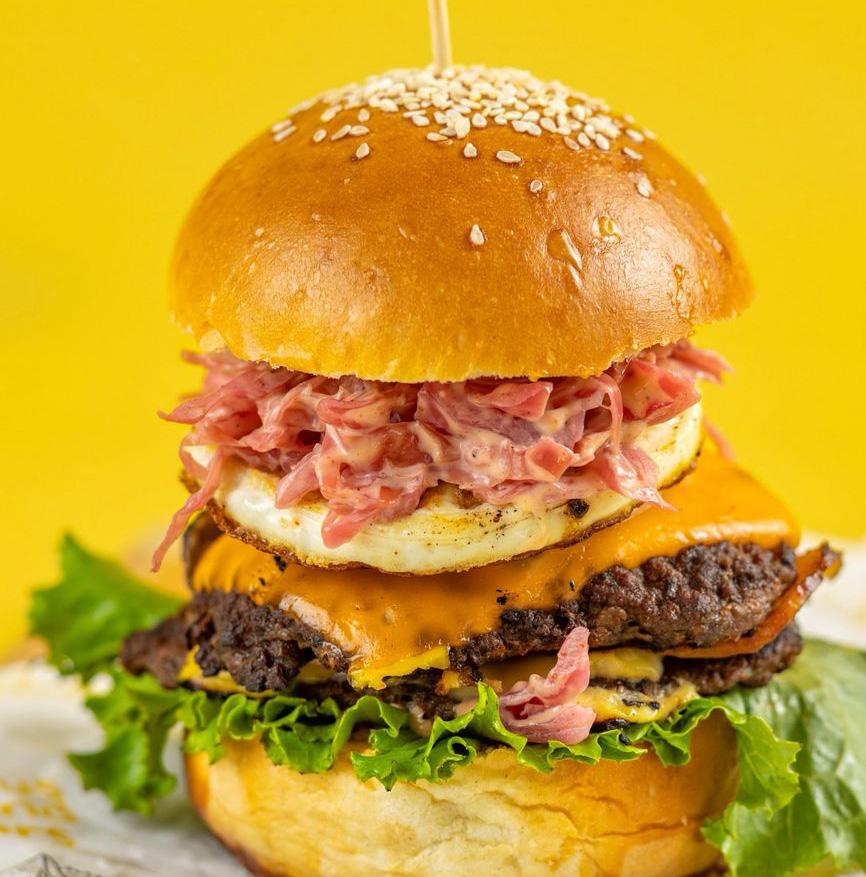
CITY SUBS

City Subs offers top-notch varieties of burgers, subway sandwiches and pastries.
Opp 29b, Prince Bode Adebowale, Off Chief Collins Lekki Phase 1 14b, University Road Yaba. Plot 8, Town Square Mall, Magoo t: 08122240002
e: citysubs@gmail.com
IG: @citysubsng












We are a fast food chain specialising in chicken.
32B, Ologun Agbaje, Victoria Island t: 07070222282
e: cheekychicnigeria@gmail.com
IG: @cheekychick.ng
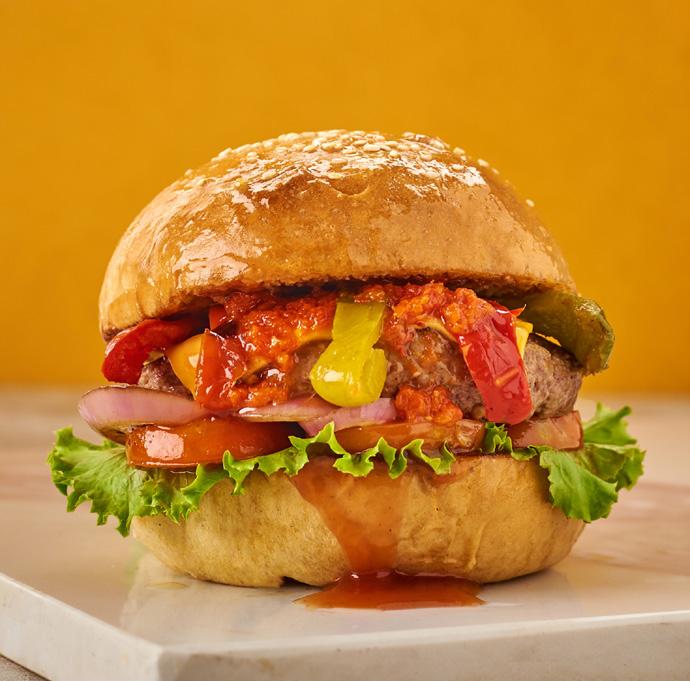

Chop Chop is a bold fast-casual food brand serving up modern Nigerian flavors with speed and style. From juicy burgers and fire-grilled wraps to hearty bowls packed with flavor and balance, every meal is designed for people on the move who never want to compromise on taste.
168 Ozumba Mbadiwe Avenue, VI, Lagos (opposite ecobank) Admiralty Way, Lekki Phase 1, Lagos (Opposite Ebano) t: +234 913 609 5739
e: chopchopngr@gmail.com IG: @chopchopngr
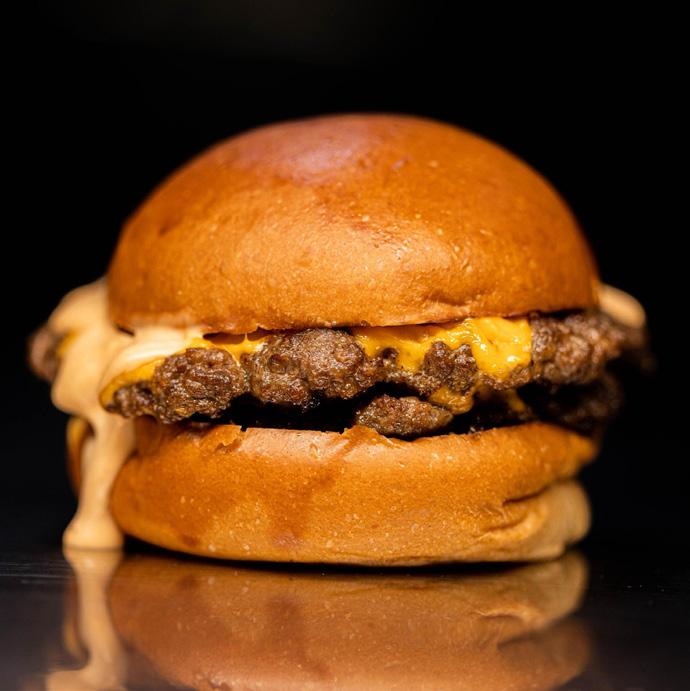

COMBOS RESTAURANT
COMBOS is a fast food restaurant that specialises in making bespoke meals.
9 Keffi Street, off Awolowo Road, Ikoyi, Lagos. t: 08164081156
e: order@combosafrica.com
IG: @combosafrica
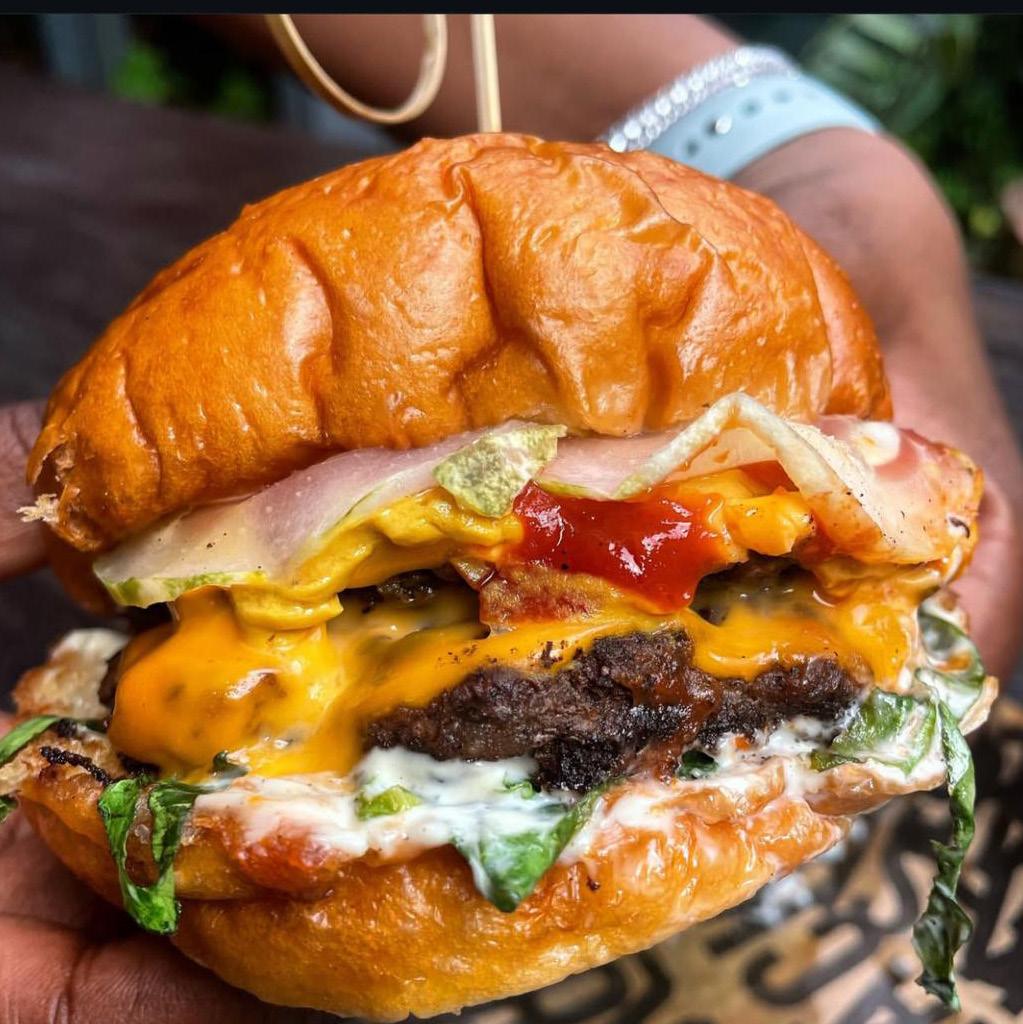

Foodshack is a rustic Nigerian American Fusion Restaurant. We are well known for our Burgers and Barbecue. Foodshack Vision is to be an Africa Well Known Restaurant Where there’s a Store in every African Country
32A, Ologun Agbaje, Victoria Island, Lagos t: 09073442000
e: foodshackng@gmail.com
IG: @foodshackng

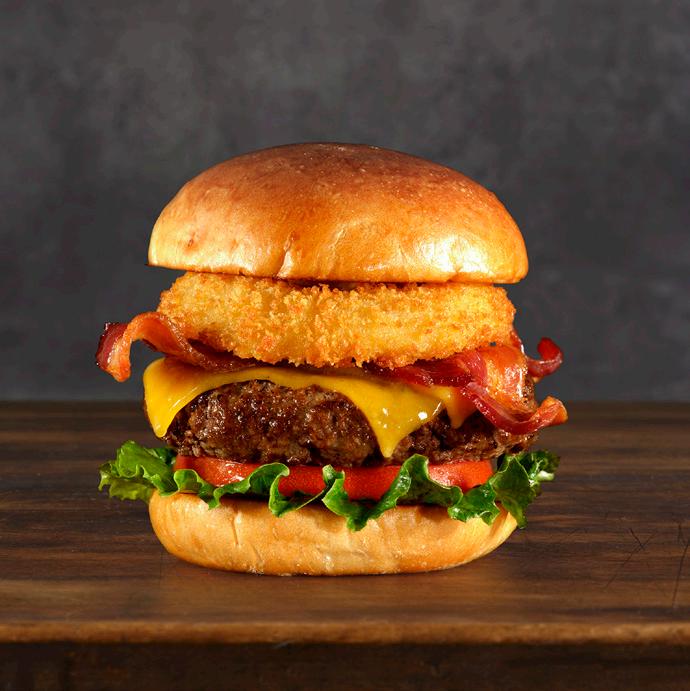

From its origins with an Eric Clapton guitar, Hard Rock International has grown into a global entertainment powerhouse. With over 300 venues in nearly 75 countries, including Hotels, Casinos, and Cafes, Hard Rock delivers award-winning experiences centered around its unparalleled collection of music memorabilia. Discover the full story at www.hardrock.com.
32B, Ologun Agbaje, Victoria Island, Lagos t: 09081988888
E: lagos_Social@hardrock.com
IG: @hrclagos
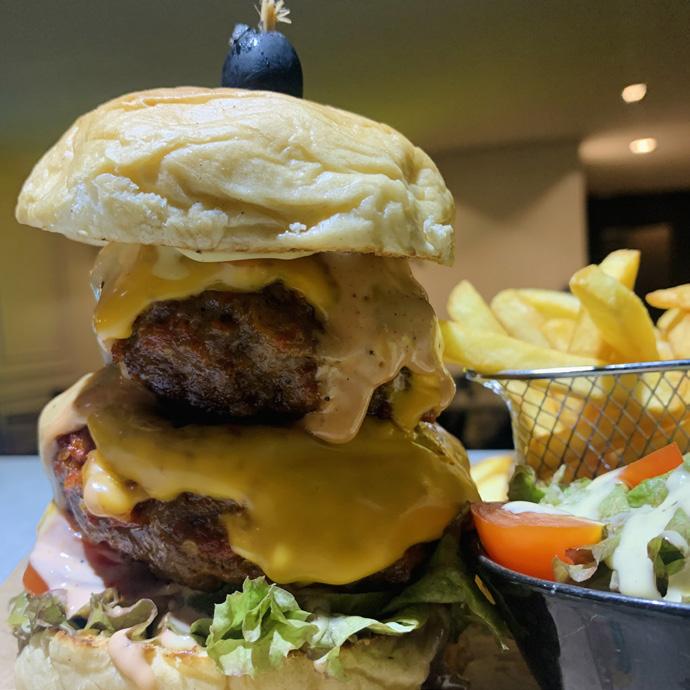
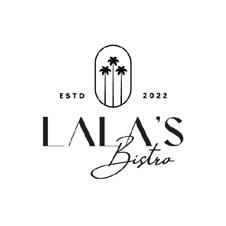
Welcome to Lala’s Bistro, an exquisite restaurant located in Lala’s Lagos Boutique Hotel, nestled in the beautiful Victoria Island, Lagos. As you step into our charming and inviting atmosphere, get ready for an exciting culinary journey. Lala’s Bistro is not just another restaurantit’s a magical experience.
251A, Sapara Williams Close, Off Idowu Martins, Victoria Island, Lagos t: 09152251251 e: info@lalaslagos.com
IG: @lalasbistro
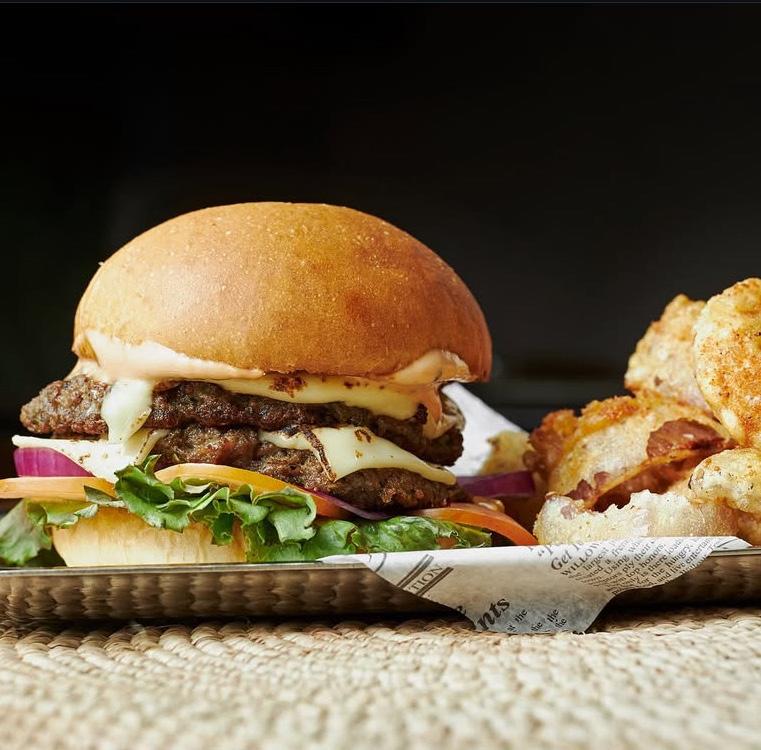

LOCALE is a modern Afro-Bohemian space in Lagos, celebrating the city’s vibrant creativity and craftsmanship. Inspired by global street food, our menu blends diverse flavours with fresh, locally sourced ingredients.
No 2 Saka Jojo street, off Idejo street, Adeola Odeku VI, Lagos t: 09030009758 e: locale.lagos@gmail.com
IG:@locale.lagos
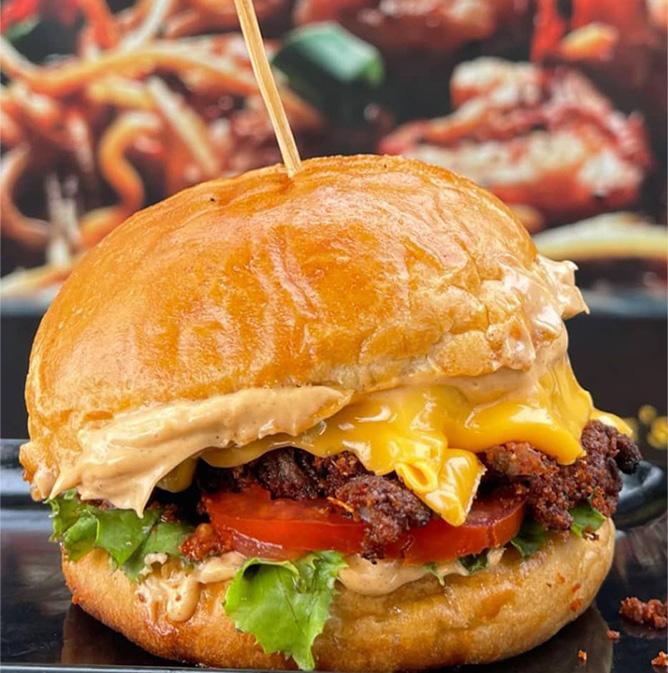

We offer great food for order and delivery and an awesome weekend brunch service.
Block 205, iba housing estate, ojo, Lagos t: 08060783246
e:Phynelloneal@gmail.com
IG: @mouthgasm
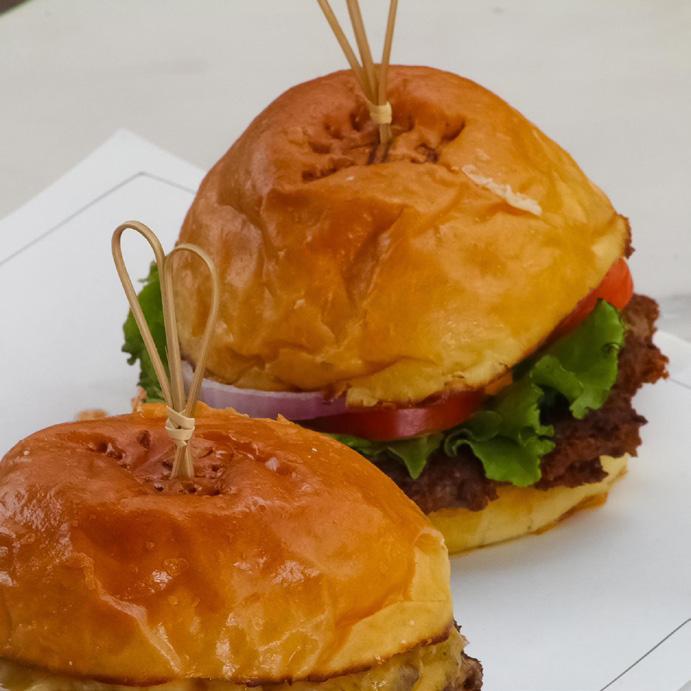
Indulge in a reimagined experience of beloved fast food classics from around the world, crafted with premium ingredients, conveniently done... the Z way! Available for takeout or delivery through our website & mobile app.
19 Saka Tinubu, Victoria Island, Lagos. t: 08090222345
IG:@onzgolagos
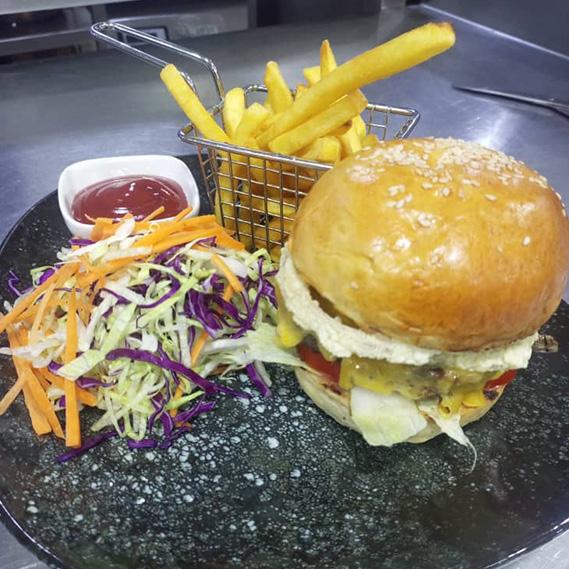
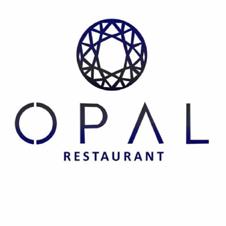
Opal Lagos in Victoria Island offers a premium restaurant and lounge experience where elegance meets excitement. Indulge in fine dining, luxurious ambiance, and vibrant nightlife. From curated cuisine and signature cocktails to themed nights and top-tier entertainment, Opal is more than a place–it’s a lifestyle where every moment shines.
5, Adetokunbo Ademola Street, Victoria Island, Lagos t: 07025008520, 09124336056
e: opallagos1@gmail.com
IG: @opallagos

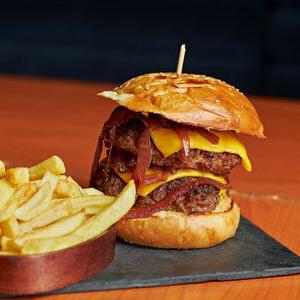
PIZZA GARDEN

Enjoy a slice of the good life. Create beautiful memories with loved ones when you Stay ‘n’ Share or Grab ‘n’ Go any of our 12 signature pizzas, with a milkshake, mocktail or cocktail when you visit Pizza Garden. This casual and intimate restaurant offers a great option to sit and wait out the Lagos traffic while you indulge in our mouth-watering food and drink options.
1637, Adetokunbo Ademola street, victoria island, Lagos, Nigeria. t: 08179466989
e: enquiries@ebonylifeplace.com IG:@pizzagarden_lagos
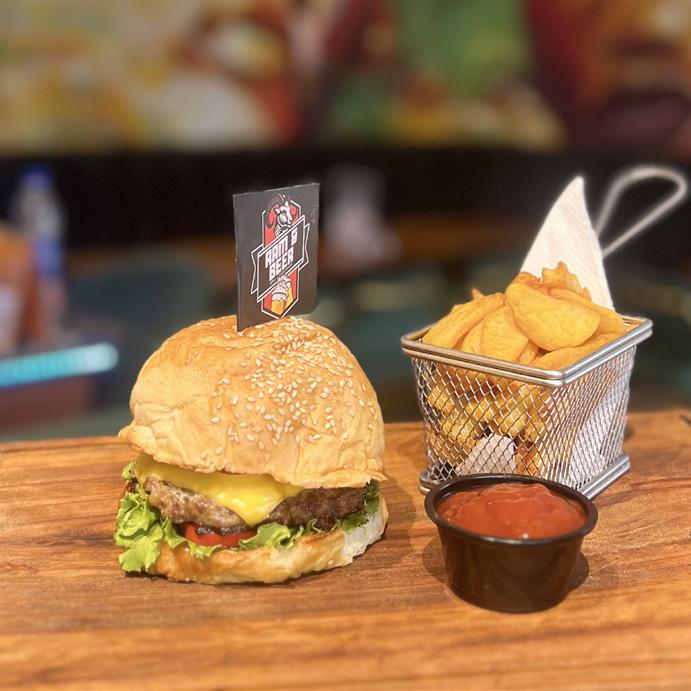
RAM AND BEER

Ram and Beer (R&B) is a unique contemporary food and grill house and its concept celebrates and elevates all aspects of our healthy food lifestyle. At Ram and Beer, we reinvent classics of different meals with ‘RAM MEAT’ giving foods with which we are familiar with an innovative twist and assuring you of a great taste.
38, Oyibo Adjarho Street, Lekki Phase 1, Lagos t: 08079604346 e: ramandbeer@gmail.com IG: @ramandbeer


SYCAMORE BY ONEBASKET
A home away from home with a large variety of cuisines.
30a bashiru shittu Avenue Magodo phase 2, Lagos t: 07040400299 e: daisy@onebasket.ng IG:@sycamorebyonebasket
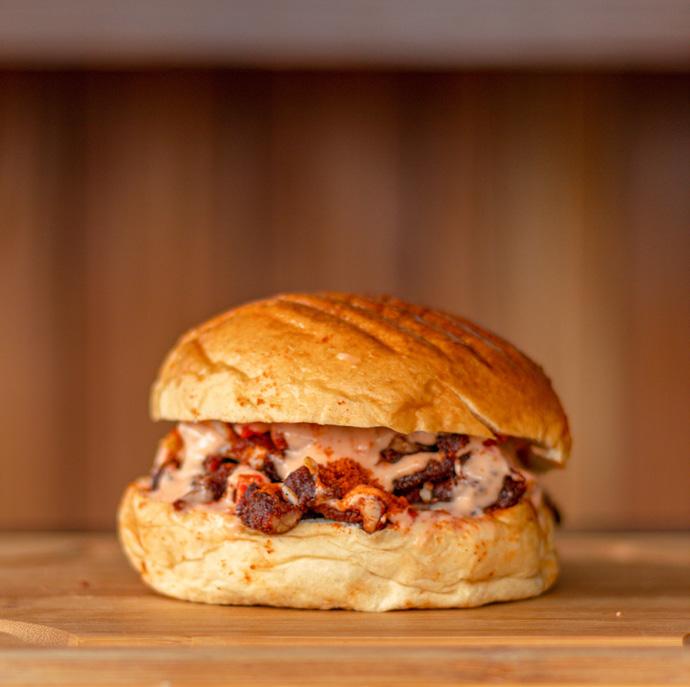
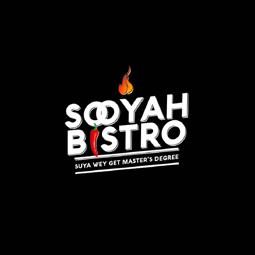
SOOYAH BISTRO LIMITED
Step into Sooyah Bistro and experience meals like never before! We’ve been infusing creativity and fun into iconic Nigerian street food since 2018, offering unique varieties such as suya burgers, shawarmas, and pizzas. Find our quality quick-service meals across Lagos and Ibadan, as we work towards becoming the top Nigerian quickservice restaurant globally.
301 Herbert Macaulay way, Yaba Plot 12, Ligali Ayorinde Street, Victoria Island, Lagos.
1 Bisway Street, Oniru, Lagos.
31, Town planning Way, Ilupeju, Lagos. Leisure Mall, Adeniran Ogunsanya Street, Surulere, Lagos. t: 08077525315
e: info@sooyahbistro.com IG: @sooyah_bistro
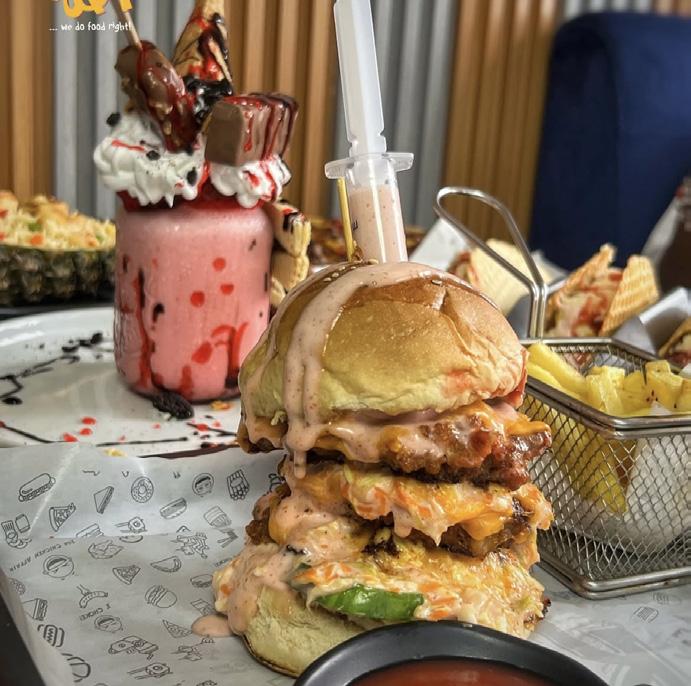
RUBELS AND ANGELS

Rubel’s and Angel’s is a beloved spot known for its crispy chicken and delicious burgers. Their chicken is perfectly fried with a crave-worthy crunch and the burgers are made with fresh, high-quality beef. This spot is a must-visit for an unbeatable fast-food experience.
11, University Road Akoka Abule Oja, Lagos 52, Ogunlana Drive Surulere t: 07035727288
e: rubelsangels@gmail.com IG: @rubelsandangels

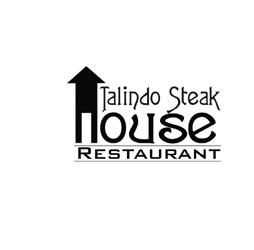
TALINDO STEAK HOUSE
Lagos best kept secret.
7b Karimu Kotun Street, Victoria Island, Lagos. t: 08151530000
e: reservation@talindosteakhouse. com IG:@Talindosteakhouse

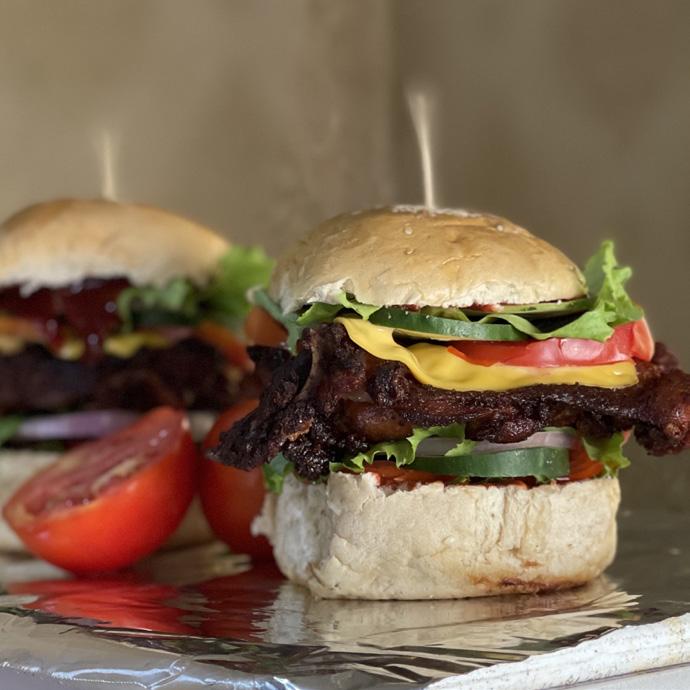

BBQ REPUBLIQUE HUB
At BBQ Republique, we specialise in serving delicious & ready-to-eat BBQ foods that will satisfy your cravings. Our menu features a variety of mouth-watering dishes & street food favorites, all made with high quality organic ingredients.
41, ikosi road, Ketu, Lagos t: 08028494090 IG@bbqrepublique
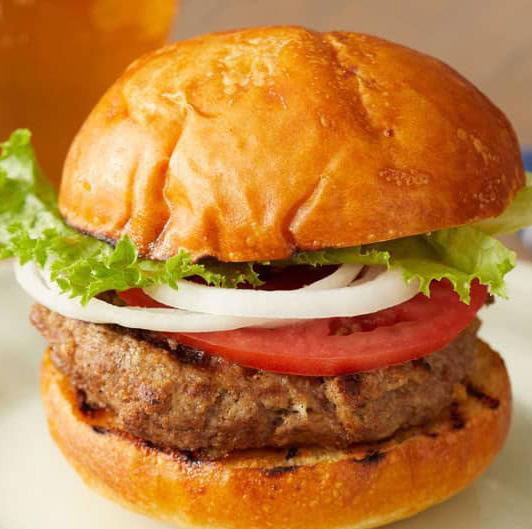
URBAN DISTRICT

We are a gastropub located on the mainland. We prepare local dishes, grilled food and can curate any meal of your choice.
33a Moore Road, Yaba, Lagos T: 07068215500
e: Urbandistrictltd@gmail.com
IG: @Urbandistrictng
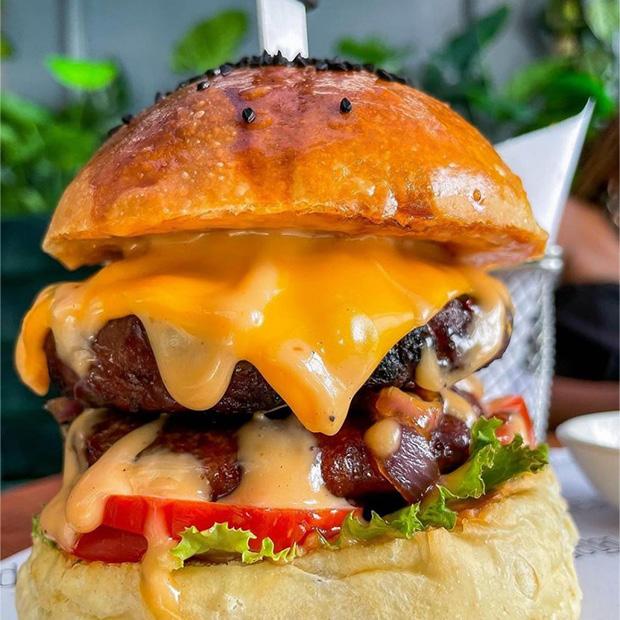

THE SIDEBAR BY MISKAY
An upscale restaurant that serves breakfast, lunch and dinner menus. The Side Bar is all about food, friends and lifestyle.
13, Emma Abimbola Cole, Lekki, Lagos t: 09046146129
e: thesidebarbymiskay@gmail.com IG:@thesidebarbymiskay
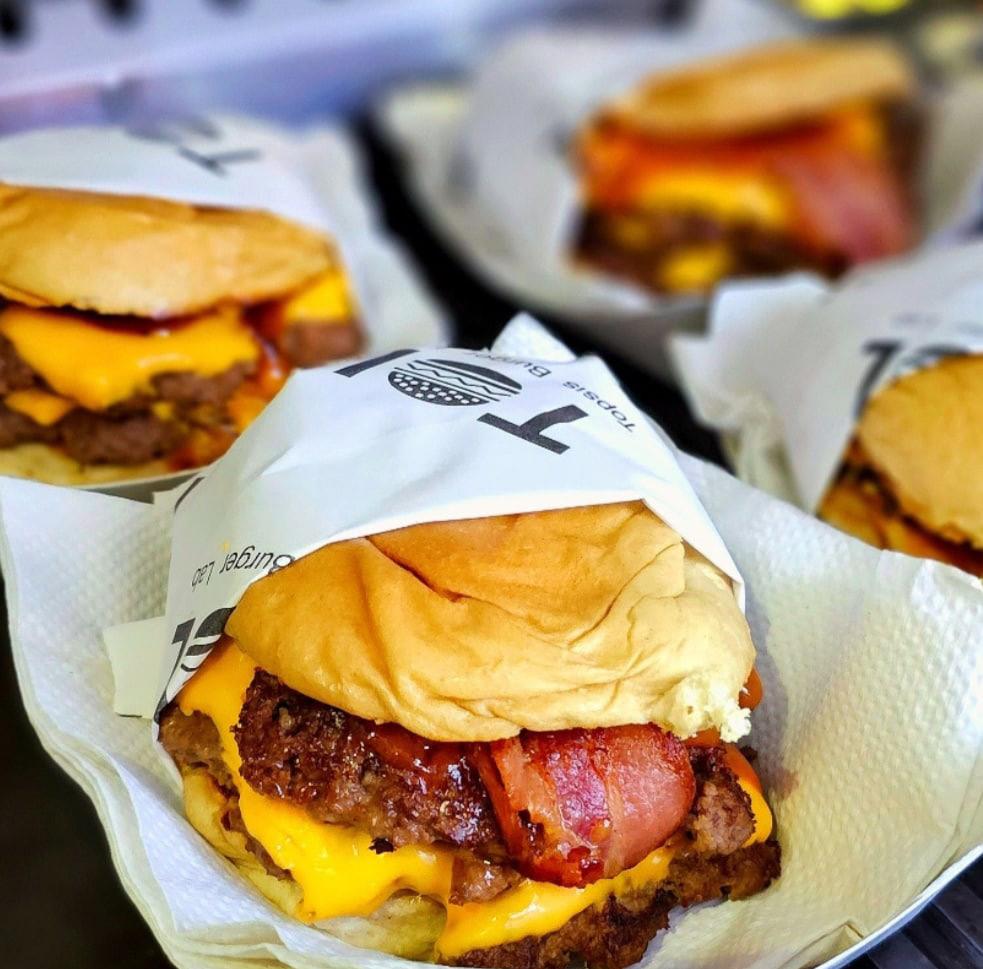
TOPSIS BURGER BAR

A fast casual burger pick up and take out concept founded in 2020. We make L.A.inspired smash burgers with a hint of Naija influence.
Lafiaji Way, Opposite 106a Ilupeju Street, Dolphin Estate, Ikoyi, Lagos t: 09165995265
e: topsisblab@gmail.com IG: @topsis_burger_lab







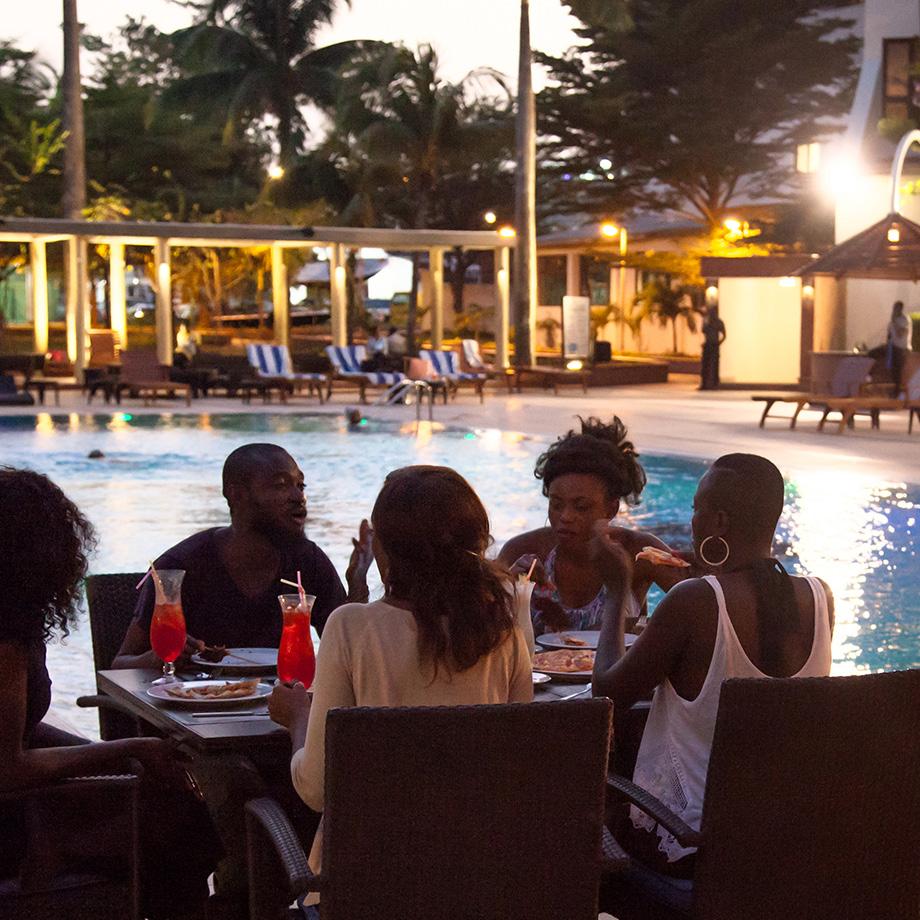
Paint and Bake is a premier creative haven for art enthusiasts and those seeking unique experiences. Offering expert-led painting sessions on ceramic and canvas. The studio provides a holistic approach to artistic expression in a warm and inviting environment. Whether you’re a seasoned artist or a beginner looking for a fun night out, Paint and Bake is designed to help you unleash your creativity, relax, and enjoy quality time with loved ones.
267A Etim Inyang Crescent, Victoria Island Lagos, Nigeria e: contact@chocolatroyal.com IG: paintandbake




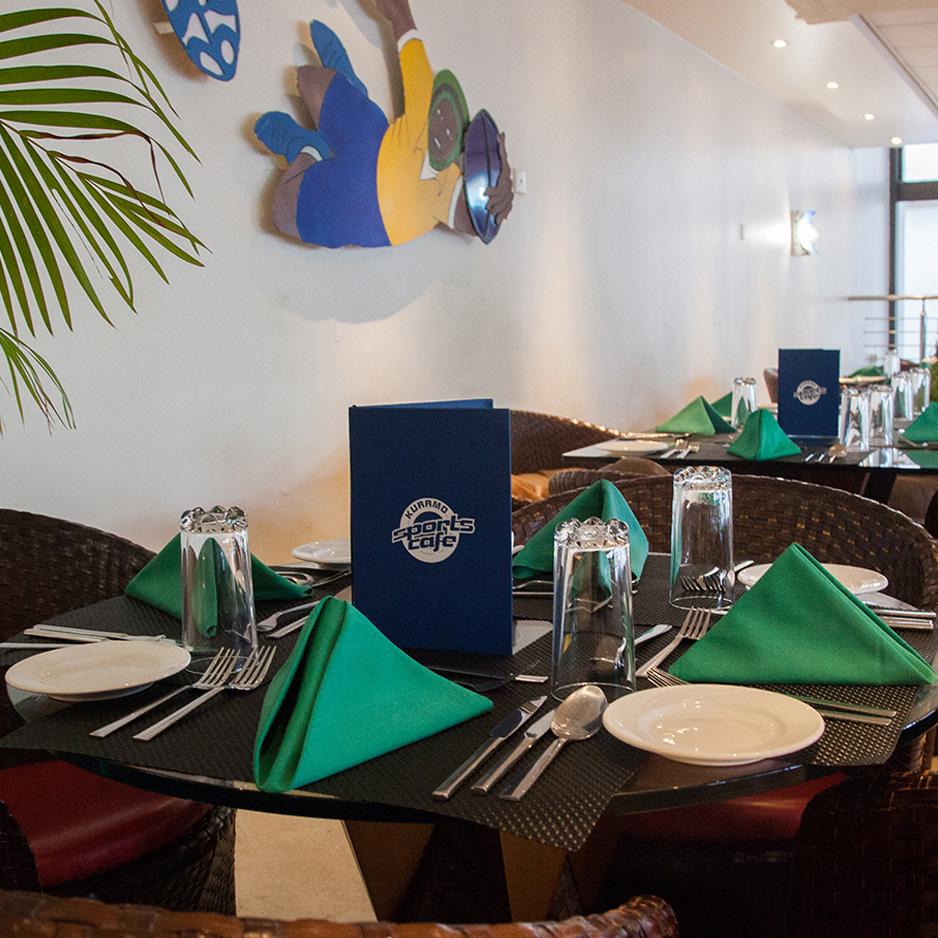
Pit Stop Village is a holistic wellness destination that seamlessly blends fitness, community, and culinary delights. Our state-of-the-art fitness center offers a range of exercises to help you achieve your wellness goals, while Roastery, our cafe, serves up delicious food and drinks to fuel your body and soul. With a large pool and exciting activities, Pit Stop Village is the ultimate haven for those seeking a balanced lifestyle, relaxation, and connection with like-minded individuals. Whether you’re looking to work on your fitness, unwind, or simply enjoy good food and company, Pit Stop Village is your sanctuary.
44/46 Alexander Avenue Ikoyi, Lagos, Nigeria e: info@pitstoplagos.com IG: pitstop_village
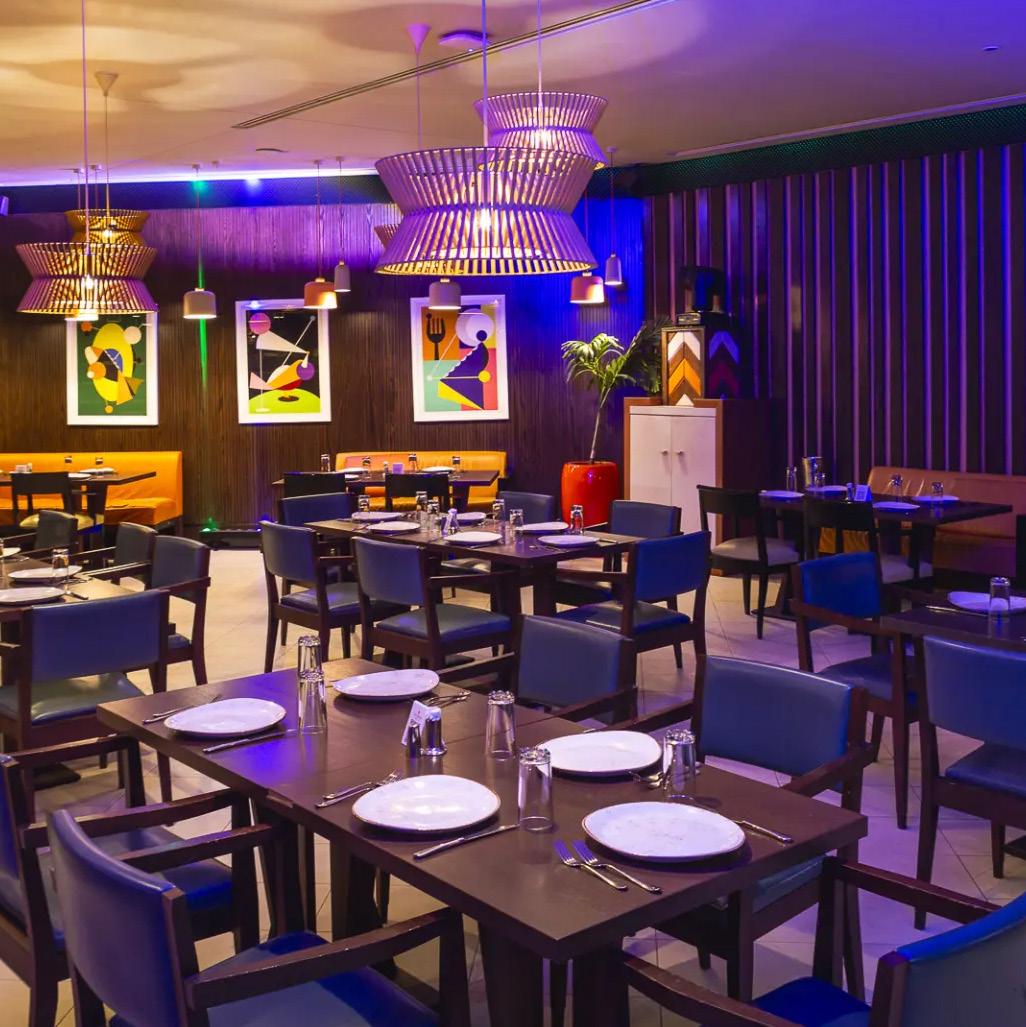
Rhapsody’s is a premier entertainment destination that redefines the nightlife and fine dining experience. The contemporary lounge and bar offers a sophisticated ambiance, expertly crafted cocktails, and a vibrant atmosphere that sets the stage for unforgettable nights out. With a focus on exceptional service, gourmet cuisine, and live entertainment, Rhapsody’s is the ultimate haven for those seeking a luxurious and memorable experience. Whether it’s a romantic evening, a night out with friends, or a special celebration, Rhapsody’s is the perfect setting to indulge in the finer things in life.
- 53-55 Sobo Arobiodu St, Ikeja GRA, Lagos.
- The Palms Shopping Mall, Maroko, Lagos.
- 75 Aminu Kano Crescent, Wuse 2, Abuja, Federal Capital Territory.
- Obafemi Awolowo Wy, Alausa, Ojodu 101233, Lagos, Nigeria IG: rhapsodys_nigeria


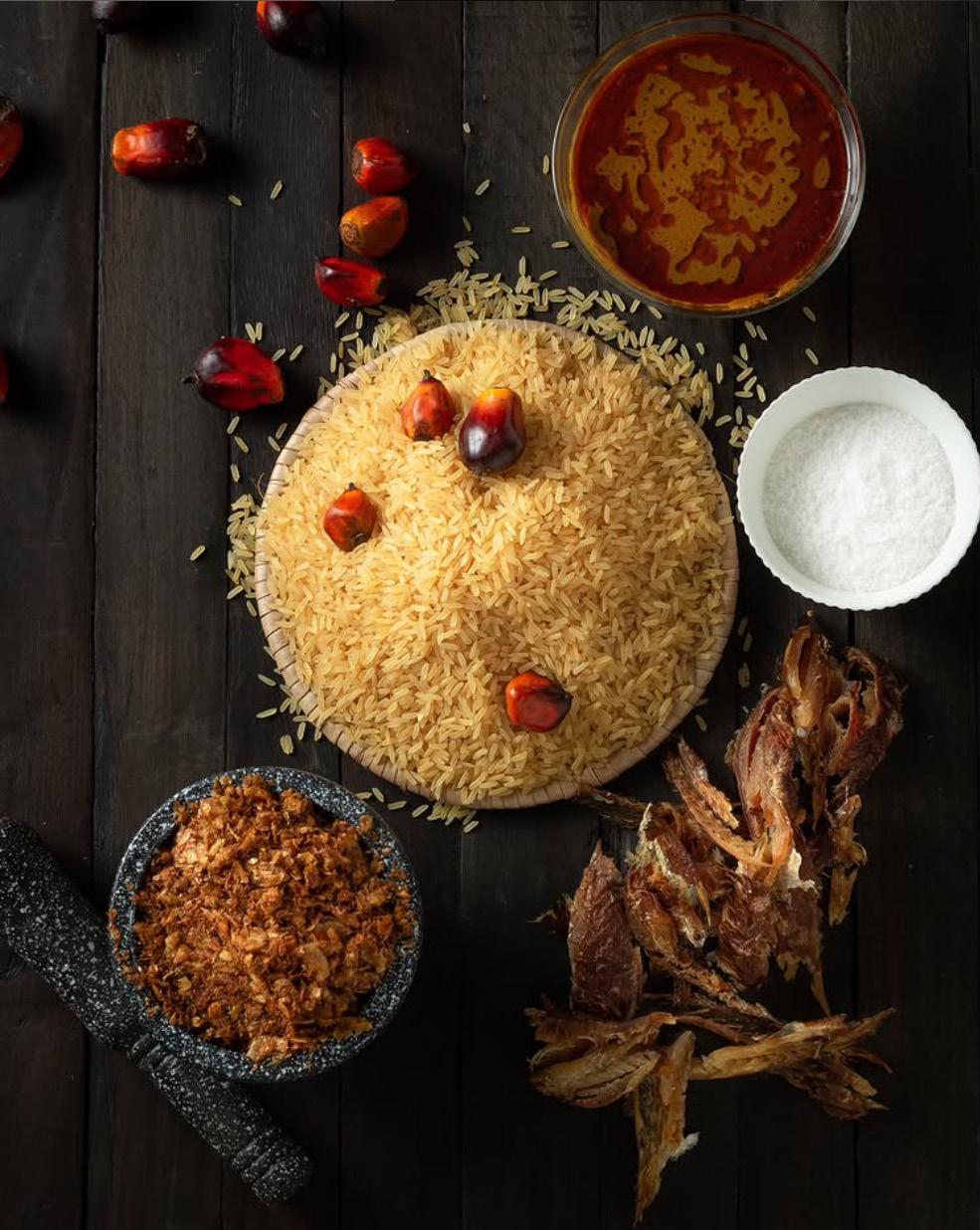
Aroma of the Delta and gold in a pot. With the Palm’s velvety tears, every grain of rice becomes highly sought.
Anjola Awosika is a visual artist who has evolved from his roots in photography to become a creative force. With a keen eye for detail and an innate ability to see beyond the ordinary, Anjola has mastered the art of storytelling through his lens. Driven by his passion for food and culture, Anjola’s work transcends mere imagery; it sparks thought-provoking conversations and celebrates the rich tapestry of African culinary traditions and heritage. Anjola is not just a photographer– he’s a storyteller, a cultural curator, and a visionary on a mission to redefine the narrative around African food and culture.
IG: @anjola.awosika www.anjolaawosika.com





Lost in Nigeria? No worries, as we’ve got you covered. Explore the diverse and captivating points of interest scattered across the country, curated just for you. Whether you’re seeking cultural immersion, outdoor escapades or culinary delights, we handpick a selection of upcoming experiences for you to discover and indulge in every month.


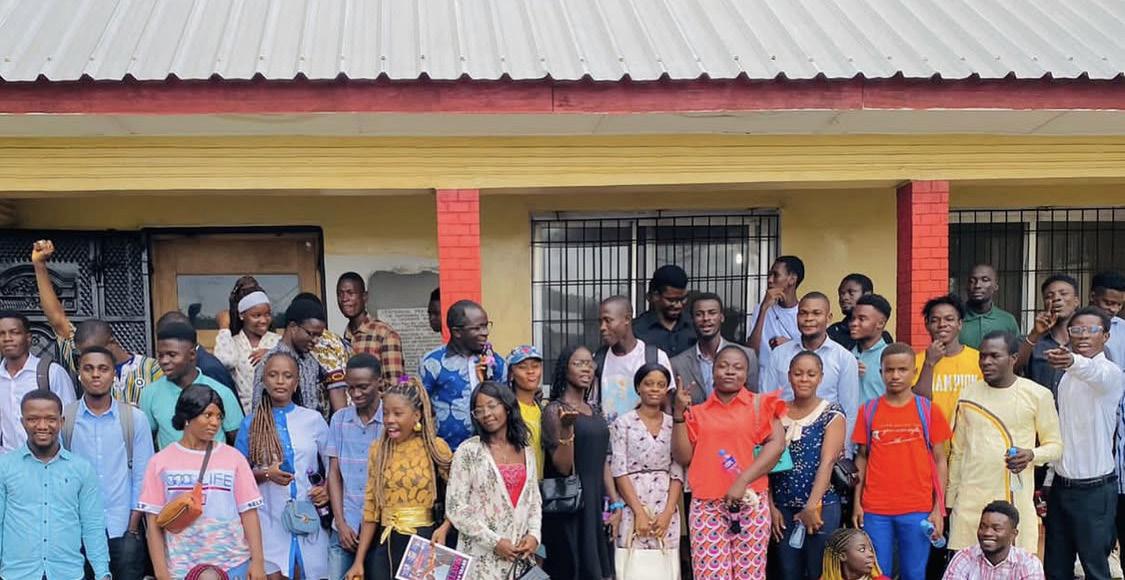


District 69 Rave
District 69 features music, fashion, dance, and all-night partying. Their second edition, themed “Takeover,” promises to be electrifying with an array of DJs and performances. And the cherry on top? It’s powered by MTN, and Yellow Ravers get a free ticket. A must-attend event! Get ready to party like a rockstar!
6th June, 2025 | Jakes club (Silverbird Entertainment Center), Abuja
Food is the heartbeat of global conversations, and this time, the buzz is in Lagos! Get ready for the most prominent Food and Beverage exhibition in West Africa. Uniting distributors, retailers, and industry professionals from across the continent, this epic event is a melting pot of flavors, innovations, and trends that will shape the future of the industry. Don’t miss out on this opportunity to be a part of the conversation that’s shaping the future of food in West Africa!”
10th-12th June, 2025| Landmark Centre, Lagos
Africa Futures Summit 2025
The event that brings together Industry leaders, policymakers, innovators, change makers—you and I—is happening this June, in the city that never sleeps. It features keynote speeches, panel sessions, hands-on workshops and networking opportunities. Themed “Shaping Africa’s Path to Progress Through Youth Engagement,” it is perfect for everyone interested in the growth and development of Africa. Attendance is free but registration is important, and the venue would be communicated upon registration.
19th-21th June, 2025 | Lagos
Ojude Oba
Culture, dance, tradition, colors and beauty is what Ojude Oba is known for. This annual festival of the Oba is held in June, and it features music, cultural display and energetic performances. With celebrants arranged in age groups and each age group gets to wear a special fabric suited for them. Ojude Oba is a celebration of Yoruba culture and tradition. It symbolizes homage to the Awujale (monarch of the Ijebu kingdom). If you’re in Nigeria this is an event you shouldn’t miss.
9th June, 2025 | Ijebu Ode, Ogun
Durbar Festival
Every year several festivals are held in Nigeria, celebrating different things and holding several cultural significance, northern Nigeria isn’t left out, the Durbar festival usually held after a major Islamic celebration like the Eid al-Adhar. It features colorful horse processions, prayers, food and lots of fun activities. Don’t miss this opportunity to witness the most beautiful festival this side of the world. Attendance is free. The dress code is modest and colorful.
14th-17th June, 2025 | Kano
Interview
Nwachukwu Emmanuel
Pastry chef
IG: _chefridon



Meet Nwachukwu
Emmanuel, popularly known as Chef Ridon, a Nigerian pastry chef and business owner from Portharcourt Nigeria. His passion for creativity and drive towards re-inventing pastry has made him one of the foremost emerging chefs in the Nigerian food industry. He is revered for being young and genius, most of whose skills were developed personally through study, practice and innovation, an exciting yet gruesome way to make oneself better. He is always looking for ways to grow and refine his craft.
He enjoys creating unique pastries with bold flavours and clean presentation that tells a story and elicit a feeling with every bite and every time, a refreshingly new angle.
‘‘The best advice I’ve received? “Don’t chase the spotlight, master your lane, and it will find you.
You’re one of the youngest chefs making waves in Nigeria’s pastry scene. What made you fall in love with patisserie?
It was the structure and creativity combined. Unlike other parts of the kitchen, patisserie demands precision, but still leaves room to tell a story through flavor, texture, and presentation. The more I explored it, the more I knew this was the lane I wanted to master.
Do you think your age affects you in the industry or gives you an edge?
It gives me an edge. I bring a fresh perspective, digital fluency, and a boldness that isn’t afraid to rewrite the rules. Some may not always understand it, but I stay focused, positive, and rooted in purpose.
Do you remember the first pastry you ever made? What went wrong, and
what went so right?
Yes, cupcakes. I didn’t quite get the texture, but the flavor had my heart. It was messy, imperfect, but full of promises. That day taught me that even mistakes can be great stepping stones. The moment showed me I was built for this.
You’re part of a new generation of culinary creators. Who inspires you, what’s the one thing you’re most proud of accomplishing in your career so far, and what’s the best piece of advice you’ve received so far?
I’m inspired by Chef Cupid and other chefs who stay authentic, regardless of trends. I’m most proud of building a brand from a solid support system: My parents, my followers, my skill and my vision. The best advice I’ve received? “Don’t chase the spotlight, master your lane, and it will find you.”
We’re all about local flavours. What’s one underrated Nigerian ingredient you think the world should know more about?
“Osakirisa” (Aidan fruit). Its subtle sweetness and floral aroma make it ideal for infused creams, syrups, or as a flavor base for poaching fruits.
What is the biggest challenge you’ve faced in your career so far and how have you overcome it?
Starting without a big platform or capital. I overcame it by saving what I could, reinvesting into my brand, and staying consistent. I made sure every creation spoke for me, and I moved with the mindset that someday, the world would hear me.
In one word, what do you want your patisserie journey to be known for?
Unforgettable

Interview
Chef Stone
Chef and Founder, Reddish Chronicles
CEO The Burgundy Restaurant

Traveling as a chef today is no longer about just collecting techniques, it’s about cultural exchange. Everywhere I go, I ask: “What can we learn from this food culture, and what can they learn from us?
hef Stone is a culinary educator, restaurateur, and passionate advocate for African gastronomy. As the founder of Red Dish Chronicles, the largest culinary school in West Africa, and The Burgundy, a pan-African fine dining restaurant, he champions the diversity and richness of African ingredients. Over the past decade, Chef Stone has trained more than 6,000 chefs and cultivated a range of culinary ventures, from casual eateries to upscale dining, all grounded in narrative and cultural heritage.
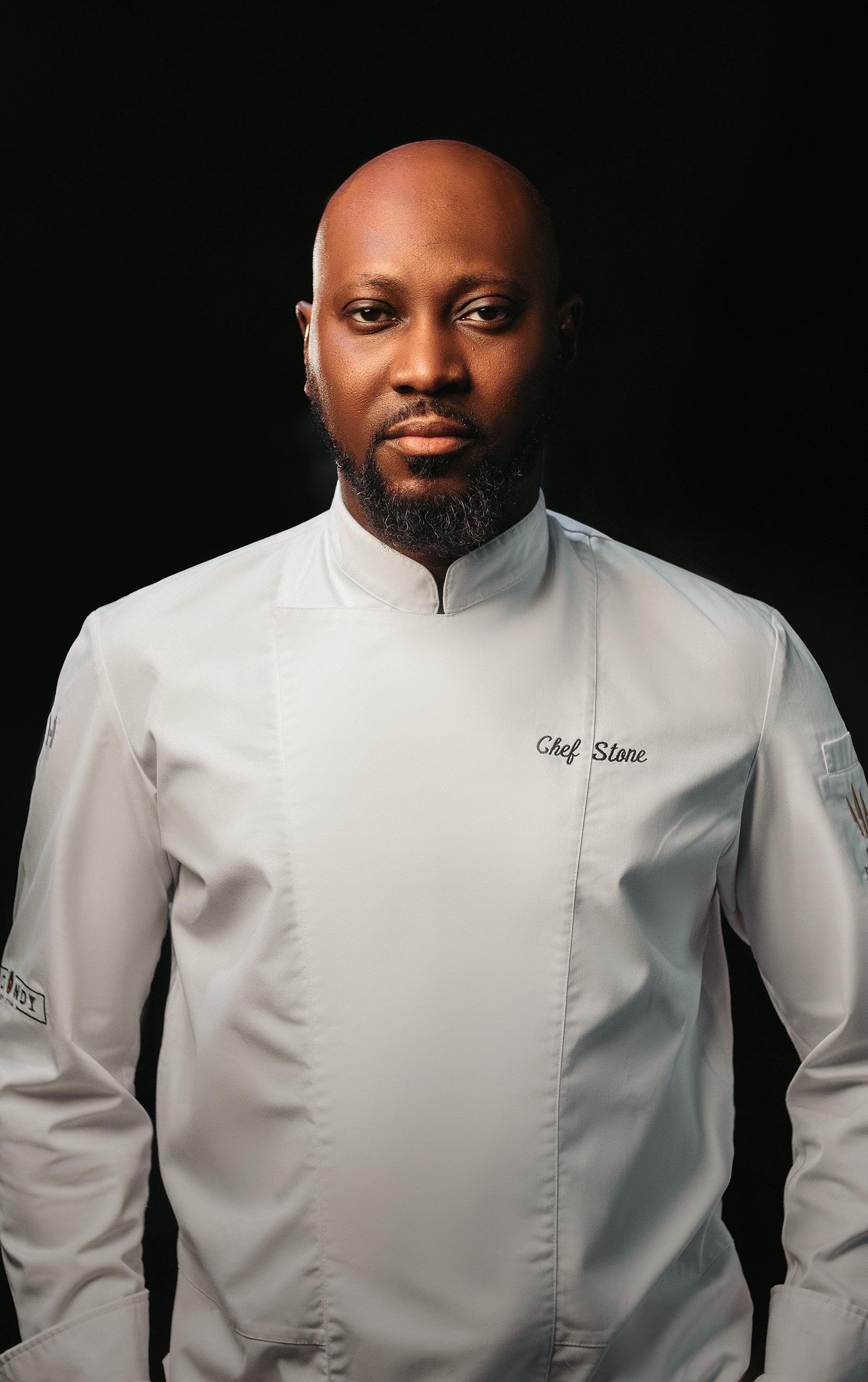
Let’s start from the roots: As a chef, educator, and entrepreneur, how would you describe the evolution of the Nigerian palate over the last decade, and what role do you believe Red Dish Chronicles has played in shaping that transformation?
The Nigerian palate has grown bolder and more curious. A decade ago, dining out was often limited to the familiar. Today, there’s a hunger for experience. People want to taste their culture reimagined, and they’re open to trying unfamiliar techniques fused with deeply rooted flavors. Red Dish Chronicles has helped nurture this shift by equipping a new generation of chefs with both classic skills and creative freedom. We’ve created a movement that celebrates Nigerian food in both its authenticity and its evolution.
In an industry often obsessed with global validation, how do you personally balance international culinary techniques with the celebration and reinvention of traditional Nigerian dishes?
For me, global techniques are tools, not templates. I’ve trained internationally and deeply respect those foundations, but I’m always guided by the question: “How do I tell our story on the plate?” I might use a French technique, but it’s to elevate ingredients like Yaji, Ogbono, or Scent leaf, not to overshadow them. Reinventing our dishes isn’t about replacing heritage, but about giving it a stage where it shines in new light.
What do you think is still missing in Nigeria’s food ecosystem, and what foundational shifts are needed to build a thriving, scalable food economy?
We need more structure from farm to table. Our food ecosystem lacks cold-chain infrastructure, processing facilities, and consistent regulatory support. We also need more investment in food education not just for chefs, but for farmers, suppliers, and even consumers. For the food economy to thrive, the entire value chain must be

empowered to collaborate, innovate, and scale sustainably.
What does it mean to be a culinary world traveler in 2025?
It means curiosity is your compass. Traveling as a chef today is no longer about just collecting techniques, it’s about cultural exchange. Everywhere I go, I ask: “What can we learn from this food culture, and what can they learn from us?” Being a culinary traveler in 2025 is about building bridges with food between continents, between communities, and between histories.
Tell us about The Burgundy. What’s your vision for it, and what are some of the influences to creating The Burgundy experience?
The Burgundy is a love letter to Africa. It’s my way of showing that African food can sit at the same table as any fine dining tradition in the world. The experience is curated, from the music to the plating, to reflect both elegance and heritage. Influences come from my travels, from conversations with grandmothers, from street markets, and from the stories of our people. Burgundy is where culture meets craftsmanship.
Do you see your work as part of a larger cultural or even political project to put Nigerian food on the global map?
Absolutely. Food is culture, and culture is power. By reclaiming our food narratives, we challenge stereotypes and redefine how the world sees Africa. My work is about more than cooking, it’s about agency. It’s about saying, “This is who we are, and we’re proud of it.” Every dish I serve, every student I train, is a contribution to that cultural diplomacy.
With Red Dish Chronicles being one of the most influential culinary schools in West Africa, what’s the long-term vision? Are there plans to expand your culinary education model across the continent or globally?
The dream is continental and global. We’ve already impacted thousands of lives, but we’re just getting started. I want to see Red Dish campuses in cities across Africa, and one day, even in culinary hubs like Paris, New York, or Tokyo, where African cuisine is taught not as “exotic” but as essential. We’re also building digital platforms to reach aspiring chefs anywhere in the world. Because African food belongs on every table.
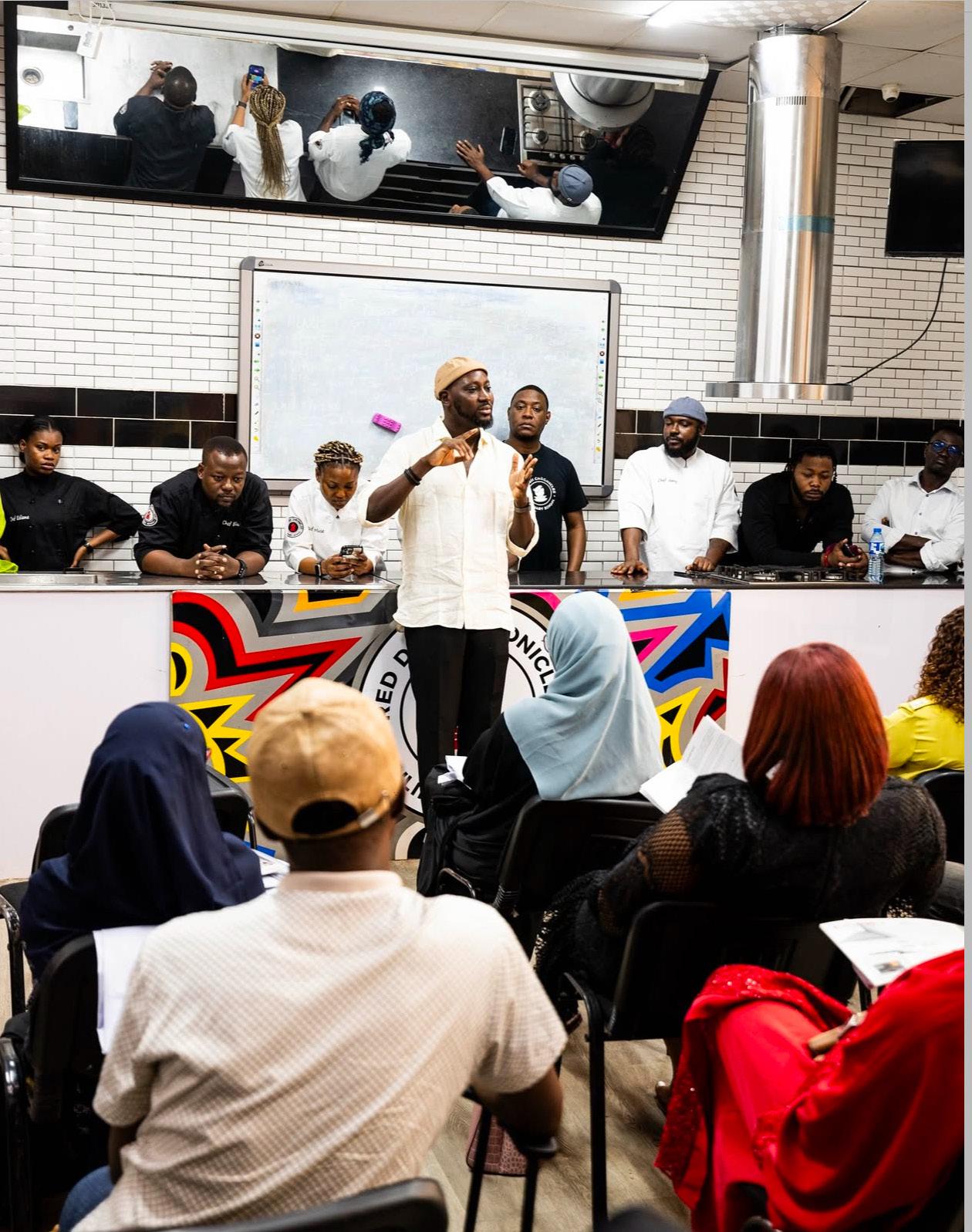
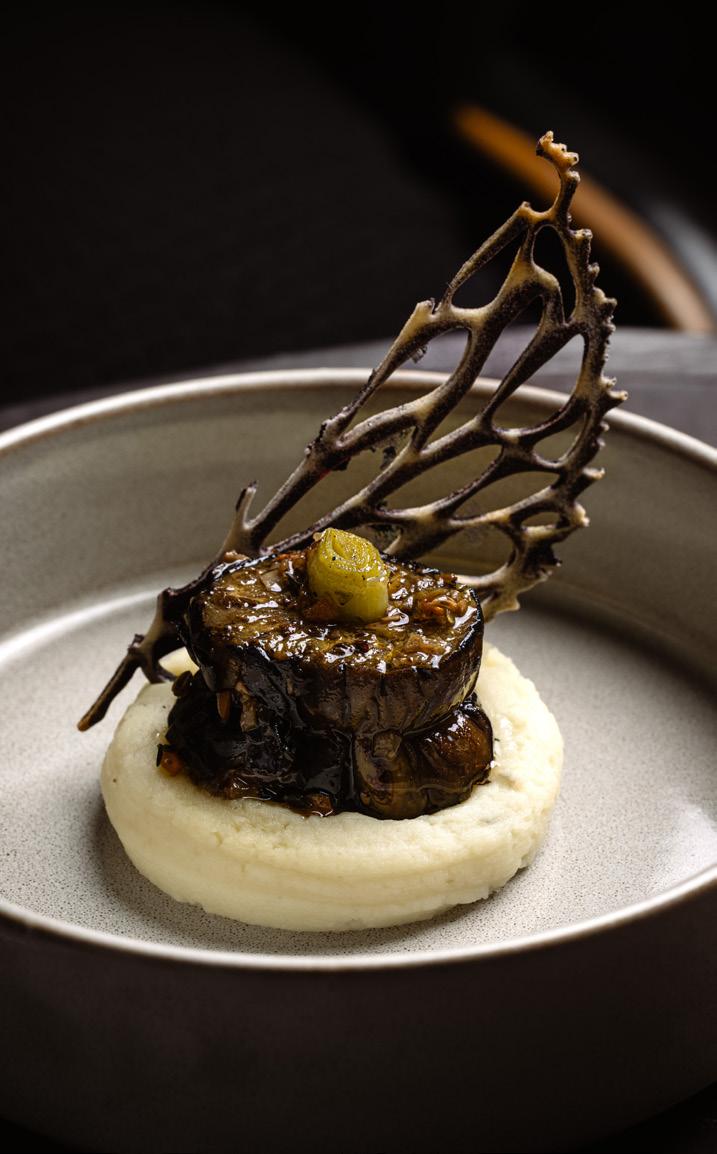
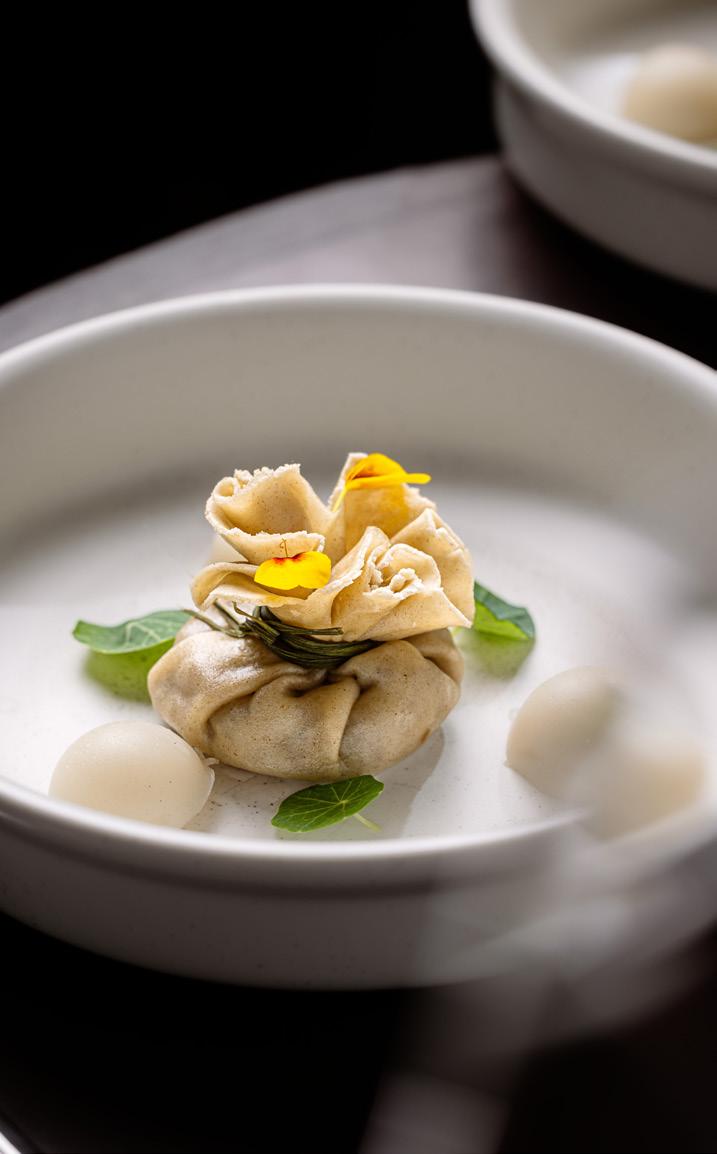





Get ready for 10 delicious days of burger bliss as Burger Week returns—proudly presented by Awari refreshed by Pepsi, Maltina & Tiger Beer and our Bank Partner; Providus Bank!
From Lagos to Abuja, 65 restaurants are serving up the ultimate treat: an exclusive Buy One Get One Free offer on their mouthwatering burgers. Whether you’re a fan of long-time favorites or ready to discover the city’s hottest new spots, we’ve curated a lineup that celebrates the very best of the evergrowing restaurant scene.
Date: 16th to 26th June, 2025.
Location: Participating restaurants across Lagos & Abuja
Be sure to share your Burger Week experience and tag us: @lostinlagos12 @providusbankig @pepsi_naija @maltina @tigerbeerng
Let the burger adventure begin! #BurgerWeek2025 #BW2025 #providusbank For more information, download the Awari App.
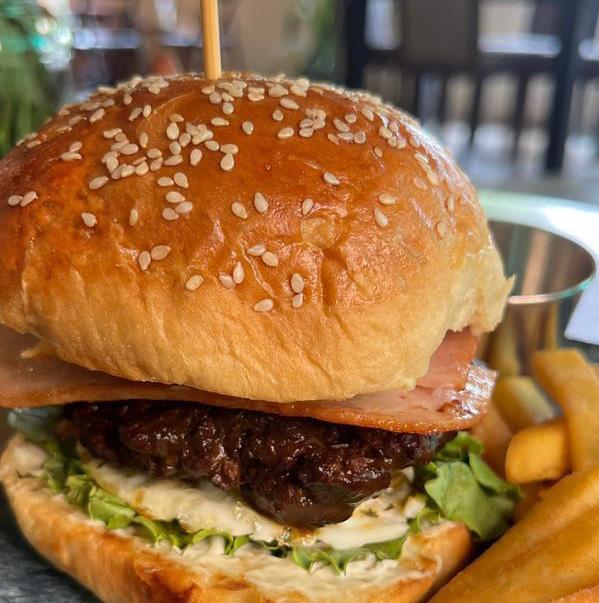
STROBRIE CAFE

A cosy charming café bakery where the aroma of freshly baked goods mingles with the rich scent of specialty coffee.
HFIA Garden, Off Tafawa Balewa Way, Garki, Abuja
t: 08090701995
e: strobrie@gmail.com
IG: @Strobrie
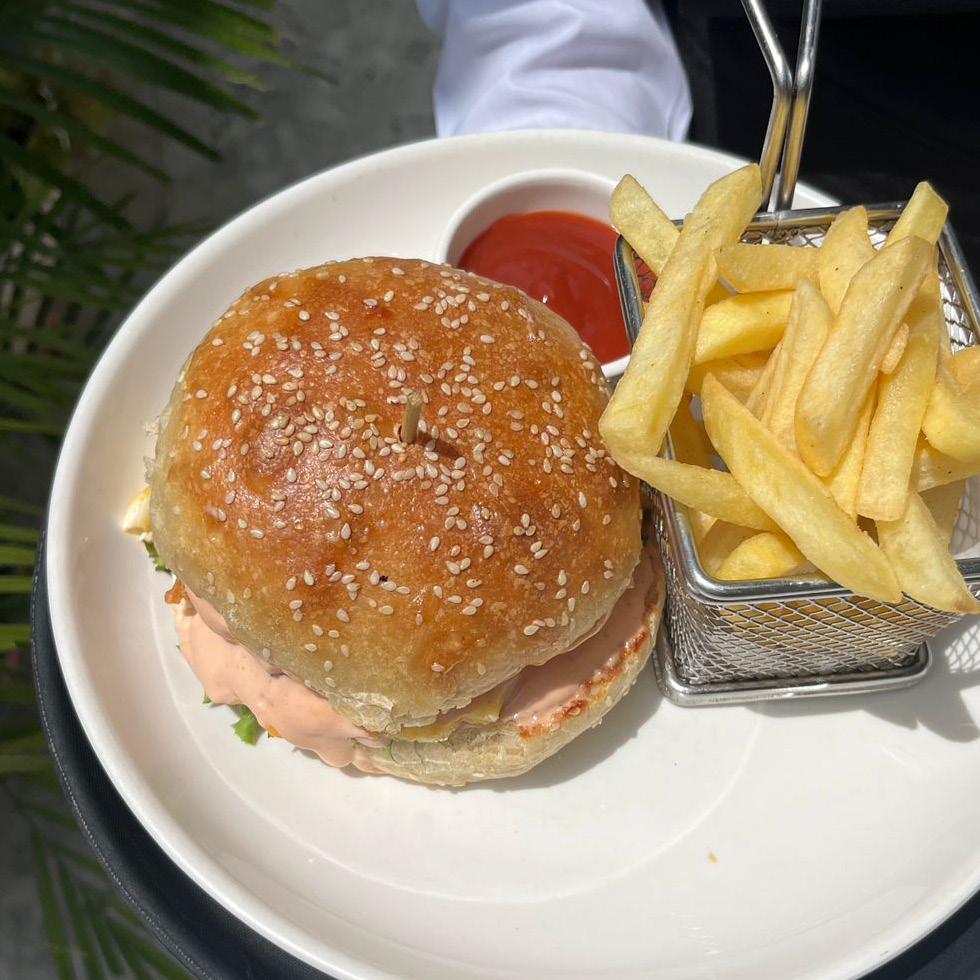

SANTORINI RESTAURANT
Santorini is a Greek themed restaurant where tradition meets taste. We serve authentic Mediterranean dishes crafted with fresh ingredients, bold flavours, and a touch of hospitality.
5 Kwaji Close, Maitama, Abuja
t: +234 706 709 1391
e: santoriniabuja@gmail.com
IG: @Santorini_abuja

BURGER KING NIGERIA

The very first BURGER KING restaurant in Nigeria opened its doors in November 2021, a joint venture between Allied Food and Confectionary Limited and BURGER KING Worldwide. BURGER KING Nigeria will continue to expand as we plan to open more than 55 Stores in 5 Years. BURGER KING Nigeria plans to keep contributing to the Nigeria economy and creating a significant number of jobs for Nigerians over the years.
24 Durban Street, Wuse 2, Abuja
55, Pa Michael Imoudu Ave, Gwarinpa, Abuja
Gateway Novare Mall, Umaru Musa Yar’Adua Road, Airport Rd, Lugbe
Bala Sokoto Way, Jabi, Abuja
t: 08100052022
IG: @burgerkingnga

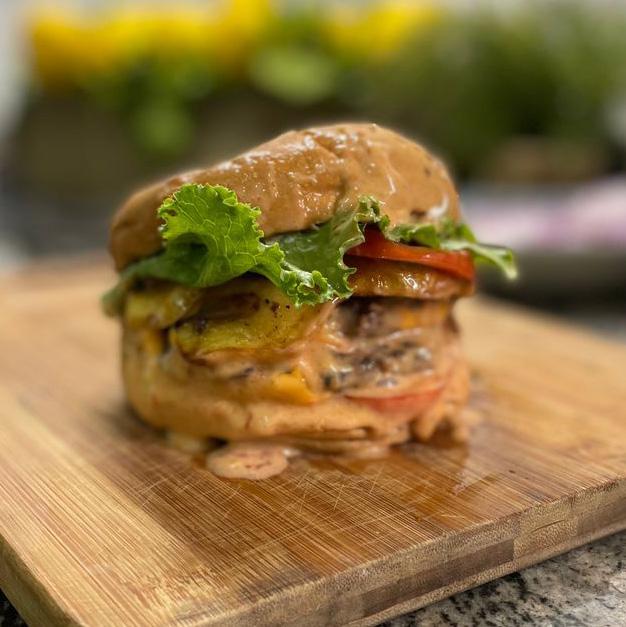
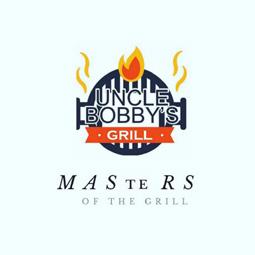
A grill place with the best of everything you don’t want to miss.
4, Geidam close, Area 8 Garki, Abuja
t: 08069774646
e: abrakson@gmail.com
IG: @Unclebobbysgrill
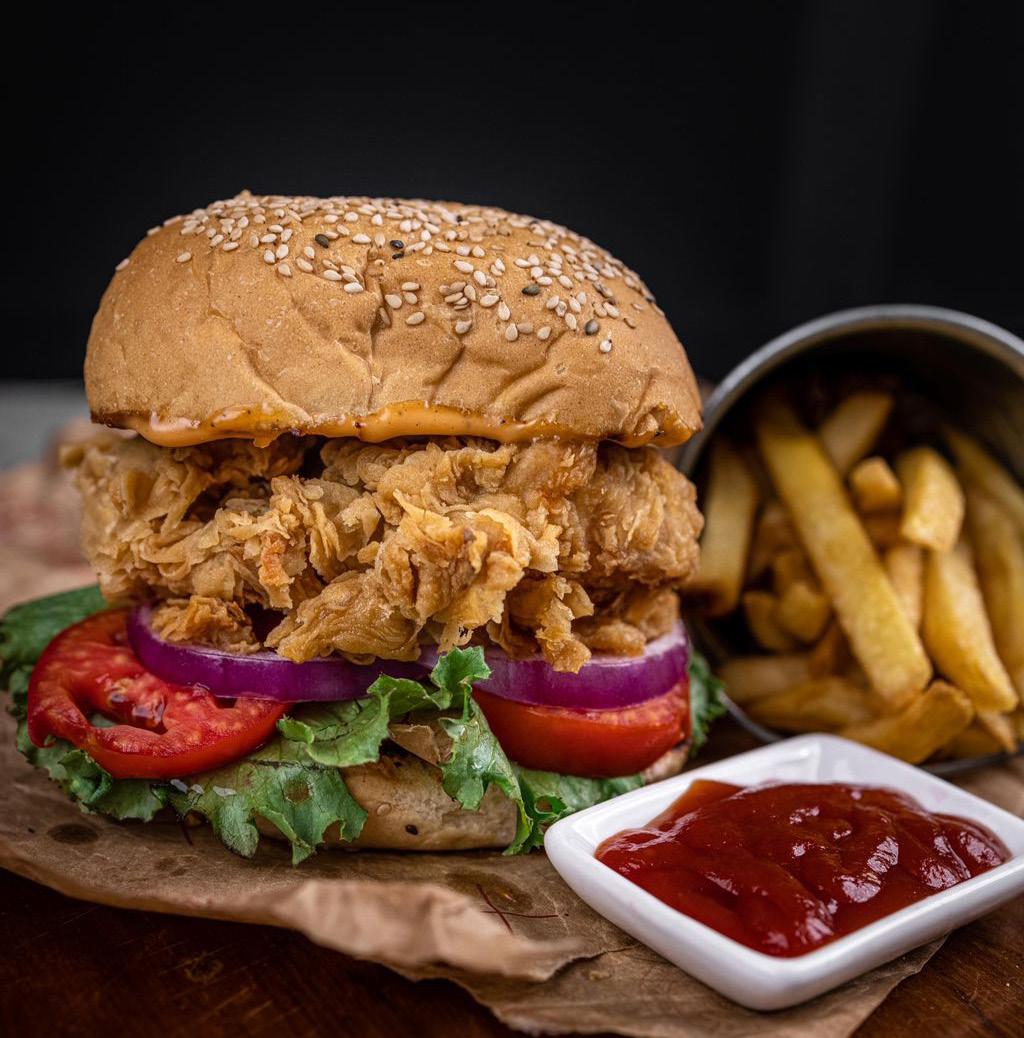
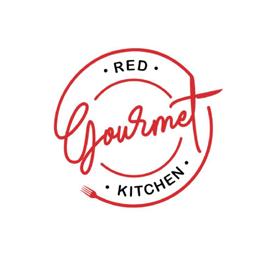
Craving a burger experience that’s rare and well-done? Look no further than Red Gourmet Kitchen, Abuja’s sizzling sensation on wheels! Nestled at Truck Central, this culinary powerhouse is flipping the script on fast food with gourmet flair and a dash of humor.
Plot 990 off Sterling Bank Boulevard, behind Fraser Suites, Central Area, Abuja
t: 08133108631
e: truckcentralng@gmail.com
IG: @redgourmetkitchen
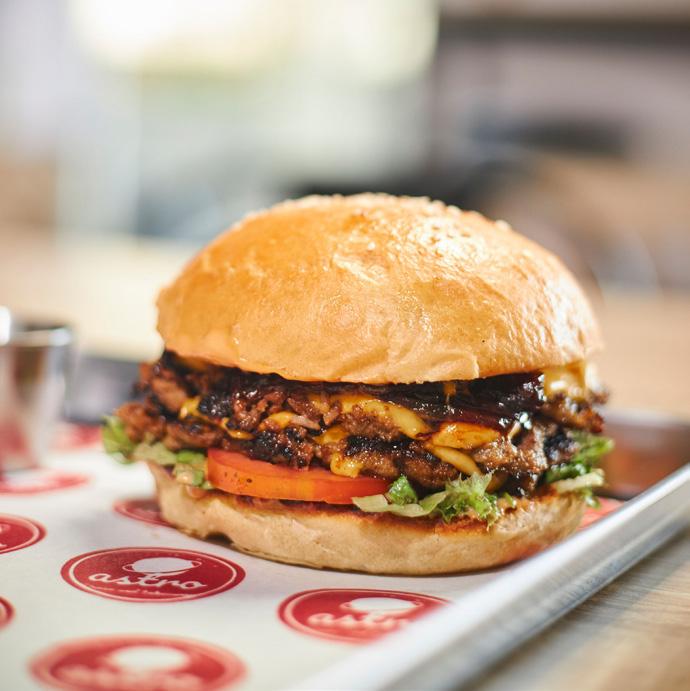
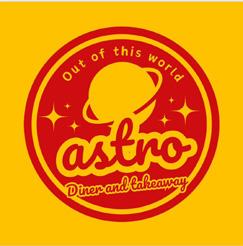
We are a 24 hour space themed diner. We aim to connect you with the past and future through our African continental menu.
9, Sani Zangon - Daura St, Guzape, Abuja
t: +2349135688888
e: hi@astrodinerng.com
IG: @astrodinerandtakeaway
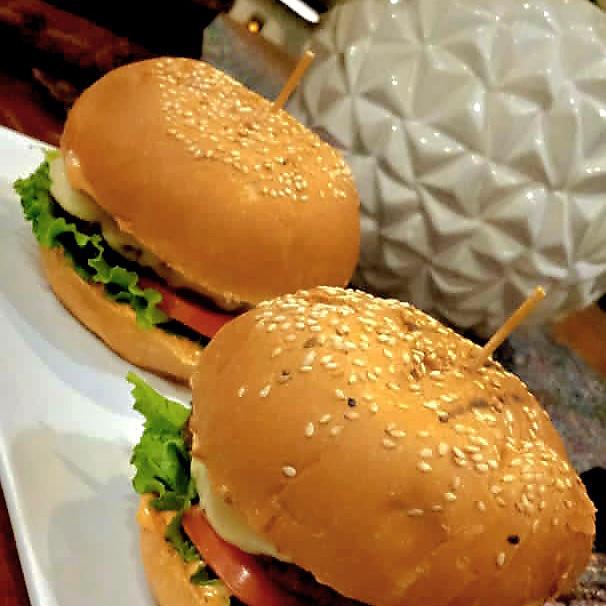

Café De Vie is an artistic space with a cozy setting, decor and art works, showcasing a beautiful ambience for relaxation, work, study and so on.
12, Amazon Street, Maitama t: 08166666696/08081125888
e: thecafedevie@gmail.com
IG: @cafe_de_vie

M
eet Chef Taylor Tamod, culinary storyteller, experience architect, and creative director of The Colony by Chef Taylor Privé. Chef Taylor curates immersive dining events that are equal parts theatre, culture, and conversation. Over the past eight years, he has hosted unforgettable soirées in Lagos and Abuja, from Havana Nights to A Naija Christmas, Diamonds Are Forever: The Secret Soirée, and Coming Soon: Garden of Versailles and Midnight in Marrakech. Chef Taylor doesn’t just feed people; he gives them something to talk about long after the plates are cleared.
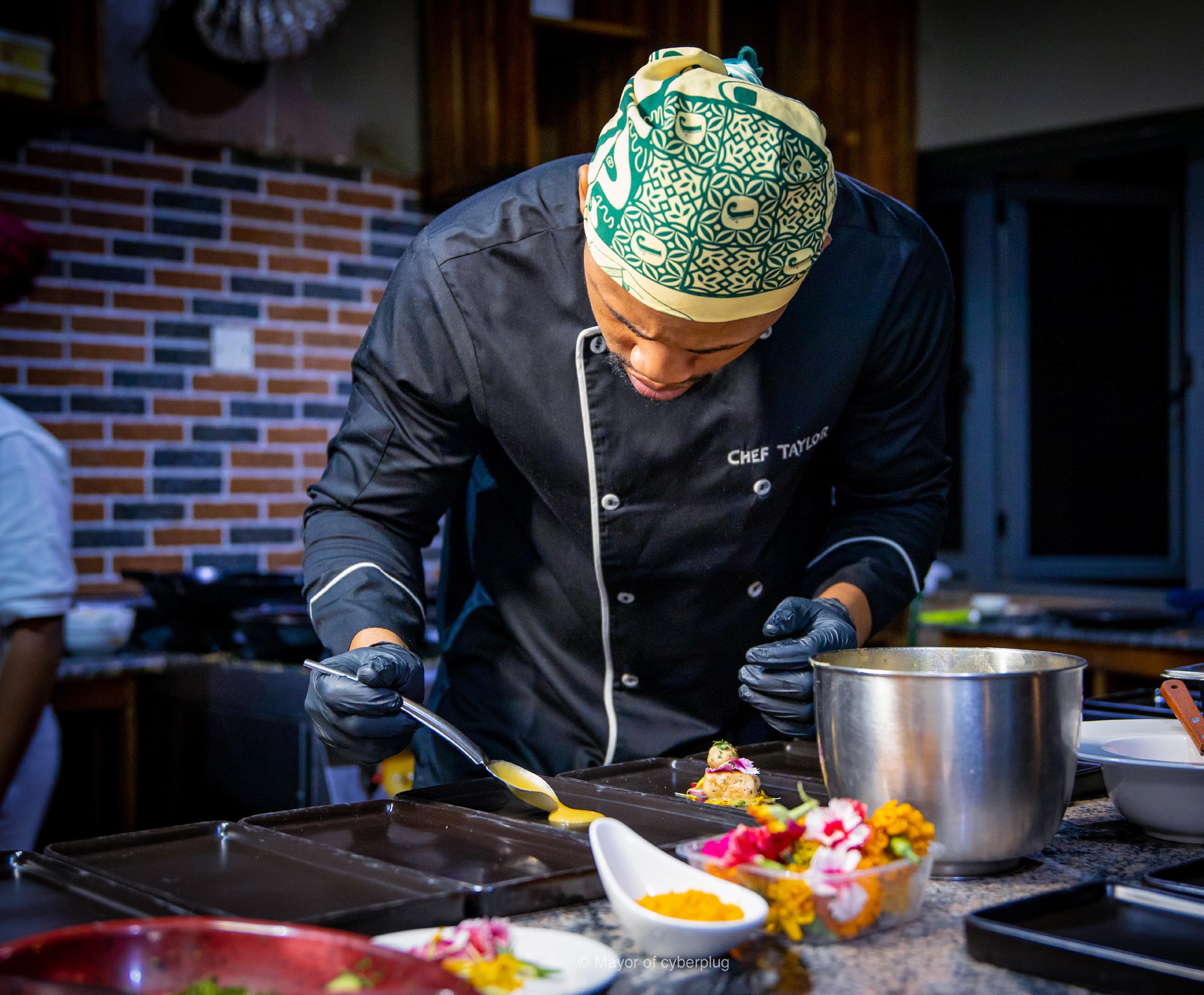
LIL+: The Lost in Lagos Magazine is spending 12 hours with you while you feed Lagos. Your day starts at 10 am and ends at 10 pm. Here is your itinerary:
10:00 AM – Rise, Sweat, Refuel
LIL+: It’s a gym day. You’ve just wrapped a solid upper body workout. Time to refuel. What does your gym high-protein diet look like?
CT: I’m not a morning gym person. I prefer evening workouts when I can truly disconnect and release. Mornings are sacred for clarity. I start slow with plantain pancakes or a bowl of creamy Greek yogurt layered with fresh mango, chili granola, and a drizzle of honey. My go-to morning drink? A tall glass of spiced hibiscus and lime tea. Calm energy. Soft power.
11:30 AM – Quick Grocery Dash Before the Hustle Begins
LIL+: You swing by your favourite store to
grab ingredients for a salad you’re making later for your gym crew. What salad are you making and what ingredients are going in the basket? Also… what’s that one unexpected item you always end up buying?
CT: I’m prepping a post-gym salad for myself and a couple of friends later tonight. Inspired by our Havana Nights dinner, it’s a smoky grilled chicken and roasted plantain salad with spicy palm oil vinaigrette. In the basket: baby spinach, chicken thighs, roasted ripe plantain, pickled onions, cherry tomatoes, lime, atarodo, cold-pressed palm oil. Unexpected item I always pick up? Definitely dark chocolate or mango-flavored Greek yogurt. I call it quiet indulgence— simple, sweet, and very necessary.
1:00 PM – Client Meeting Over Lunch
LIL+: You’re meeting new clients who want you to curate a high-end food event in Abuja. You take them to a restaurant that matches your vibe. Where are you taking them, and
what dish(es) are you ordering for the table to scintillate the conversations even more?
CT: I’m meeting new clients looking to create a high-end fashion-forward food event in Abuja. I take them to Taj Bistro — refined, relaxed, and subtly luxurious.
We order for the table: duck spring rolls with tamarind glaze, grilled calamari with suya butter, braised lamb shoulder with Nsukka pepper mash. As we eat, I’m already envisioning an experience; maybe a crossover between Bow Street Soirée and The Colony—hidden catwalks, paired tasting menus, and a soundtrack that evolves with each course.
3:00 PM – Palate Cleanser + Midday Mood
LIL+: You have a quick breather. Time to take a nap. Music’s on. You’re sipping something refreshing. What’s your go-to midday drink? And what playlist is on while you dream about your next pop-up?

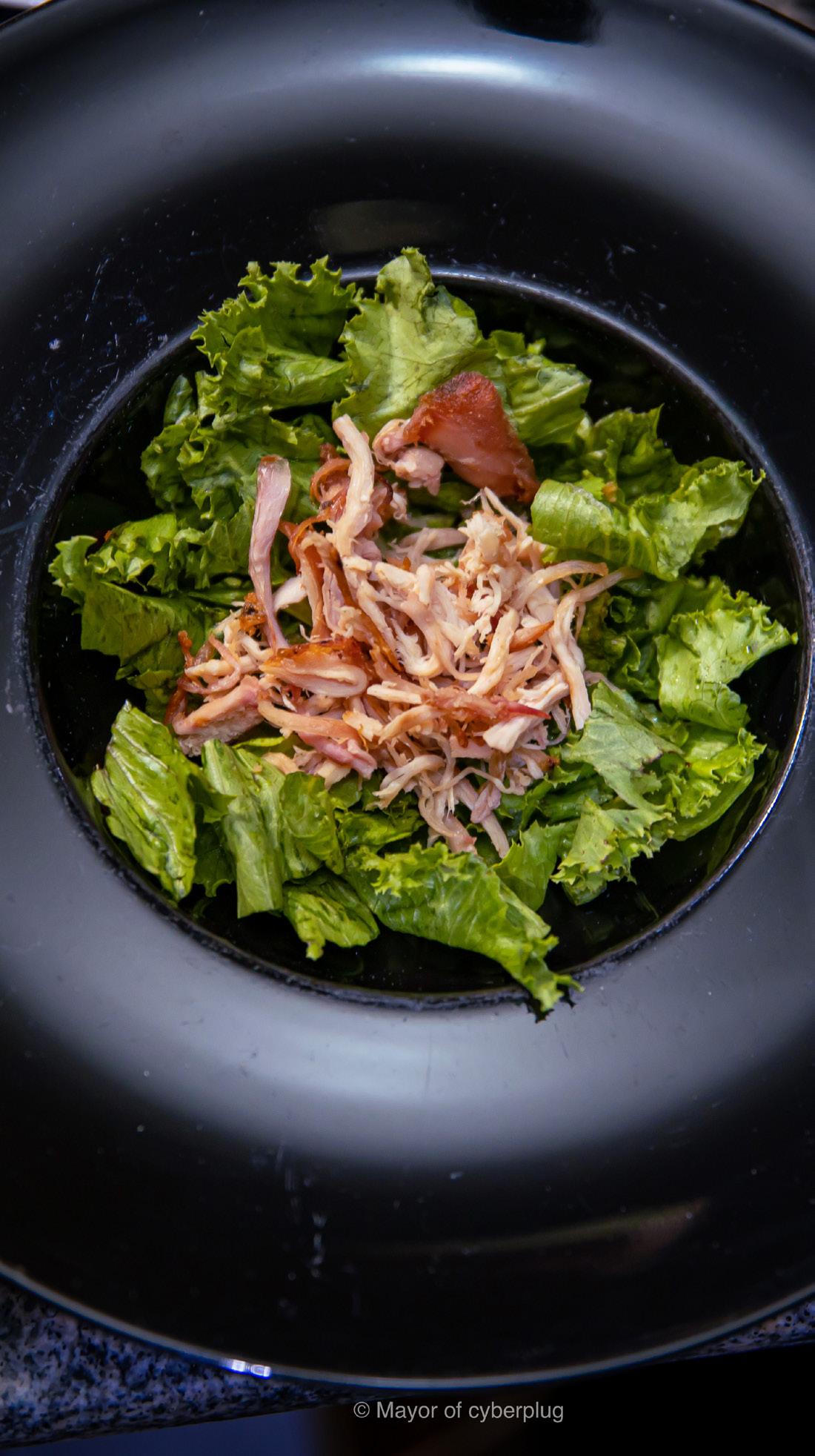
CT: A quick breather before the evening spiral begins. Drink in hand: cucumber-lime spritzer with coconut water, bitters, and mint. Playlist: Silk x Spice — think Sade, Tems, Tay Iwar, with a few curveballs from Kaytranada and Amaarae. A soft sonic breeze that sparks ideas for my next nomadic dinner.
6:30 PM – Dinner Pre-Game:
LIL+: *Ring Ring* It’s your phone. You’ve been up for a while. Time to head out to a clubstyle dining event where you were exclusively asked to design the full menu experience. Before you go, you make a toast to yourself. What are you toasting with, and what are you wearing?
CT: Now it’s time to sweat. Evening gym is my non-negotiable; it grounds me. I knock out an upper body and core session, then head home to reset. Before heading out, I raise a quiet toast to the day’s wins: a neat pour of Jameson Black Barrel with a slice of orange.
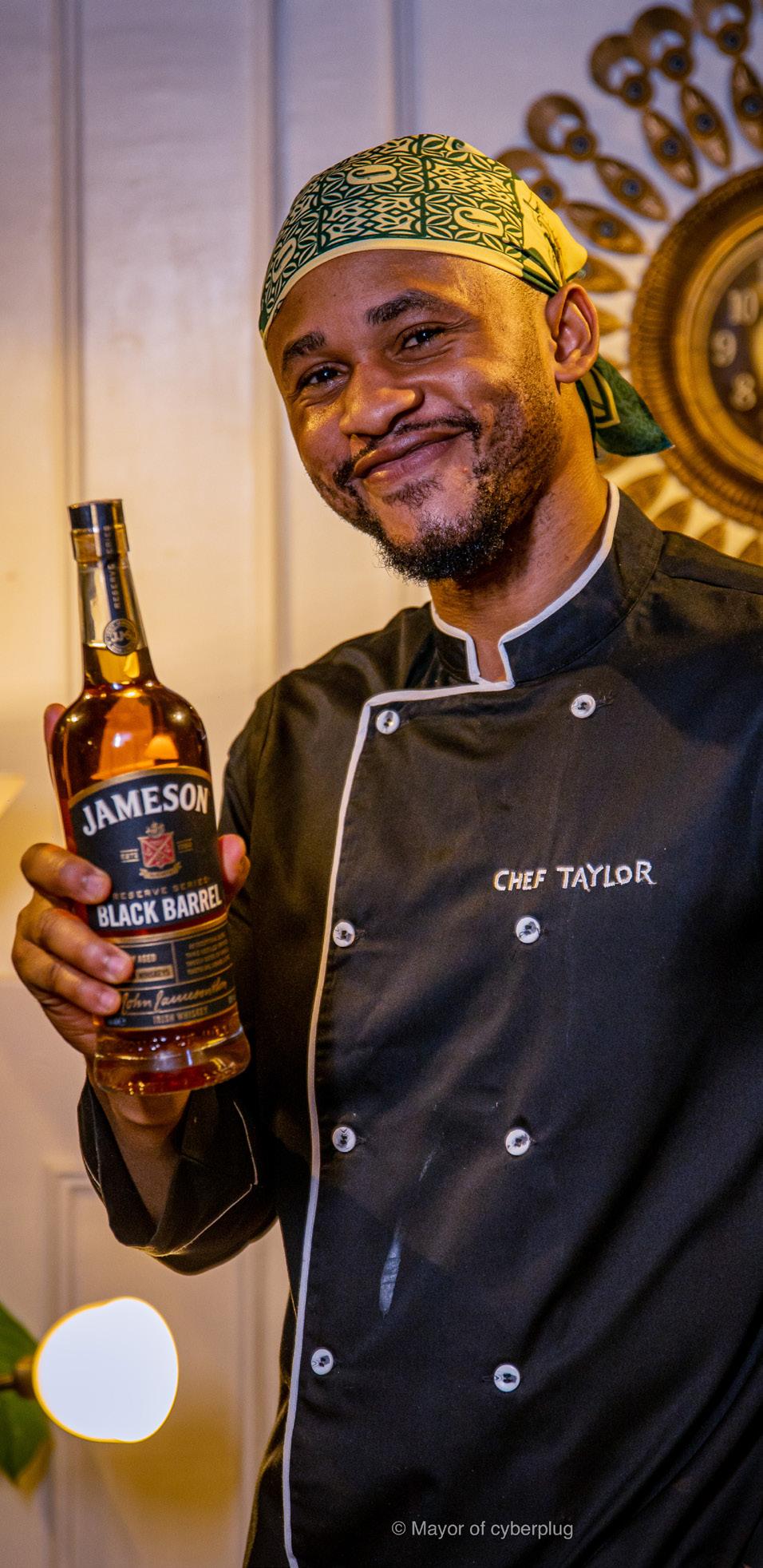
What I’m wearing: a silk kaftan-style twopiece in burnt copper and black. Scent: oud, citrus, and spice—rich, refined, unforgettable.
7:30 PM – Club-Like Dinner Takeover
LIL+: The lights are low, but the room and the plates are vibrational. You’re behind the scenes plating dishes with drama and delight. 3 courses, with 3 wine/cocktail options. All perfect for the night, and after night. What is on the menu?
We’re at Lorien Restaurant, Abuja; velvet lighting, velvet voices, and an energy that crackles from the kitchen to the table. This is my territory, designing culinary theatre for the night.
3-Course Menu from “Diamonds Are Forever: The Secret Soirée”
Starter: Rum-glazed plantain gnocchi with smoked mackerel and palm oil emulsion,
Main: Rabbit Pepper Soup Risotto with charred carrots and basil oil, paired with Dark Rum Sour.
Dessert: Belsuk—banana bread, rum-zobo syrup, Greek yogurt whip, paired with Ginger Espresso Martini. Every plate tells a story. Every pairing deepens it. And the guests? They’re in the mood, fully present, fully fed.
10:00 PM – It’s A Wrap
LIL+: The night winds down. Your playlist is humming in the background. What’s the last song playing in your head as you drive home?
CT: Driving home with the windows cracked. Abuja’s night breeze carries echoes of laughter, clinking glasses, and satisfied sighs. Final song on repeat in my head? “Higher” by Tems: soft, steady, and soulful. A perfect note to end the day and begin again.

By Sirfi Mix
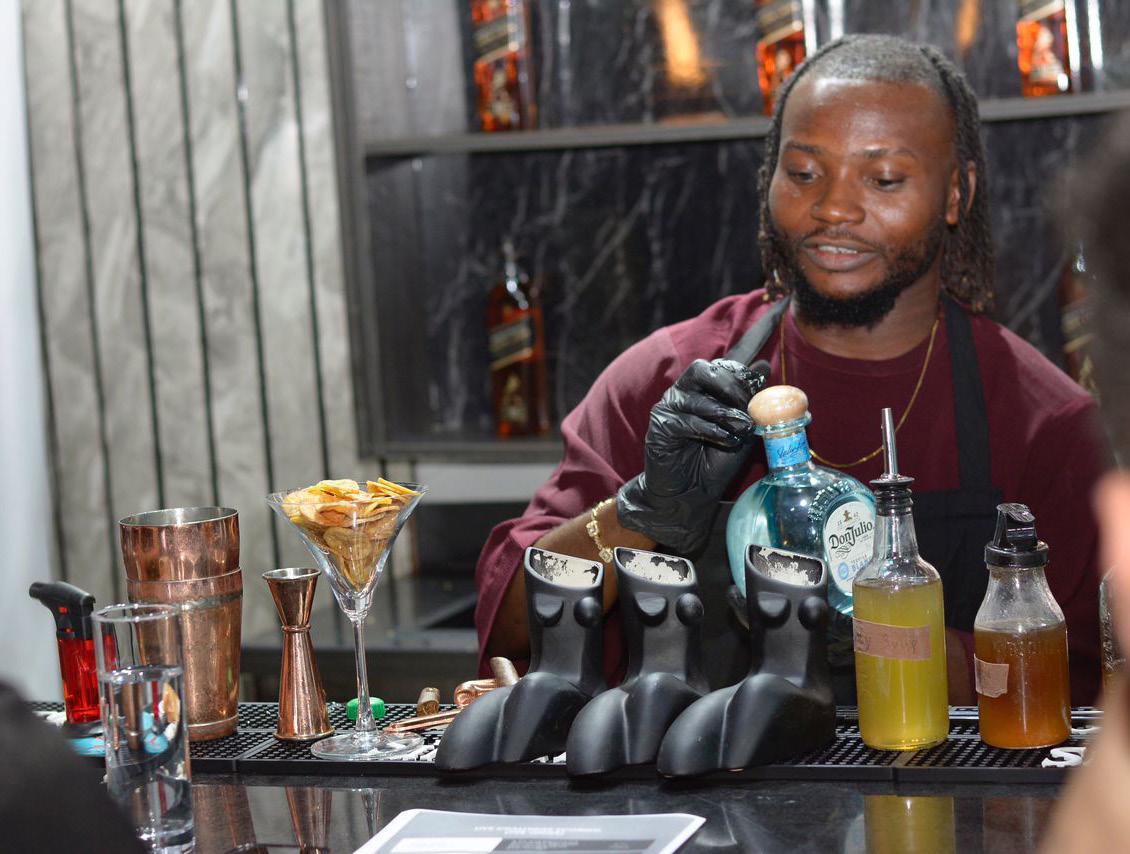
Bio
Sirfi_mix is a mixology company that provides cocktail and mocktail services for events and offers mixology training. They are known for their high-quality service, use of fresh ingredients, and focus on sustainability, particularly their approach to using citrus peels and sourcing from local farmers. They also offer mixology academy programs with experienced teachers and a curriculum for both beginners and those looking to expand their knowledge. They are based in Abuja, Nigeria.
Locust beans, foraged from the wild, transformed into a rich syrup that brings depth to our drink. Paired with the bold, velvety notes of Johnny Walker Black Label, sweetness of vanilla, and a splash of sour mix adds balance, creating a harmonious blend. Every sip is a connection to the earthy, organic flavors that inspired it.
Ingredients
Johnny Walker Black Label Parkia biglobosa syrup (rich locust bean)
Vanilla syrup Sour mix
For the Syrup Instructions
In a pot add in your locust beans, water, sugar and apple. Set on low heat and stir until it’s dissolved filter it very well and keep In a cool place
For The Cocktail Instructions
50ml whiskey (black label)
50ml of our home made Parkia biglobosa syrup
40ml of vanilla syrup
30ml of sour mix
Shake all ingredients together with ice
Serve in a whiskey glass with a fresh ice and garnish with fresh locust beans








